|
| La Serbie accorde des bourses d’étude à la RDC |
|

Kinshasa25-11-2022Politique - Les bourses d’étude accordées par la République de la Serbie à la RDC ont été au menu de la rencontre que l’ambassadeur Miroljub Jevtic a eu dernièrement avec le nouveau secrétaire général du ministère des Affaires étrangères, Daniel Makiesse Mwana Wanzambi.
Ces bourses, une vingtaine, s’inscrivent dans le cadre du « The world in Serbia program », a-t-on renseigné. Outre, l’octroi de ces bourses, les deux personnalités ont échangé sur la participation commune de leur pays respectif aux organisations internationales et du soutien mutuel. L’un des sujets était la francophonie et la place de la Serbie dans cette organisation.
La Serbie amie de l’Afrique
Au cours d’un entretien à bâtons rompus que Digitalcongo.net a eu jeudi avec l’ambassadeur de la Serbie en RDC, Miroljub Jevtic en sa résidence de la Gombe, ce dernier a fait savoir que « la Serbie est l’amie de l’Afrique et c’est connu de partout ». Depuis la colonisation, la Serbie (ex-Yougoslavie) a fait de son mieux pour l’accession des pays africains à la souveraineté nationale et internationale.
Au sujet de la situation d’insécurité qui prévaut à l’Est de la RDC, le diplomate serbe a fait savoir que le gouvernement de son pays est préoccupé par cette crise qui constitue une menace pour la RDC. C’est ainsi qu’il salue l’accord trouvé au mini-sommet de Luanda mercredi 23 novembre.
« Pour la Serbie, c’est très important qu’un accord d’une telle ampleur soit conclue ». Il a également salué les efforts des pays africains comme l’Angola, le Kenya, le Burundi qui déploient des efforts pour une sortie pacifique de la crise.
Au chapitre des relations entre la Serbie et la RDC, Miroljub Jevtic a affirmé qu’elles sont excellentes. « La Serbie est aux côtés de la RDC depuis la lutte pour l’indépendance. Une université et une avenue portent le nom de Patrice Emery Lumumba en Serbie », a fait savoir l’ambassadeur ajoutant que le Président Félix Tshisekedi lors de son premier déplacement a été reçu comme un roi.
L’amitié sincère et profonde que la Serbie a à l’endroit de la RDC transparaît par le fait qu’il y a des Serbes qui portent des noms congolais. « Dans ma propre famille, un de mes oncles a donné à ses fils, à l’un le nom de Tshombe et à l’autre celui de Kasa-Vubu sans les avoir rencontrés », a révélé le diplomate serbe.
Théodore Ngangu
(TN/Yes) |
|
|
| Statement by Minister of Foreign Affairs of the Republic of Serbia Nikola Selaković at the meeting of the UN Security Council on the report on the work of UNMIK |
|
18. Oct 2022.
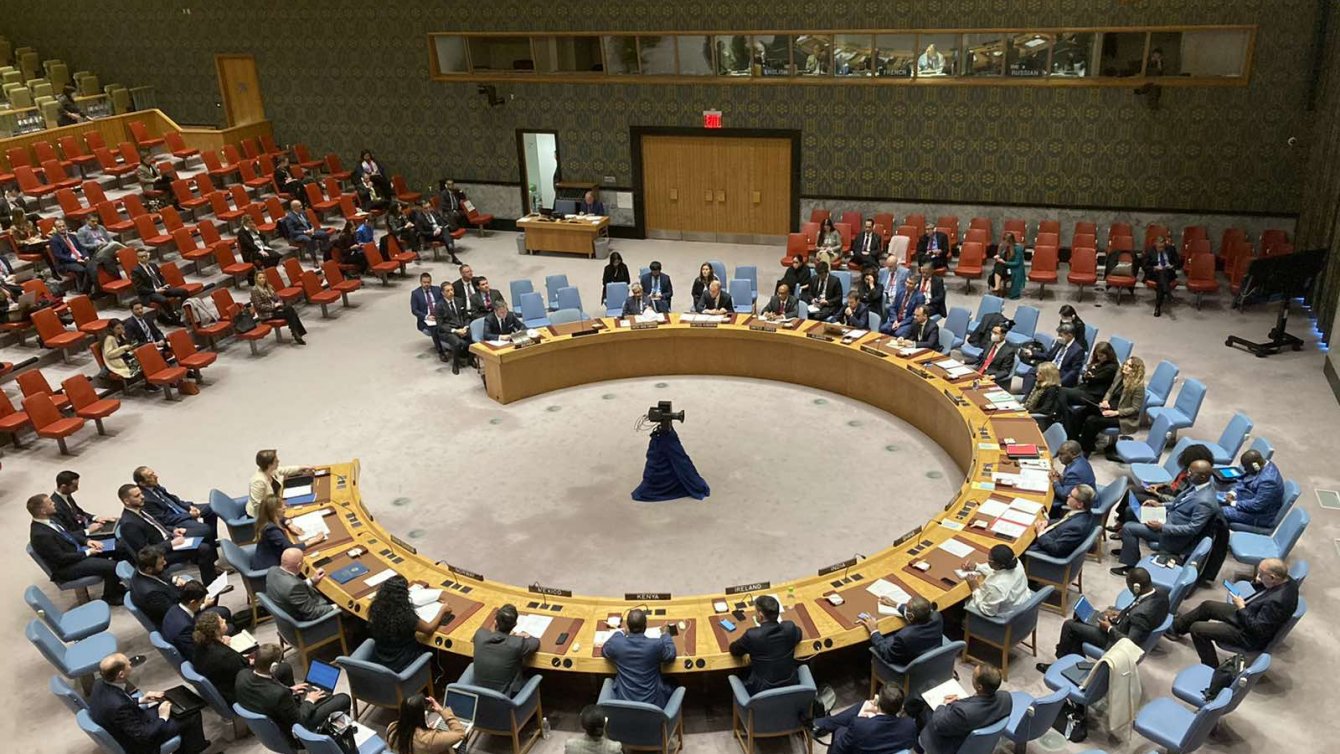
Mr. President,
Madam Special Representative,
Ladies and gentleman,
It gives me honor to address this distinguished body once again and to discuss the latest report of the Secretary-General on the work of the UNMIK.
I would like to thank the Secretary-General and the Special Representative for submitting the report. We take note of the efforts that Ms. Ziadeh makes in performing this very responsible duty, especially bearing in mind the necessity of a comprehensive overview and the complexity of the situation on the ground. |
|
|
| Deepening friendly relations between Serbia, DR Congo |
|
Belgrade, 14 October 2022.
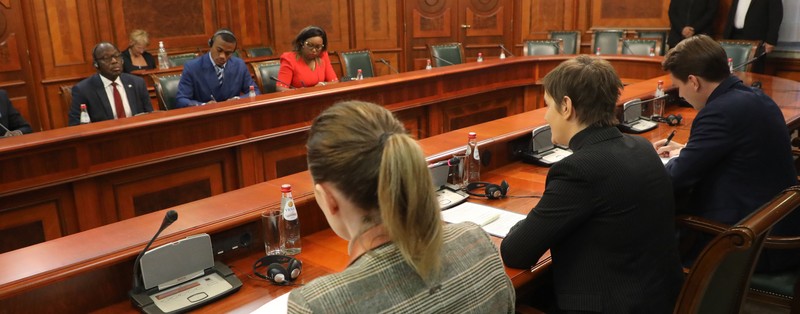
Prime Minister Ana Brnabic spoke today with Vice Prime Minister and Minister of Foreign Affairs of the Democratic Republic of the Congo Christophe Lutundula Apala, about deepening friendly relations between the two countries and ways of expanding cooperation, especially in the field of economy and education.
At a meeting in the Serbian government, Brnabic said that the visit of the Vice Prime Minister of the government of the friendly country of DR Congo represents a continuation of the political dialogue, which, as she estimated, will be intensified in the coming period.
According to her, in the new mandate, the Serbian government will continue to grant scholarships to students from that country, as part of the "Scholarships - World in Serbia" programme because this is the best way to invest in the future.
The Prime Minister also expressed gratitude for the principled stance and support for the territorial integrity and sovereignty of Serbia and added that Belgrade also supports the unity, sovereignty and territorial integrity of DR Congo and provides unreserved support to efforts to overcome existing security challenges in that country.
The Vice Prime Minister and Minister of Foreign Affairs of DR Congo conveyed the warm greetings of the leadership of his country and stated that there is a readiness to establish a new framework of comprehensive multi-sector cooperation.
Brnabic once again thanked her interlocutor for the visit and concluded that the development of close contacts between the two friendly countries in the future is extremely important, as a significant pillar of mutual support in times of major world crises.
|
|
|
| Selaković: Serbia is actively involved in combating terrorism, radicalism and extremism |
|
11. May 2022.
Today, in Marrakesh, Minister of Foreign Affairs of Serbia Nikola Selaković participated in the Ministerial Meeting of the Global Coalition to Defeat ISIS. Minister Selaković said that Serbia was committed to the multilateral aspect of the fight against terrorism, adding that he firmly believed the United Nations should be the key forum for international cooperation in this field.
Minister Selaković stated that Serbia was fulfilling all international obligations pertaining to the implementation of UN Security Council resolutions, especially those related to the introduction of arms embargoes, including bans aimed at non-state actors, terrorist organisations and related individuals. He emphasised that Serbia was a signatory to 15 international conventions against terrorism. “By participating in multinational UN and EU peacekeeping missions, Serbia is making a concrete contribution to preserving regional and global security,” Minister Selaković said, paying tribute to a member of the Serbian Army, Lieutenant Colonel Dejan Stanojević and his colleagues, who tragically lost their lives on March 29 in the United Nations Mission in the Democratic Republic of the Congo.
“Serbia does not diminish the importance of other international forums, which is why it joined the Global Coalition from the very beginning, and selflessly contributes to international efforts to fight ISIS, primarily through various forms of donations in military equipment, ammunition, and training in Iraqi security forces”, Minister Selaković said. He added that as a candidate country for membership in the European Union, Serbia gave its full contribution through active participation in European policies on the fight against terrorism, and had developed a strategic cooperation with EUROPOL.
Minister Selaković noted that Serbian criminal legislation provided instruments to prevent and punish the encouragement, organisation, and participation of its citizens in wars or conflicts in foreign countries. He explained that the Serbian judicial authorities had completed proceedings against 7 persons engaged in foreign battlefields, and that several investigations against persons connected with terrorist activities were underway.
Minister Selaković said that the fight against terrorism, radicalism and extremism was a priority, and that Serbia was actively involved in combating these challenges and threats at the domestic, regional, and international level.
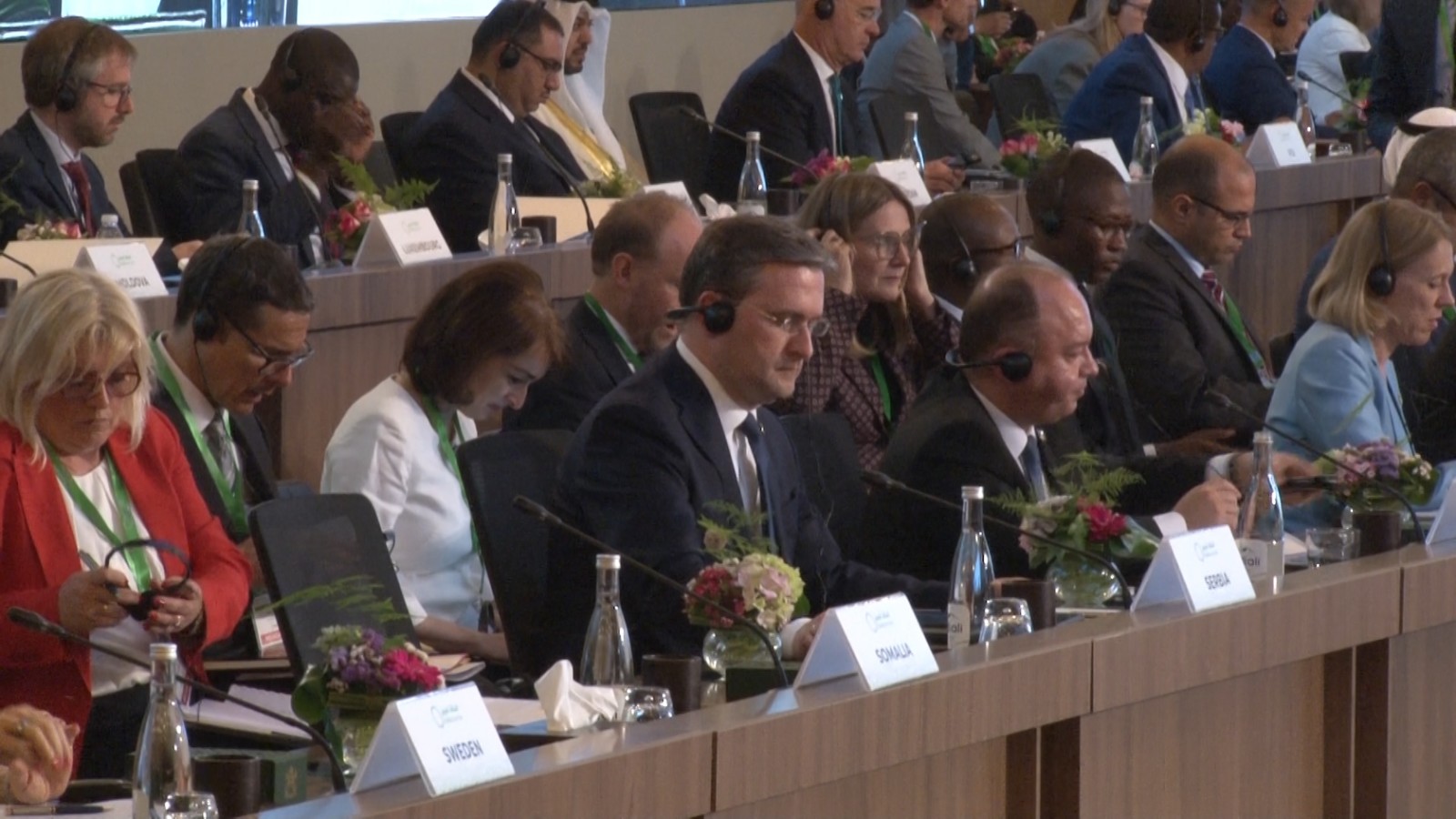 |
|
|
| Belgrade to get Centre for Fourth Industrial Revolution |
|
7 February 2022
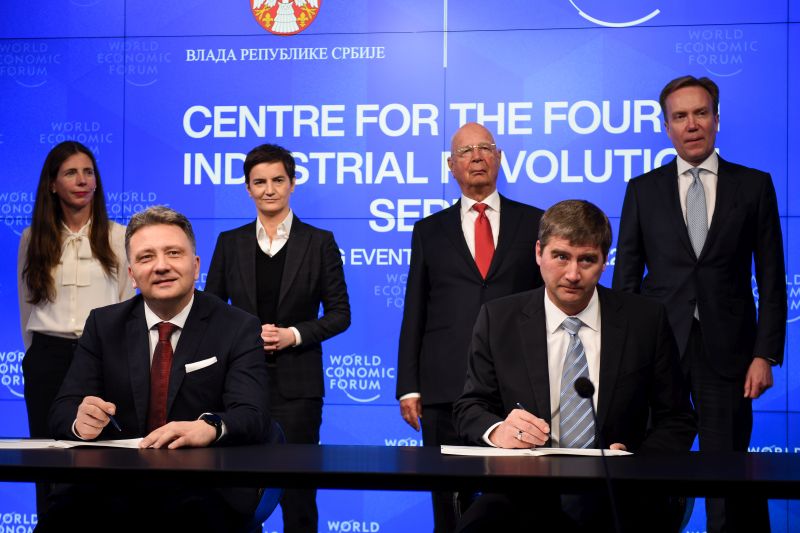
Prime Minister Ana Brnabic attended today in Geneva the signing of the Agreement on the Establishment of the World Economic Forum Centre for the Fourth Industrial Revolution in Serbia, the first of its kind in the Western Balkans.
The agreement was signed at the headquarters of that forum by Director of the Office for Information Technologies and eGovernment Mihailo Jovanovic and Managing Director and Head of the Forum's Centre for the Fourth Industrial Revolution Jeremy Jurgens.
The centre in Serbia will be the 16th in the network of centres of the World Economic Forum in the world and the first in the region of the Western Balkans. |
|
|
| Un rôle important de l'UNESCO pour la préservation du patrimoine serbe au Kosovo-Metohija |
|
Le 12 novembre 2021
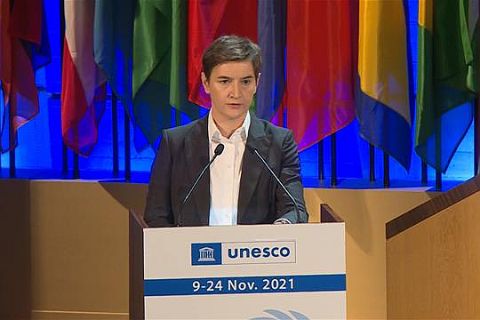
Un rôle important de l'UNESCO pour la préservation du patrimoine serbe au Kosovo-Metohija
La Première ministre de la République de Serbie Ana Brnabić a déclaré aujourd'hui que les exemples graves de mise en danger du patrimoine culturel, historique et spirituel serbe au Kosovo-Metohija sont la preuve de l'importance du rôle de l'UNESCO dans la protection et la préservation du patrimoine.
Lors de la 41e session de la Conférence générale de l'UNESCO à Paris, Brnabić a souligné que quatre joyaux du patrimoine culturel médiéval serbe au Kosovo-Metohija - Visoki Dečani, le Patriarcat de Peć, Gračanica et Vierge de Leviša, ont été préservés grâce au fait qu'ils sont inscrits sur la liste du patrimoine mondial en péril, mais que des centaines d'autres sites et monuments sont menacés.
Le patrimoine serbe au Kosovo-Metohija est d'une importance incommensurable non seulement pour l'identité nationale de la Serbie, mais aussi en tant que partie du patrimoine européen et mondial précieux, a-t-elle souligné.
La Première ministre a indiqué l'attachement de la Serbie aux principes fondamentaux de l'UNESCO - le dialogue et le consensus, fondés sur la Charte des Nations Unies et l'Acte constitutif de l'UNESCO, c'est pourquoi nous plaidons continuellement pour la dépolitisation de cette organisation.
Source/Photo: www.srbija.gov.rs
|
|
|
| Discours du Président de la République de Serbie à la COP26 de Glasgow - Conférence des Nations Unies sur les changements climatiques |
|
Le 2 novembre 2021
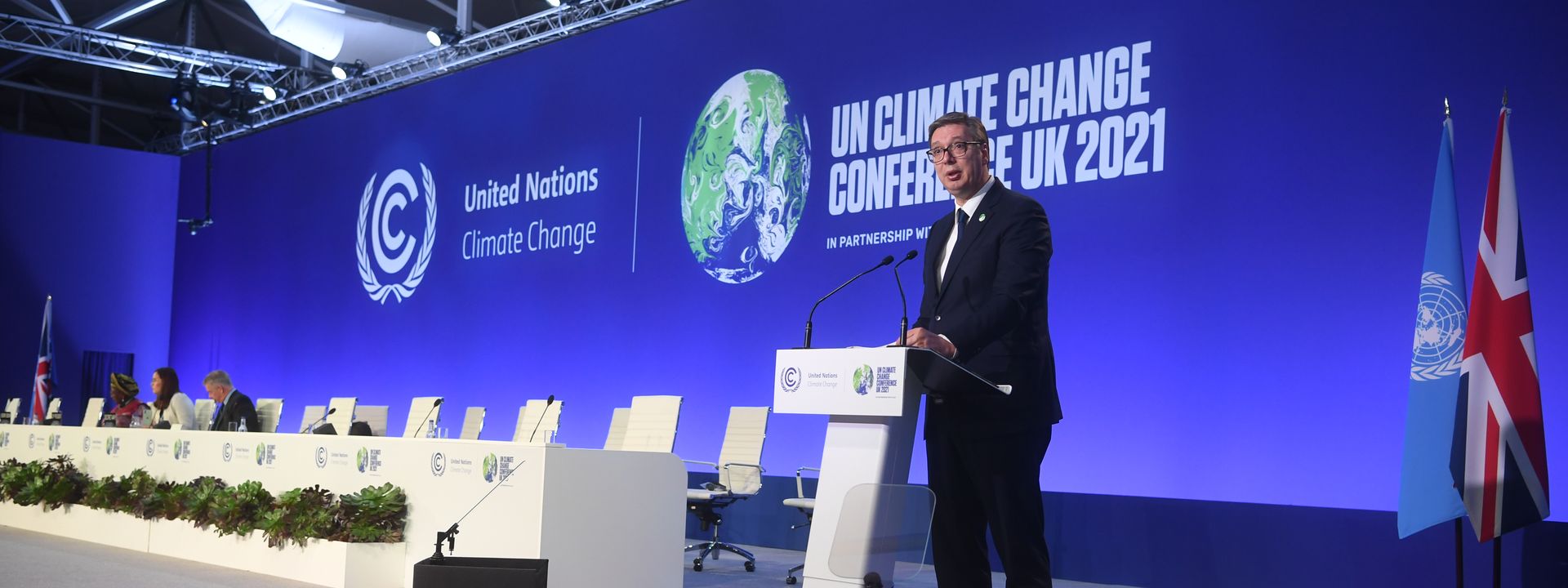
«Excellences,
Honorables délégués,
Chère Sara,
Tout d'abord, je me vois dans l’obligation de remercier le Premier ministre Boris Johnson et le gouvernement de Sa Majesté pour leur hospitalité exceptionnelle.
J'ai le privilège de représenter la République de Serbie dans ce lieu important et au plus haut forum mondial, qui aborde le sujet le plus important d'aujourd'hui – la promotion de la sensibilisation aux enjeux climatiques.
Nous sommes tous d'accord pour dire que nous devons investir dans le climat et l'environnement.
De même, nous sommes tous d'accord pour dire que les générations futures doivent être éduquées pour ne pas répéter les erreurs que nous avons commises, en détruisant la seule planète qui rende la vie possible.
Je suis extrêmement honoré que la République de Serbie copréside la Conférence de cette année en tant que représentant du groupe des pays d'Europe orientale qui ne sont pas membres de l'Union européenne.
Concrètement, nous voyons une contribution particulière de notre équipe d'experts dans l'achèvement des négociations sur l'opérationnalisation de l'article 6 de l'Accord de Paris, relatif à la mise en place de mécanismes mondiaux marchands et non marchands pour réduire les émissions de gaz à effet de serre, ainsi que les dispositions restantes concernant le cadre amélioré de la transparence et les délais communs pour les contributions déterminées au niveau national, qui sont des dispositions clés de l'accord pour lesquelles une décision n'a pas encore été prise pour être adoptée par la Conférence, c'est-à-dire tous les États membres.
Par conséquent, nous pensons qu'il s'agit d'une occasion exceptionnelle pour la Serbie d'apporter sa pleine contribution à la finalisation des négociations, qui garantiront, nous l'espérons, la mise en œuvre pleine et entière de l'Accord de Paris.
En raison du fort développement économique modélisé pour la Serbie d'ici 2050, l'impact de la mise en œuvre de mesures environnementales sur l'emploi sera optimal, à travers la création de nouveaux emplois et la création de nouvelles industries, inexistantes jusqu’ici.
Lors de la première vente aux enchères d'obligations vertes en Serbie, un milliard d'euros ont été collectés, ce qui confirme clairement la confiance des investisseurs internationaux dans notre agenda vert, mais aussi la stabilité économique et politique de notre pays.
Nous utiliserons les revenus générés par l'émission d'obligations vertes pour financer les sources d'énergie renouvelables, l'efficacité énergétique, la gestion durable de l'eau, la prévention de la pollution et le développement d'une économie circulaire, et la préservation de la biodiversité.
Et comme vous pouvez le voir, chers amis, mes associés m'ont préparé un grand discours, mais je vais ajouter quelques mots et poser quelques questions supplémentaires pour ceux qui viennent des grandes puissances et qui n'ont pas encore répondu à quelques questions:
Le numéro un en est: comment allons-nous financer toutes ces activités?
Nous avons entendu l'histoire des milliers de milliards de dollars à notre disposition. Ma question serait: quel serait le taux d'intérêt, quelles seraient les conditions pour obtenir cet argent et comment traiterions-nous réellement ce problème ?
Numéro deux: comment allons-nous traiter les centrales nucléaires? Les fermerons-nous toutes ou les construirons-nous davantage ?
De même, comment allons-nous construire plus d'énergies renouvelables si nous avons déjà commencé à soutenir les mouvements populistes contre les parcs éoliens, les nouvelles centrales hydroélectriques, et mettrons-nous en péril le niveau de notre dette publique par rapport au PIB si nous prenons des sommes énormes d’argent?
Comment traiterons-nous le gaz naturel et comment assurerons-nous des prix décents pour le gaz naturel et l'électricité ?
De même, je suis venu ici en voiture électrique d'Édimbourg à Glasgow. Mais comment allons-nous extraire et traiter le lithium, le nickel, le cobalt et bien d'autres minéraux très importants?
Et enfin, nous savons tous quel est notre objectif ultime, final. Mais ce n'est pas un conte de fées - nous devrons travailler dur, nous devrons être engagés à 100% et nous devrons être plus honnêtes les uns envers les autres.
La santé des personnes vivant en Serbie dépend directement de la mise en œuvre de cet agenda, tout comme la santé et la vie de chaque être vivant sur Terre dépendent de l'accord qui sera atteint ici et de la mise en œuvre de ces accords au niveau national.
C'est peut-être le bon moment pour écouter et entendre le cri de la Terre Mère, car si nous perdons cette course contre la montre, nos enfants hériteront d'une planète irrémédiablement polluée.
Merci de votre attention.»
Source: www.predsednik.rs
Photo: Dimitrije Goll |
|
|
| Les relations entre la Serbie et la RDC sont traditionnellement bonnes et amicales depuis 60 ans |
|
Le ministre Selaković a remercié le ministre d'avoir participé au sommet du Mouvement des pays non alignés, qui s'est terminé hier à Belgrade, et pour lequel il a déclaré qu'il était extrêmement important et qu'il était très réussi.
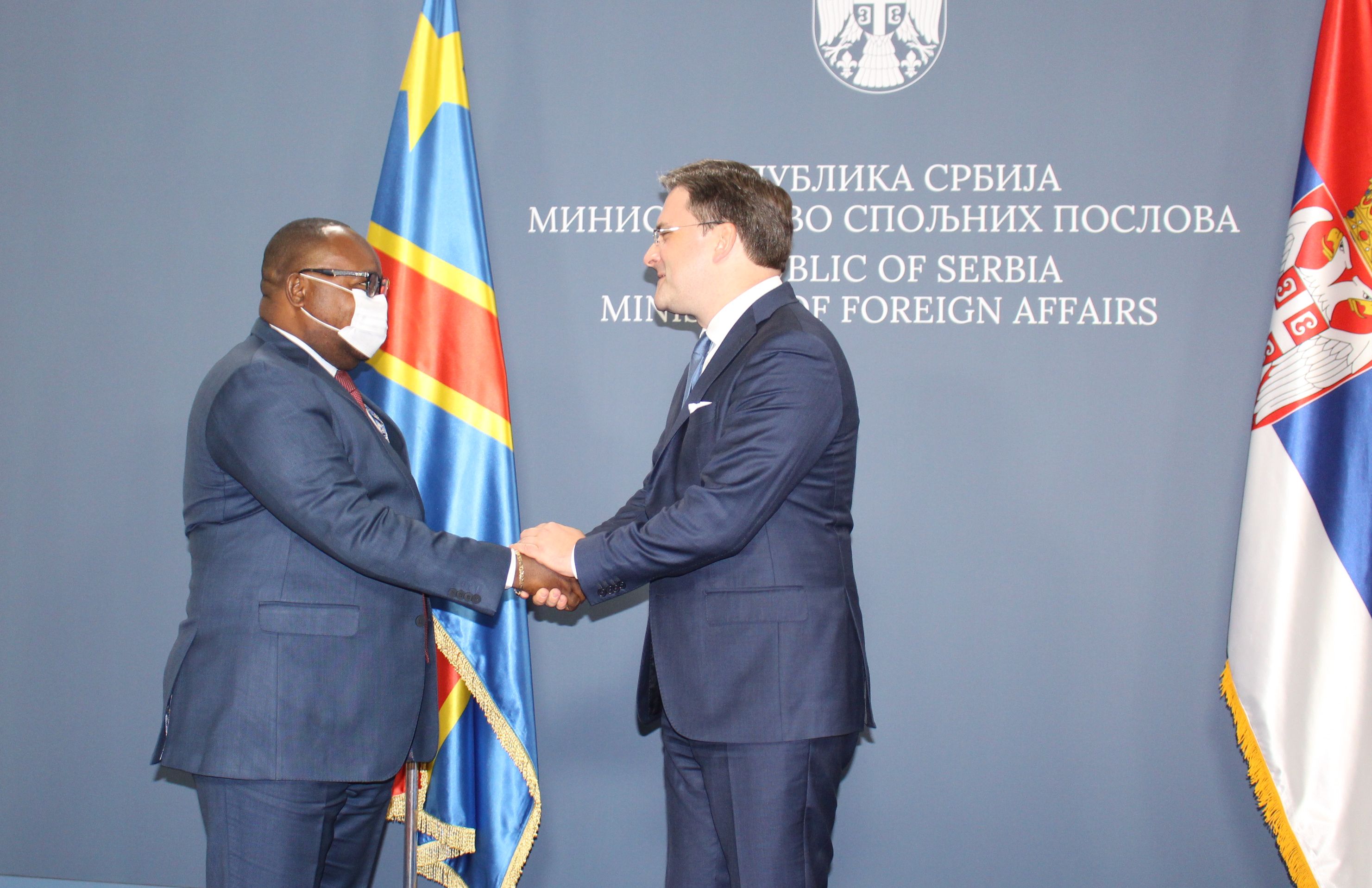
Le chef de la diplomatie serbe a estimé que les relations bilatérales sont traditionnellement bonnes et amicales, rappelant que cette année nous marquons non seulement 60 ans depuis la première conférence du MNA, mais aussi 60 ans de relations bilatérales entre la Serbie et la RDC. Il a souligné que les deux pays devraient maintenir une bonne dynamique de dialogue politique et poursuivre la réalisation de visites à un niveau élevé et le plus élevé.
En outre, le ministre Selaković a déclaré qu'une attention particulière devrait être accordée au développement des relations économiques, et il a mentionné le commerce, l'agriculture et le secteur IT comme des domaines dans lesquels il est possible d'améliorer la coopération.
Selaković a remercié son interlocuteur pour sa position de principe concernant la non-reconnaissance du prétendu Kosovo et un positionnement cohérent sur cette question dans les organisations internationales.
Le ministre Selaković a informé l'invité de l'augmentation du nombre de bourses que notre pays accorde à travers le programme «Le monde en Serbie», a invité les jeunes du Congo à profiter de l'opportunité d'étudier gratuitement dans notre pays et s’est dit espérant que ce type de coopération dans le domaine de l'éducation améliorera encore les relations entre nos Etats et peuples.
|
|
|
| Selaković devant le CSNU: le dialogue et la mise en œuvre des accords atteins sont le seul bon moyen de résoudre les questions ouvertes |
|
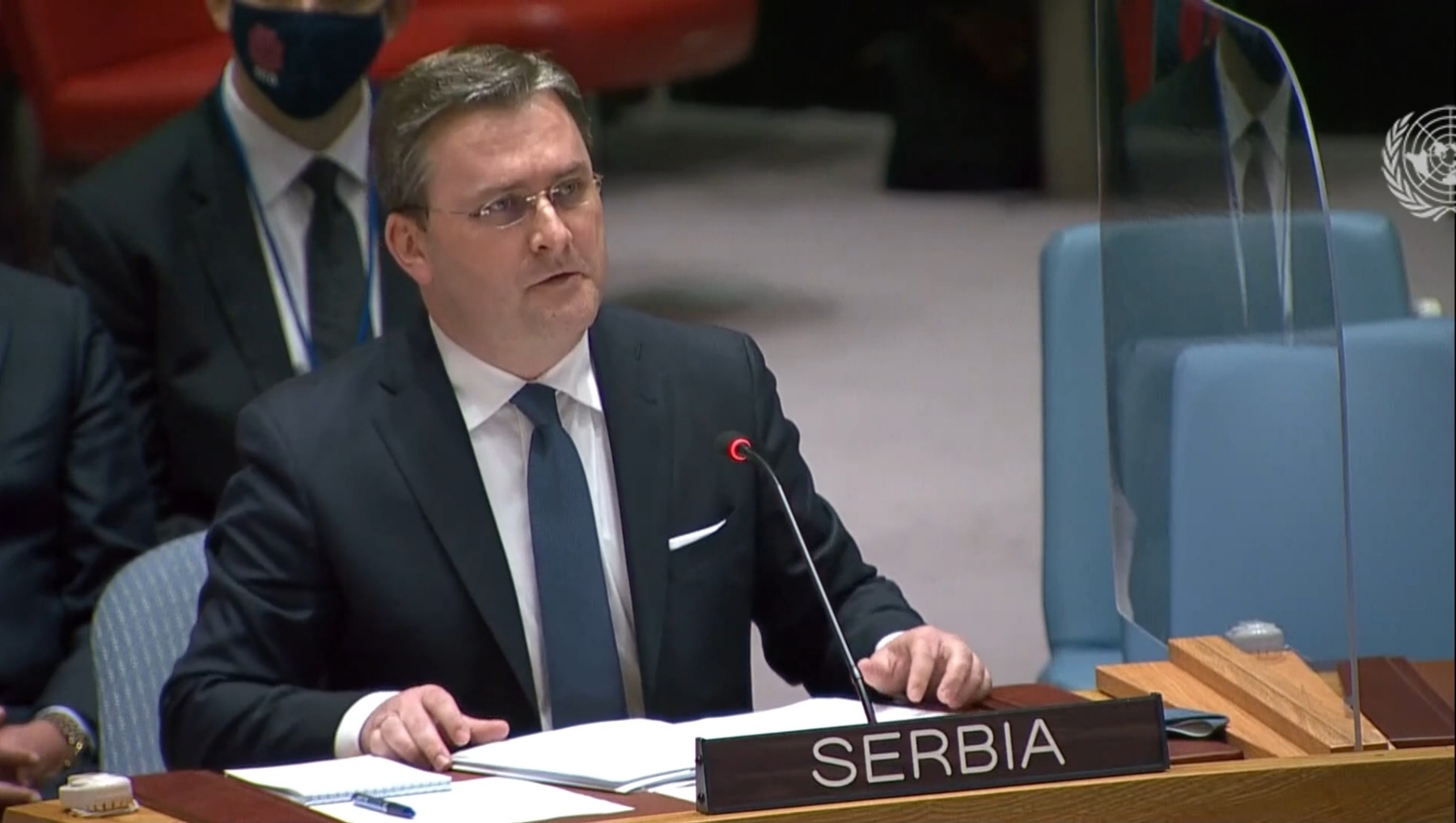
Le 15 octobre 2021
Selaković devant le CSNU: le dialogue et la mise en œuvre des accords atteins sont le seul bon moyen de résoudre les questions ouvertes
Discours du ministre serbe des Affaires étrangères Nikola Selaković lors de la session du CSNU consacrée au travail de la MINUK:
Honorable Président du Conseil de sécurité,
Honorables membres du Conseil de sécurité,
Honorable Représentant spécial,
Je tiens à remercier le Secrétaire général des Nations Unies, Guterres, et le Représentant spécial du Secrétaire général et Chef de la MINUK, Tanin, pour le rapport et les efforts déployés pour mettre en œuvre le mandat de la MINUK. Je remercie également les membres du Conseil de sécurité de l'attention constante qu'ils portent à la question du Kosovo-Metohija. La République de Serbie tient en haute estime les activités de la Mission des Nations Unies au Kosovo-Metohija et s’emploie pour son travail le plus efficace conformément à la résolution 1244 du Conseil de sécurité de l’ONU, sans en réduire la teneur, dans le but de construire et de préserver une paix, une stabilité et une sécurité durables dans la province.
Monsieur Tanin,
Recevez des expressions de notre gratitude pour l'engagement et la coopération réalisés au cours de votre mandat.
|
|
|
| Didier Mazenga Mukanzu - Minister of Regional Integration of Democratic Republic of el Congo |
|
12.10.2021.
Didier Mazenga Mukanzu, , Minister of Regional Integration of Democratic Republic of el Congo participate in a High Level Meeting to Commonerate the 60th Anniversary of the Non-Aligned Movement on Belgrade the Capital of the Republic of Serbia .teleSUR
http://www.youtube.com/watch?v=YeEM4A1hwLc |
|
|
| L’Entretien téléphonique du président Vučić avec le secrétaire général de l'OTAN |
|
Le 26 septembre 2021
L’Entretien téléphonique du président Vučić avec le secrétaire général de l'OTAN
Le président de la République de Serbie Aleksandar Vučić a eu aujourd'hui un entretien téléphonique avec le secrétaire général de l'OTAN Jens Stoltenberg, concernant, comme l'a dit le secrétaire général, la situation préoccupante dans le nord du Kosovo-Metohija.
Le président Vučić a souligné que la Serbie n'a pas enfreint l'Accord de Bruxelles ou la Résolution 1244 avec absolument rien, pas un seul geste, ni n'a mis en danger la préservation de la paix de quelque manière que ce soit.
-L'occupation totale du nord du Kosovo-Metohija dure sept jours avec des véhicules blindés, qui est menée par Priština, et tout le monde dans la communauté internationale est «silencieusement tonitruant» a souligné le président serbe. -Pourtant, tous sont soudainement inquiets lorsqu'ils voient des hélicoptères et des avions serbes sur le territoire de la Serbie centrale, car il est à supposer qu'ils ne devraient pas exister, ou qu'ils ne devraient pas décoller tant que Kurti ou quelqu'un de la communauté internationale ne les aient approuvés, souligne le président Vučić.
La Serbie respecte tous les traités internationaux qu'elle a signés, la Serbie agira toujours de manière responsable et sérieuse, mais la Serbie demande toujours quand commencera la mise en place de l’Association des municipalités serbes et quand les unités blindées de Kurti seront retirées du nord du Kosovo-Metohija.
Pour finir, avec les remerciements au secrétaire général Stoltenberg pour l'attitude correcte et le souhait d'écouter la partie serbe, le président Vučić a posé la question quelle norme et réglementation internationale la Serbie a-t-elle violées? Aujourd'hui, hier ou n'importe quand?
Les deux interlocuteurs ont convenu de rester en contact permanent en raison de la nécessité de préserver la paix et la stabilité dans toute la région.
Source/Photo : www.predsednik.rs
|
|
|
| Prime Minister Brnabic at Global COVID-19 summit organised by White House |
|
22 September 2021
Prime Minister Ana Brnabic participated today at the Global COVID-19 summit, organised by the White House, which was opened by US President Joseph Biden.
The video messages are attended by a large number of world leaders and officials of international organizations, including UN Secretary General Antonio Guterres, European Commission President Ursula von der Leyen, British and Canadian Prime Ministers, Boris Johnson and Justin Trudeau, German Chancellor Angela Merkel and many others.
In the message, the Prime Minister pointed out that Serbia was among the first European countries to procure a covid vaccine, and that she was the first European Prime Minister to receive the vaccine.
Thanks to years of investment in digitalisation and development of eGovernment, we have managed to organise a complicated and complex vaccination process very efficiently and in a way that it is focused on citizens, she explained.
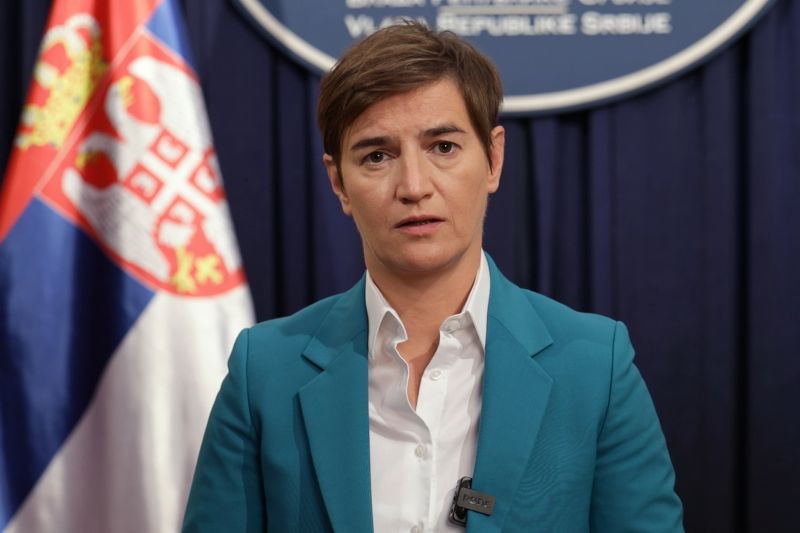
|
|
|
| Marking of Remembrance Day of all Serbs who died and were expelled in the armed operation "Storm" |
|
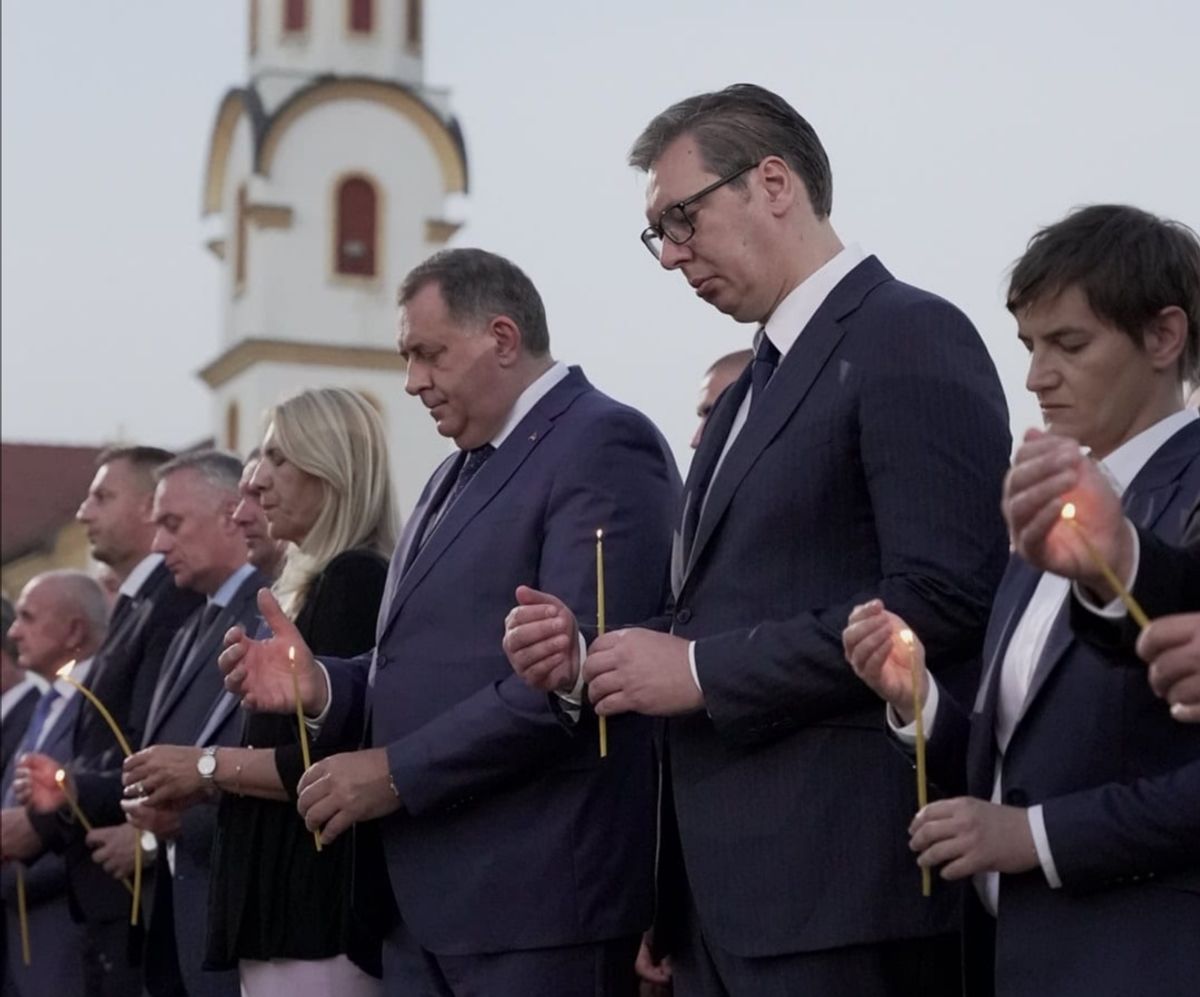 5 August 2021 5 August 2021
Marking of Remembrance Day of all Serbs who died and were expelled in the armed operation "Storm"
The President of the Republic of Serbia, Aleksandar Vučić, attended the celebration of the Remembrance Day of all the victims and expelled Serbs in the armed operation "Storm" and said that Serbia remembers!
"Today, when we remind ourselves again of what happened in August 1995, the terrible pogrom, the expulsion of more than 250,000 Serbs, the exodus and ethnic cleansing, we, at the same time, and finally, remind ourselves of who we are, what we are, where we come from and where we are going. Thank you all for being here together tonight and for showing how much we love our people", said President Vučić, adding that we will not forget any of the things that the Krajina people had to go through.
"For us, these are not just terrible numbers of victims", said President Vučić and emphasized that Serbia will not forget.
"History has never been rewritten like today. That is why I want to remind us all not only of what others have done to us, not wanting us to exist, but also of what we have done to ourselves, just as if we ourselves did not want to exist", said the President, noting that we must never again allow Serbia to forget its silent heroes.
President Vučić emphasized that we must never again cover our eyes, ears, and mouths in front of something that truly was a pogrom and the downfall of all humanity.
"Pretending that this is not true, avoiding saying it, is a crime not only against the victims, but also against ourselves, every living Serb, people from Krajina, as well as Serbia and its future", said President Vučić and underlined that people can stand up straight and live with themselves and the others without hesitation, fear and doubt, only if they remember.
President Vučić pointed out that Serbia must fight for peace and cradles with children, as well as that not remembering annuls and erases us from the history and the future, depriving us of the right to tomorrow.
"Our mission is a happy future for us and for the new generations! Today's Serbia is based on a clear identity and a culture of remembrance", said President Vučić and reminded that everything that had been neglected for decades had been done, and that a strong Serbia has become the master of its own destiny.
"Eternal glory to you, Serbian martyrs who perished in the "Storm" and all other pogroms. Your children are in their Serbia, taken care of, loved and successful. Sleep peacefully, Serbian falcons, the future of your children is our vow", concluded President Vučić and thanked everyone who showed that night how much they love their country and that Serbia remembers.
Source: www.predsednik.rs
Photo: www.predsednik.rs
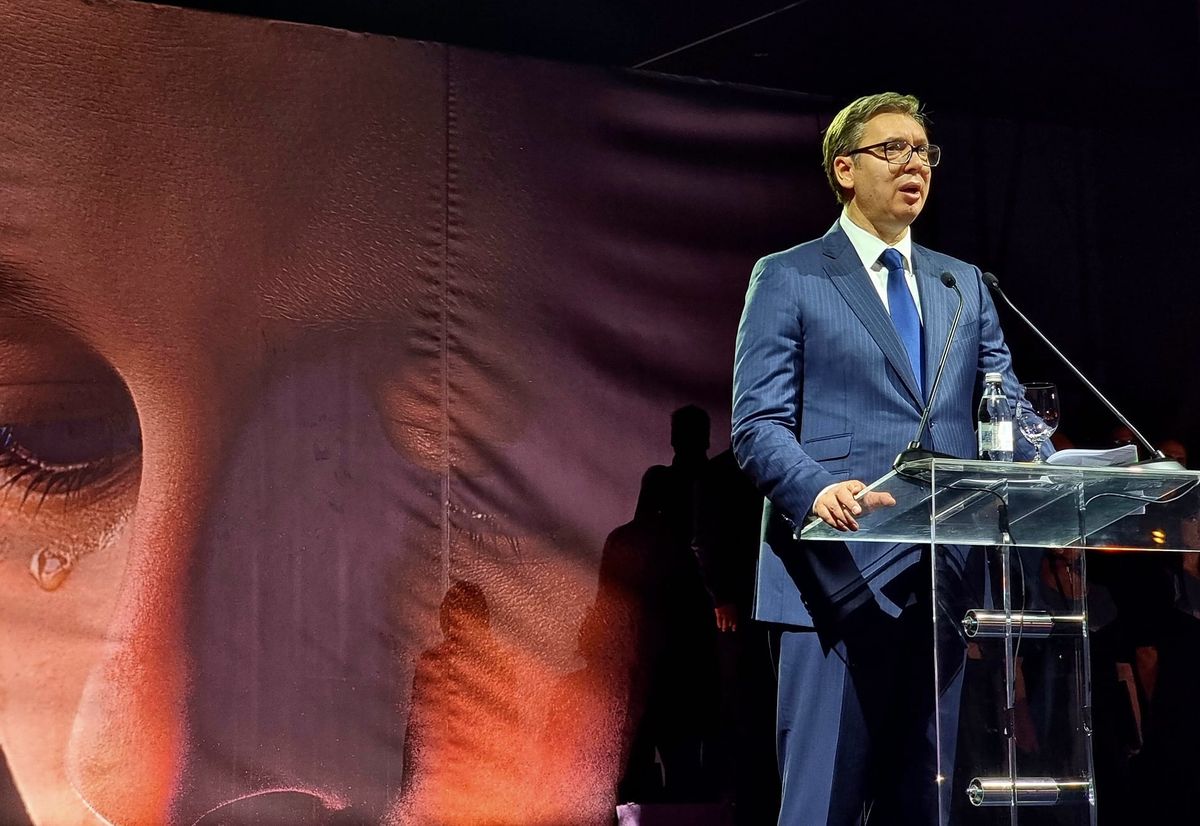 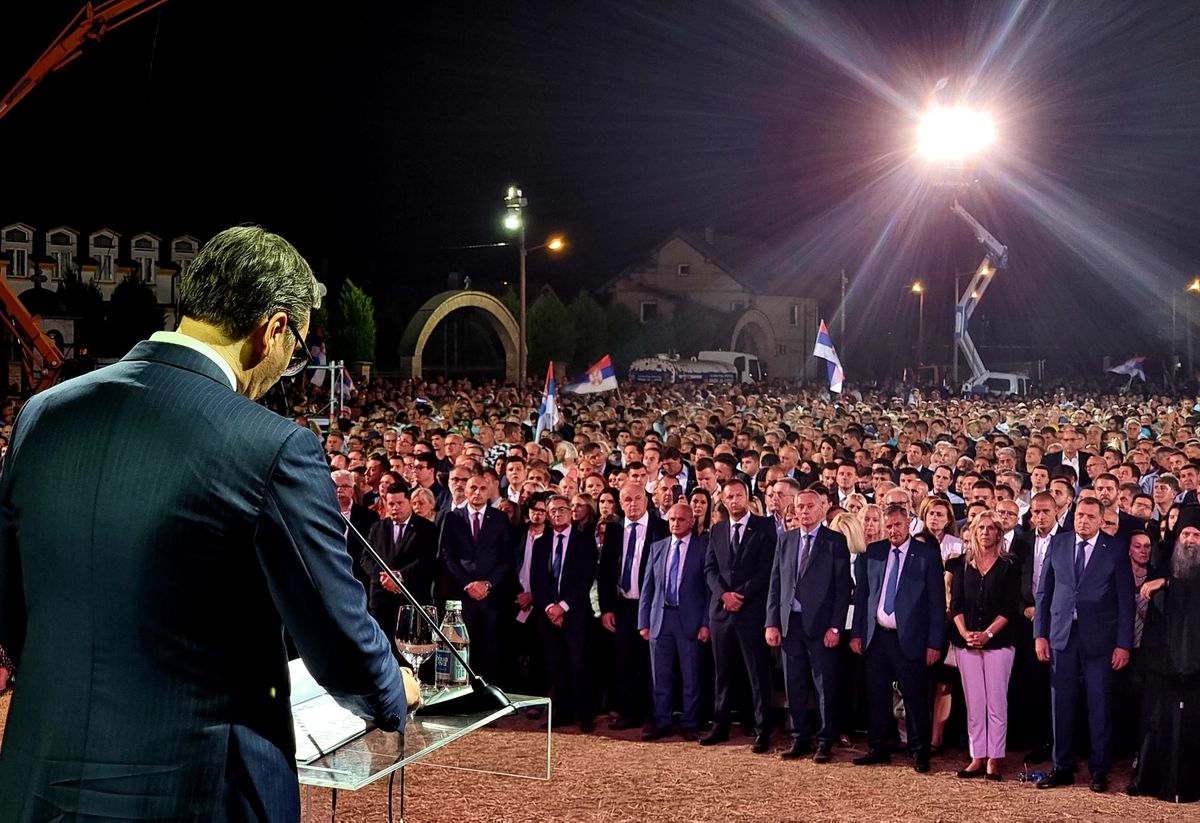  |
|
|
| Serbia has achieved great success in the field of digitalization |
|
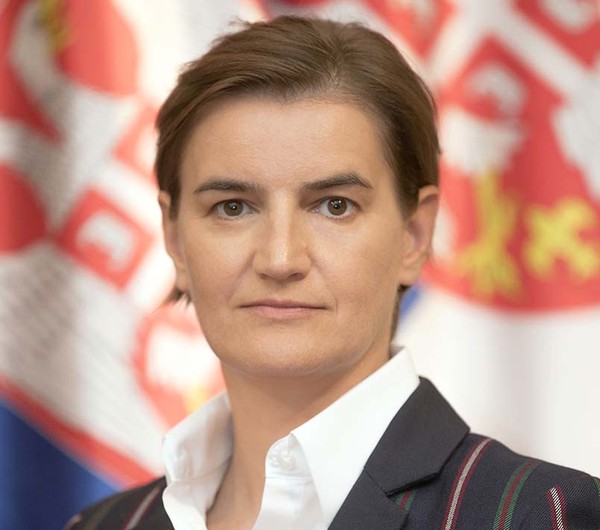
20 July 2021
Serbia has achieved great success in the field of digitalization
The Prime Minister of the Republic of Serbia, Ana Brnabić, stated at a gathering dedicated to digitalization and the IT sector, which was held in New York, that since she became Prime Minister, she is most proud of Serbia's success in the field of digitalization.
Brnabić, who is on a two-day visit to the United States, said that when she was elected Minister of Public Administration and Local Self-Government in August 2016, she wanted to do everything to change the public administration and what bothered her as a citizen.
She stated that, when she took office as Prime Minister, she knew what her priorities were and that first of all, digitalization needed to be raised to a higher level, that the education reform was supposed to begin, as well as work on strengthening the economy.
I believed in a country that believes in its people, because the Serbian people are creative. From 1 June 2017, we started working as an e-Government, i.e. we started exchanging data electronically, said the Prime Minister.
According to her, our citizens no longer had to go to, say, the Tax Administration, and since then, the public administration has exchanged 50 million documents, which means that citizens did not have to go from office to office for 50 million papers.
Brnabić pointed out that she is proud of what has been done in the field of education since she became the head of the Government, specifying that in September 2017, programming was introduced as a compulsory subject in primary schools.
Nobody believed that we could do that, but we cooperated with the private sector and some social organizations and we succeeded. At the moment, we are far ahead of numerous countries in Europe and the world, said the Prime Minister.
The Prime Minister pointed out that she was most proud when the cornerstone was laid for the science and technology park in southern Serbia, noting that so far, our country has four science and technology parks.
She pointed out that Serbia has since become one of the most successful countries in the world in the field of technology, and that according to some parameters, it is among the ten countries in the world, or among the five, assessing that this is proof that the country can change quickly.
Answering the question about vaccination, the Prime Minister emphasized that our country has never seen it as a geopolitical issue, but as a health issue.
According to her, Serbia talked with producers from both the East and the West and was among the first European countries to sign agreements with the company Pfizer-BioNTech and Sinopharm.
Unfortunately, many countries have viewed this issue as geopolitical. It did not matter to us, as long as the vaccines were safe, the Prime Minister emphasized and added that this was not the end of Serbia's success, because good organization was also needed.
Brnabić explained that the organization is another important thing in vaccination, because it is a logistically very difficult process, adding that, with the help of digitalization, success has been achieved and that everything we did in the previous years has paid off.
She stated that Serbia quickly established a system through which citizens could express interest in vaccination against the coronavirus and choose which vaccine they wanted to receive, as well as to be informed by a message when to go and get vaccinated.
Now I can log in on my phone, to see how many people have received the vaccine, how many more have registered, so that the effects of digitalization are obvious. We have made everything very efficient and easy for our citizens, the Prime Minister explained.
Answering the question of what she can tell other countries of the world about how to progress faster, Brnabić said that it is important to invest as much as possible in digitalization and education.
You need to teach children how to think, not what to think. Not all children will become IT experts, but what they can learn is an algorithmic way of thinking and how to make decisions, she said.
The Prime Minister mentioned investing in high-speed internet and providing infrastructure for start-ups as an important thing for progress, because more and more economies will be based on start-ups and innovations, emphasizing that people should be helped to start companies and implement their ideas.
Speaking about social networks, she pointed out that fake news has become the biggest problem on these networks and that it will remain so for some time.
This is the biggest challenge I face as Prime Minister, especially during the corona virus pandemic, she said, adding that social networks are also a great opportunity for politicians to communicate with citizens.
Source: www.srbija.gov.rs
Photo: www.srbija.gov.rs |
|
|
| President Vučić: We have decided – our goal is the EU, but China is an important partner |
|
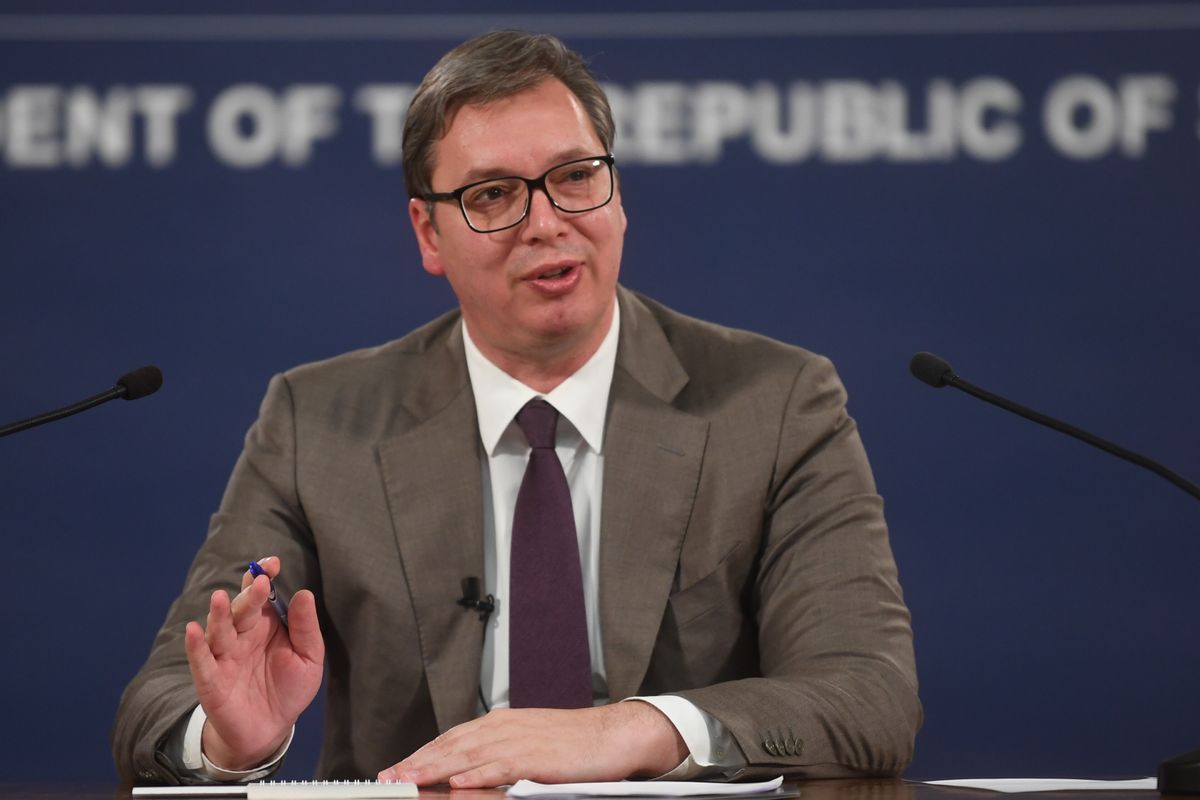
22 July 2021
President Vučić: We have decided – our goal is the EU, but China is an important partner
We have decided – our goal was and remains the EU, Serbian President Aleksandar Vučić said in an interview with the German daily "Handelsblatt", adding that there is no alternative for Serbia, but also stressing that China is an important partner for Serbia, and that the task of the state is to take care about the interests of its citizens.
He thus answered the question of what Serbia will choose once it has to choose between close relations with Beijing or the EU. Vučić emphasized that Serbia wants to become a full member of the EU.
"We are connected by history, common culture, EU members are already undoubtedly our most important partners", he explained and added that the trade exchange between Germany and China is 3,000 times higher than between Serbia and China, and, as he noted, even despite that, Serbia's business operations with China are portrayed as a problem.
To the statement that the German Chancellor Angela Merkel did not congratulate the 100th anniversary of the Communist Party of China, and that he did so, he replied that Serbia is not Germany, but a small country. On additional insistence on what Serbia will do if it has to choose between the EU and China, he underlined that Serbia has already decided, that its goal was and remains the EU membership.
"Our biggest investors are from the EU. The EU accounts for 67% of our trade while 17 percent of the trade is with countries of the region that are all on the way to the EU. We cannot survive without the EU", he added.
"But can we do a lot of good things with China – of course. And we do that, just like Germany does", Vučić pointed out, and to the remark that the quality of the Silk Road projects was being criticized, primarily because of Chinese workers, he answered that the quality of roads or bridges, which Serbia is building with China, is excellent.
"We give jobs to those who submit the best offer to us. That is why I tell Europeans who criticize Chinese projects in our country – offer us a project for one euro more and you will get it", he emphasized.
In that regard, he pointed out that Serbia is building a railway to Northern Macedonia with 600 million euros of EU aid, stating that that offer was better than China's.
"There is often talk of a 180-kilometer railway to Budapest through the territory of Serbia, which is financed by China. But the railway that is being built with the help of the EU from Belgrade to the northern Macedonian border is twice as long and no one is talking about it. It is all too political", he stated.
Asked whether he welcomes the plans of the EU and the USA regarding an alternative initiative to the Silk Road, Vučić said that he supports everything that brings advantages to our region.
"The Chinese want to expand their presence everywhere, but many processes in the West are, frankly, more efficient and without problems. We still have a lot to learn from the West, but we are getting there", Vučić said.
He pointed out that China was an important partner for Serbia and added that when the consolidation of state finances began in 2014, our country received good conditions from China for development projects.
He also stated that a competition for a copper mine was announced in eastern Serbia, at the request of the EU, that no European company had made an offer for six months, and that it had then been taken over by the Chinese.
"Our job is to take care of our people", he said.
He reminded that the Serbian economy grew by 52% in eight and a half years, which for the EU means that Serbia could be a strong member and engine for the entire region.
Explaining how Serbia is developing so well economically, he pointed out that Serbia has an excellent workforce, which speaks English, that society and administration are digitalized, and that it has the most flexible labor law in Europe, as well as consolidated public finances.
He reminded that previously the public debt was at 78% of GDP, and that today it has been reduced, thanks to the strong growth of the economy, to 52%.
"We can afford to give investors an incentive to come", he added, emphasizing that Serbia offers investment assistance, but that, for example, subsidies were not the motive for the arrival of the development center of the company Continental.
He pointed out that, five or six years ago, only Serbia started using the dual education system in this region, which Germany, Switzerland and Austria also use, that tens of thousands of people are in dual education, and that this is appreciated by foreign investors, who, in addition, can work closely with universities as well.
Germany, he stated, is the most important trade partner and the largest investor.
We started with the arrival of small textile companies from Turkey, and now primarily large German companies are coming. Today, 71,000 people work in German companies in Serbia", he explained.
Vučić said that the European perspective is very important for investors, stating that Nidek, Toyo Tires or Mitsubishi are coming from Japan to Serbia because our country is on a stable European path.
Asked if he believes that Serbia will become an EU member in the foreseeable future, he said that he does not complain.
"It is certain that if we had received 45 billion euros of EU aid, we would have been much further economically. Instead, we received 1.6 billion euros from the EU. We are used to achieving our successes on our own", said Vučić.
The President of Serbia reminded that in Croatia, salaries used to be 2.2 times higher than in Serbia, and today they are only 1.7 times higher.
"We are closing the gap with our own efforts. If we were to become a member of the EU, then we would certainly not ask for the biggest subsidies", he assures.
He said that the Serbian path follows the German path to Europe, and that Serbia wants a fair chance.
"I believe Merkel's words. She is at the end of her term and I would not have to praise her anymore. But she gave us stability, freedom of travel to the EU, helped us with the migrant crisis in 2015, and asked the Minister of Economy Altmeier and others to work closely with us", he reminded.
Asked if there were any indications that the new German government would support Serbia in the same way, Vučić expressed confidence that it would be the same.
"I know Armin Laschet, I talked to him while he was the Minister-President of North Rhine-Westphalia. He is very smart and understands the situation in the Balkans, and he will certainly continue Merkel's policy towards our region as the new chancellor", he added.
Vučić also expressed his belief that Russia, if Serbia's accession to the EU were concretized, would not react similarly as in the case of Ukraine, as this is a sovereign decision of Serbia.
To an additional question in this regard, Vučić pointed out that whenever he met with Vladimir Putin, and there were 18 or 19 meetings, he told him that he was grateful for the traditionally close friendship with Russia, but also that Serbia is on a clear course towards the EU.
"He asked if it was our choice and I answered that EU membership is indeed our goal", he added.
When it comes to "Kosovo", Vučić emphasized that a compromise is needed regarding this issue.
"Only in this way can there be sustainable peace. Serbia wants peace, me as well. Let's stop with the madness of the past. Only then can the whole region become the engine of new growth for Europe", said Vučić.
Source: Tanjug
|
|
|
| Selaković invited representatives of members of the NAM to gather in Belgrade in October |
|
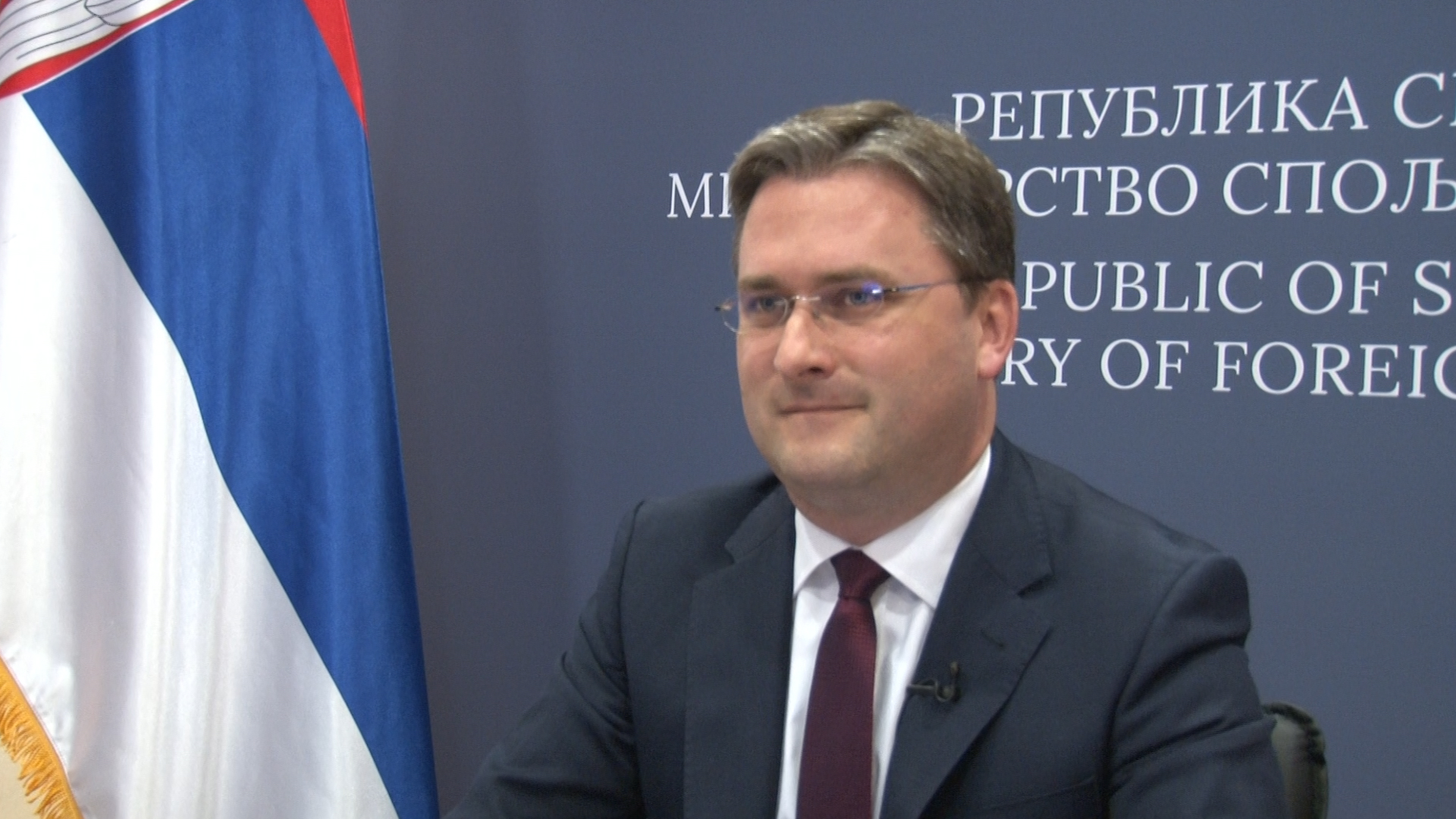
13. July 2021.
Selaković invited representatives of members of the NAM to gather in Belgrade in October
The Minister of Foreign Affairs of the Republic of Serbia, Nikola Selaković, spoke at the Ministerial Conference of the Non-Aligned Movement (NAM) today and on that occasion sent an invitation to the representatives of the members to gather in Belgrade on 11 and 12 October, when the 60th anniversary of the first Conference of the Non-Aligned Movement held in Belgrade in 1961 will be marked.
Selaković informed the participants of the conference that Serbia would organize this important jubilee of non-aligned countries together with Azerbaijan – which is currently chairing the NAM.
In his address, Selaković reminded that the former Yugoslavia and President Tito, as co-founders of the Movement, gave their contribution to creating a vision of a different world, and that Serbia, as one of the successors of Yugoslavia, is proud of that part of its history.
"The spirit of non-alignment is based on equality, freedom, lasting peace, sovereign equality of states and peaceful cooperation of all peoples, and these values are also woven into the state-building foundations of Serbia", the minister said.
Selaković said that the Non-Aligned Movement throughout its history has been a beacon of freedom to all those who sought the right to existence and prosperity in a world that was often ruled, not by the force of law, but by the law of force. He assessed that even today we find ourselves in times of serious global challenges in which the Movement has the opportunity to reaffirm its libertarian traditions and commitment to a world of equals.
"Serbia, as a militarily neutral and politically independent state, will give its most sincere contribution to such goals of the Movement. We hope that by strengthening mutual ties and cooperation, as a group of states and peoples that share the same values and interests, we will strengthen our common capacity to face the challenges of tomorrow. And the challenges are already before us", Selaković pointed out.
The Minister emphasized that international law should be a pillar of political and security architecture of the world, and added that Serbia respects the commitment of the members of the Movement towards the goals and principles of the UN Charter.
"Many members of this movement are aware that by insisting on international law, they are working in their own favor and in favor of preserving regional and global stability," the minister pointed out.
Selaković also said that the COVID-19 pandemic clearly showed that inequality, lack of solidarity and empathy in the world have become very obvious in the roughest way.
"Serbia is eternally grateful to all the countries which, such as Azerbaijan, helped us in difficult times. We later extended that chain of solidarity by making vaccines available, not only to our citizens, but also to others in the region. We supported our neighbors with the belief that solidarity is the best investment in a common future", the minister concluded.
|
|
|
| Minister of Foreign Affairs of the Republic of Serbia Nikola Selakovic with Minister to the President of the Democratic Republic of the Congo, Ms. Nana Manuanina Kihimba |
|
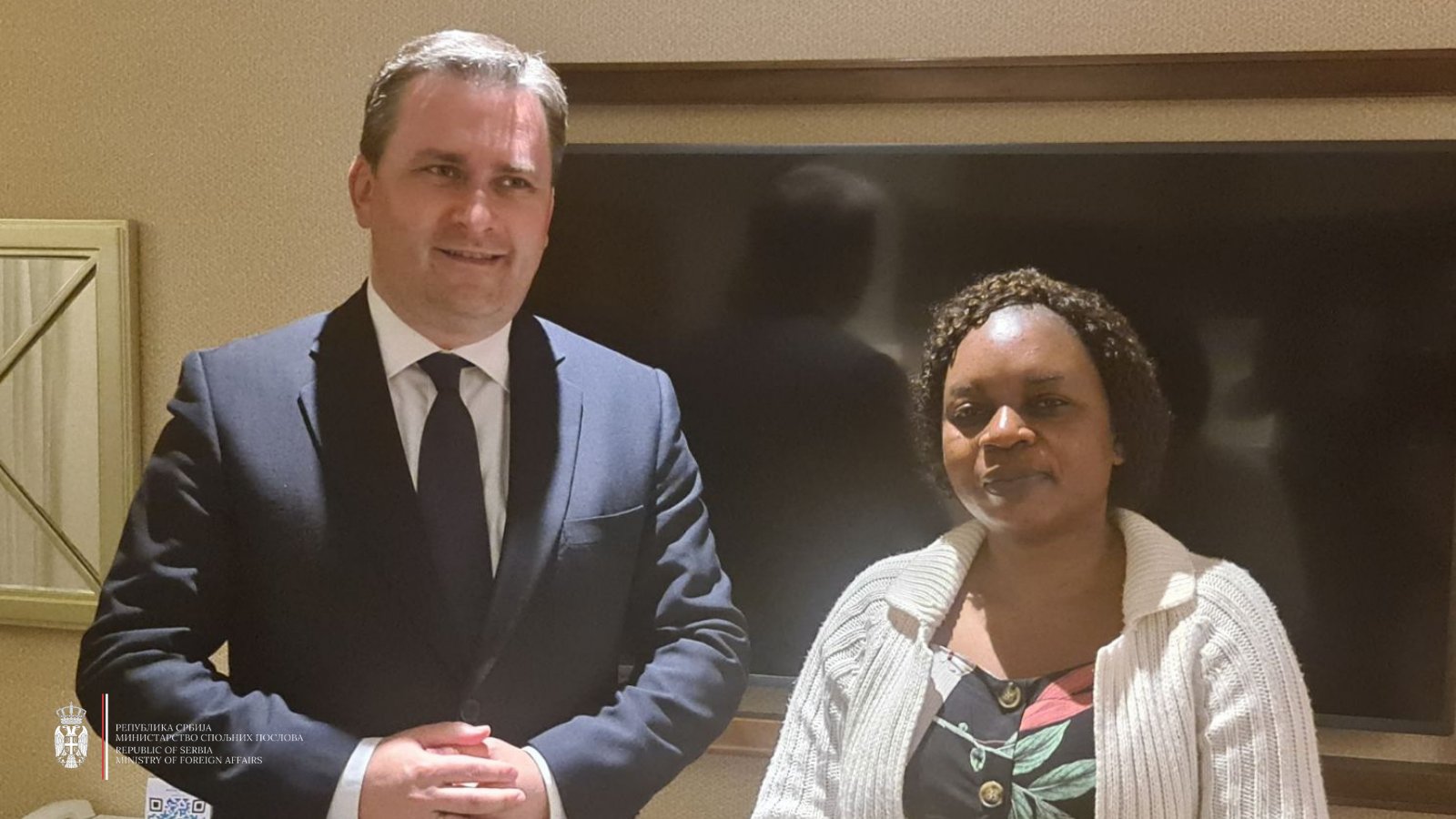
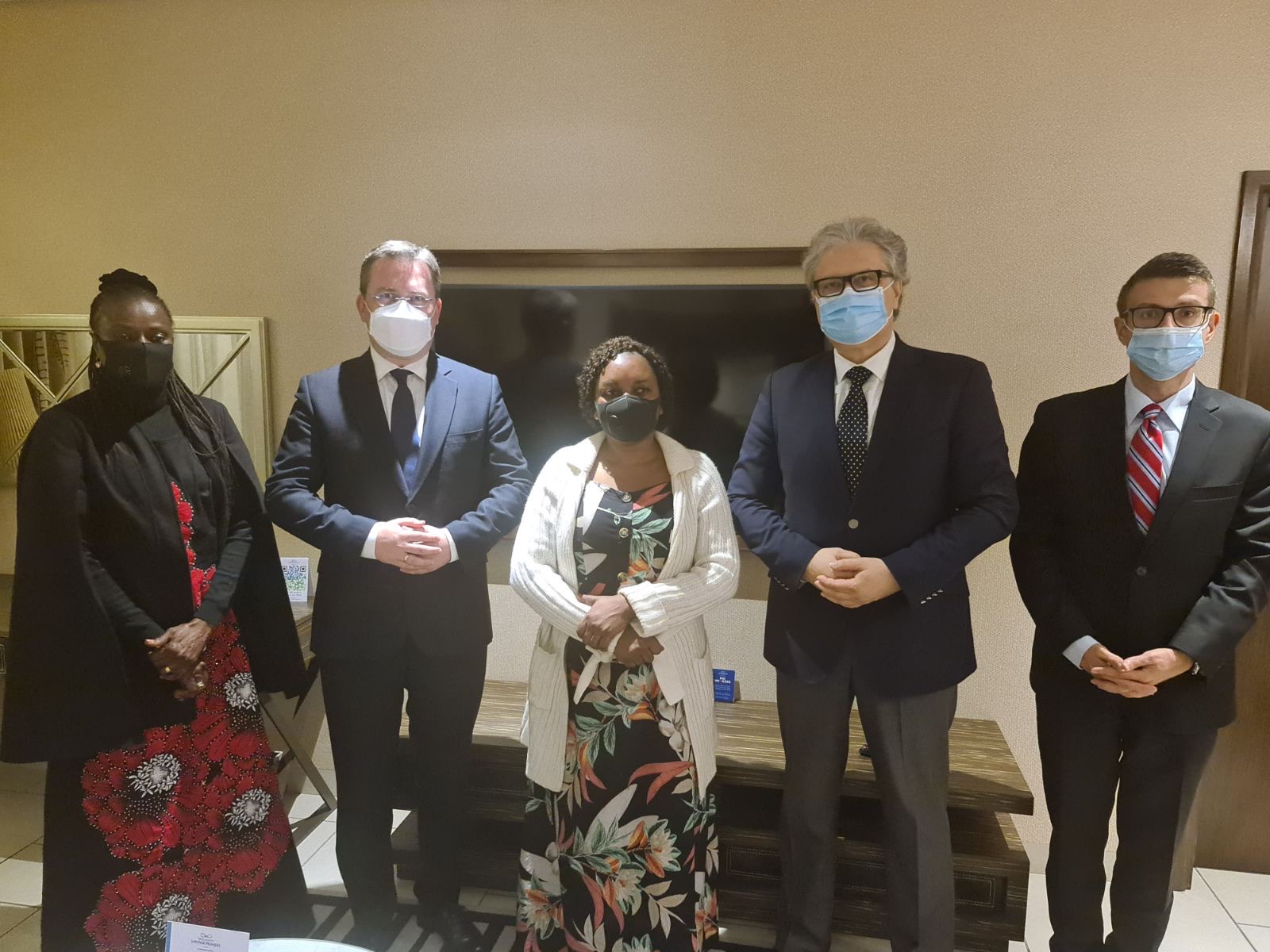
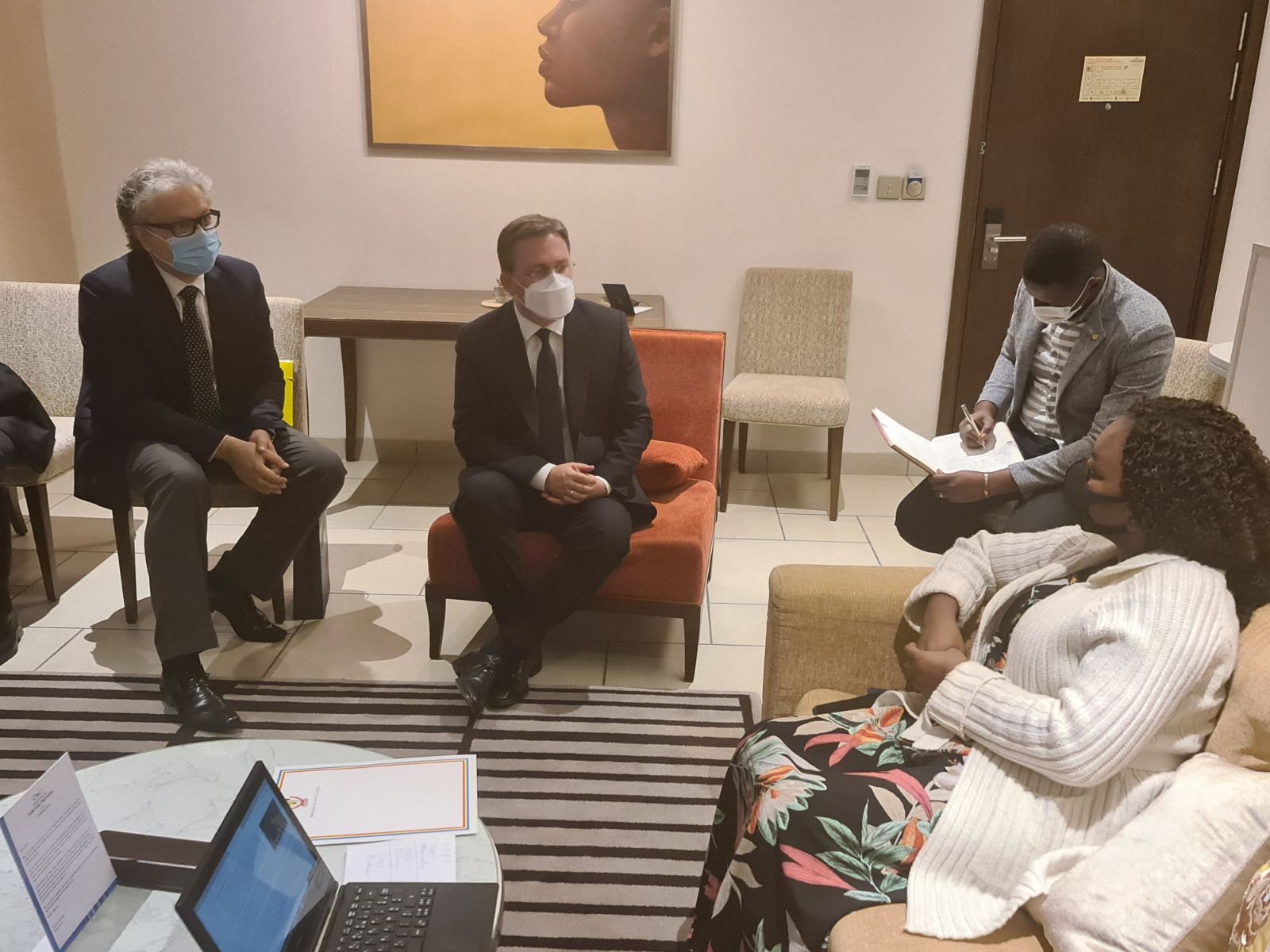
3 July 2021
Selakovic: We are grateful to the Democratic Republic of the Congo for supporting Serbia's territorial integrity and sovereignty
Minister of Foreign Affairs of the Republic of Serbia Nikola Selakovic met in Lusaka with Minister to the President of the Democratic Republic of the Congo, Ms. Nana Manuanina Kihimba.
Minister Selakovic noted that the two countries had good and friendly relations, which were additionally strengthened through the recent visit by President Félix Antoine Tshisekedi Tshilombo to Serbia.
Selakovic expressed the expectation that new meetings at the high and top levels would follow in the near future, and extended an invitation to DR Congo to take part in the marking the 60th anniversary of the Non-Aligned Movement in Belgrade in October, at the level of the head of state.
Minister Selakovic expressed special gratitude for the constant and principled support of DR Congo to the territorial integrity and sovereignty of Serbia, as well as for the support it provided to us in international organizations.
The interlocutors exchanged information on the epidemiological situation and discussed possibilities for cooperation in the fight against Covid-19.
Minister Selakovic informed his collocutor about the fact that the new Ambassador of the Republic of Serbia in Kinshasa would soon take office.
In Lusaka, Minister Selakovic attended the funeral of the first president of Zambia Kenneth Kaunda and had meetings with officials from a number of African countries who had arrived there to pay their respects to the deceased. |
|
|
| Address by the President of the Republic of Serbia at the session of the United Nations Security Council |
|
Address by the President of the Republic of Serbia at the session of the United Nations Security Council
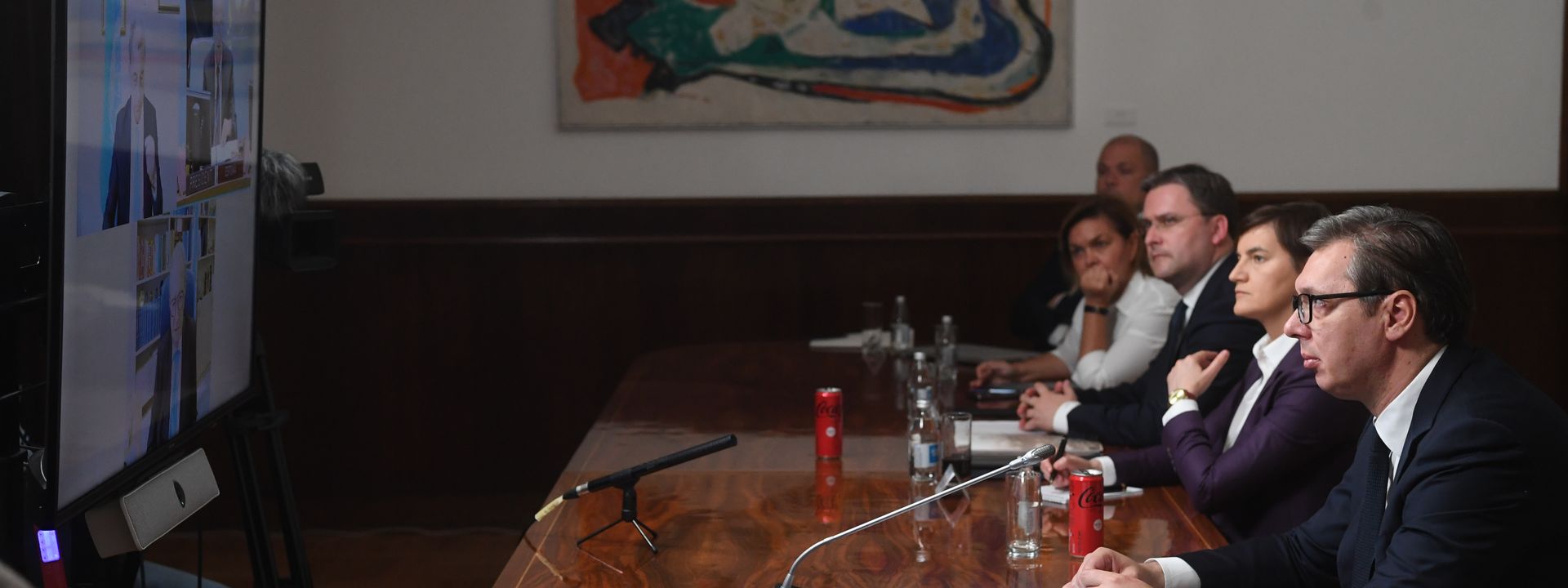
Dear Mr. President, ladies and gentlemen, members of the delegations
I would point to a few ongoing issues in my speech that refer to the competences of the Mechanism, namely, the possibility of serving the sentences passed by the ICTY and Mechanism in the Republic of Serbia, with the current practice of disabling early release of the sentenced persons as well as obligation of the Mechanism regarding protection of sentenced persons.
The second part of the speech will be dedicated to issues that are opened by the six –month Report on the work of the Mechanism by Mechanism President Mr. Agius and Report by the Chief Prosecutor Mr. Serge Brammertz, especially regarding current cooperation of the Republic of Serbia and the Mechanism.
The third part of my speech, and I noticed that in many of your statements even today, is going to be the view of Serbia on everything that took place in The Hague Tribunal and what the Tribunal verdicts brought to people in the region of former Yugoslavia.
The Republic of Serbia has initiated before the Security Council, on several occasions, the issue of possibility of serving sentences passed by the ICTY and Mechanism in the Republic of Serbia. Beside the efforts to move this issue from “square one”, not a single response was obtained from the Security Council. The majority of persons that are serving their prison sentences are citizens of the Republic of Serbia, and it comes naturally that the Republic of Serbia is interested in enabling them to serve their prison sentences in the Republic of Serbia.
ICTY and the Mechanism are making references to the Security Council as an institution in charge of dealing with this issue.
I am ready to reiterate here the readiness of the Republic of Serbia to take over obligations and liability for executing prison sentences that the Tribunal or Mechanism passed on the citizens of the Republic of Serbia, under the monitoring of the Mechanism and full respect for the authority of the Mechanism regarding early release.
Mr. President
A particular problem that we are facing with is disturbance by the judicial institutions established in the territory of Kosovo and Metohija, which is within Serbia and which is under Interim Administration of the UN. We are witnesses of attempts of retrial for two citizens that are serving their prison sentences for which they had already been trialed before the ICTY. More concretely, in previous period there was an attempt for hearing of Nebojša Pavković and for obtaining extradition of Vlastimir Đorđević.
I urge on the Mechanism and Security Council to prevent attempts of violation of the principle ne bis in idem, a civilization principle that was confirmed in Article 7 (1) of the Statute of the Mechanism and to disable retrials for persons already convicted by the ICTY, particularly to make sure that it is not done in the territory which is under interim UN administration.
Mr. President,
President of the Mechanism (Mr. Carmel Agius), apart from the regular Report, delivered also on 11 May 2021 a letter to the President of the Security Council, whose subject is the alleged omission of the Republic of Serbia to apprehend and turn over to the Mechanism Petar Jojić and Vjerica Radeta, indicted of contempt of court, claiming that in this way the Republic of Serbia was acting contrary to its obligations towards the UNSC Resolution 1966 (2010) and asking the Security Council to take measures in order to ensure that Serbia meets the alleged obligations in accordance with the Mechanism Statue and Resolution 1966.
The point of the argumentation of the President of the Mechanism comes to that that the Republic of Serbia has the obligation to deprive of liberty and extradite to the Mechanism its citizens accused of contempt of court, regardless of the nature of accusation, circumstances under which such an order was made and consequences that might result from its implementation.
It is about accusations that do not refer to sever violations of international humanitarian law and that are related to a case before the ICTY, which ended in 2018 (Vojislav Šešelj case), by acquitting the defendant in the first instance, and upon the Prosecutor’s complaint the defendant was declared guilty and sentenced to a 10-year imprisonment, which was covered by the time he spent at the UN Detention Unit.
Judge Agius states that Serbia ignores its obligations in accordance with the Resolution 1966 (2010). Quite the opposite- the Republic of Serbia takes seriously its obligations regarding cooperation with the Mechanism. After the warrant for apprehension and extradition of the two persons accused of contempt of court to the Mechanism had been introduced, the Higher Court in Belgrade established that assumptions for their apprehension and extradition to the Mechanism had not been met. The decision is founded on the rules of international law and domestic law of the Republic of Serbia and it is mandatory for holders of the executive power in the Republic of Serbia.
I would remind here that the first decision of a sole judge (Aydin Sefa Akay, 12 June 2018), that was acting in this case was that the criminal prosecution of V. Radeta and P. Jojić for alleged contempt of court was to be forwarded to the judicial authorities of the Republic of Serbia. In procedures that followed, the argument of the alleged unwillingness of the witnesses to cooperate with the judicial authorities of the Republic of Serbia was stated for the first time, and the decision on deprivation of transferring the case to the jurisdiction of the judicial authorities of the Republic of Serbia was based on the respective argument.
The Republic of Serbia expressed its readiness to take over the court procedure against Petar Jojić and Vjerica Radeta on several occasions and it provided appropriate guarantees. Additionally, the Republic of Serbia fully recognizes and accepts the obligation of the Mechanism to monitor trials that were transferred to national courts with the help of international and regional organizations, as well as to take measures envisaged by Article 6 of the Statute of the Mechanism.
I would remind here that the Republic of Serbia extradited to the tribunal all the persons indicted by the Prosecutor’s Office, and among the respective mostly highest political, military and police officials; it enabled presence of vast number of witnesses, delivered extensive documentation. Obligation of the Mechanism, in accordance with the Resolution of this Security Council, is to take measures that enable transfer of cases to national justice system. In previous practice, 13 cases were transferred to Bosnia and Herzegovina, 2 to Croatia and only one to Serbia.
The last but not the least, I want to remind all of you here of the fact that France- of course as a sovereign and independent country- upon request for apprehension and extradition of Florence Altman for publishing documents and contempt of court, refused the request for extradition, with an explanation that it does not extradite its citizens. For far smaller offence you ask as to extradite our citizens Jojic and Radeta, showing both the distrust to Serbian justice and judiciary and Serbian State, as well as a fact that the rule from ancient Rome is still valid – quod licet lovi non licet bovi.
It does not harm to underline that high-level officers and politicians were not trialed for crimes against Serbs, and that crimes against Serbs remained unsanctioned before ICTY and Mechanism. Let me remind you, just as an example that Ademi and Norac case for ferocious crimes against Serb civilians in Medački Džep was left to Croatian justice institutions. Proven crimes against Serbs, like those of Ramuš Haradinaj, Naser Orić, then Ante Gotovina and other indicted for military operation “Storm” that led to a complete ethnic cleansing of Serb population in the big part of today’s Croatia, resulted before the ICTY in acquittals. Many horrible crimes against Serb civilians that were committed in the territory of Bosnia and Herzegovina, Croatia and the Autonomous Province of Kosovo and Metohija, and that resulted in ethnic cleansing, simply were not the subject of interest of the ICTY.
What’s very important and not to leave anything unclear, Serbia is a country that condemns all crimes and all criminals who perpetrated them in the region of former Yugoslavia. However, it is interesting that despite often criticism Serbia is the only one that speaks openly and condemns crimes perpetrated by Serb nationals, while in other regional countries they do not speak at all about crimes that representatives of those nations committed against members of Serbian people.
And I want to emphasize once again here in front of you that Serbia condemns terrible crime in Srebrenica and extends its deepest condolences to the families of all killed in that massacre. And there are no “buts” about the respective.
Nevertheless, we are here to analyze results and penal policy of ICTY and the Mechanism and it was such that it has never gained trust among Serbian people, no matter where they live. And not because we Serbs do not acknowledge crime committed by some of our compatriots, but because The Hague Tribunal, with exceptions, was judging only to Serbs and in all three territories of former Yugoslavia- Croatia, Bosnia and Herzegovina and Kosovo and Metohija, which some of the SC Member States see and name of course, contrary to law and legal norms and UN Resolutions, as an independent state. I would try to plastically prove to you how The Hague justice was tailored even though I know that it will not come to understanding of many of you, but to me it is important because of the history, facts, and school books that will be made in accordance with the facts.
Namely, Serbs were sentenced to totally 1138 years of imprisonment, and to 8 life imprisonments. At the same time, The Hague Tribunal did not sentence a single Croat for crimes against Serbs, neither in actions Medački Džep, nor Flash and Storm. How politically cunning it was done in the Tribunal, and all wrapped in the form of law and justice. Prosecutors of The Hague Tribunal chose on purpose three military and political leaders of Croats, Bosniac Muslims and Albanians, on all three mentioned territories, committed against Serbs. – Ante Gotovina, Naser Orić and Ramuš Haradinaj. It is interesting that following the same pattern, the same pattern, this injustice was shared. Namely, all of them were sentenced in the first instance procedure, with the exception of Ramuš Haradinaj, because not a single witness survived. Gotovina was sentenced to 24 years’ imprisonment in first-instance procedure, while by a mysterious decision of the second instance council and 3:2 judge ratio, the verdict was changed to acquittal. Naser Orić, for crimes against Serbs, was also sentenced in first instance verdict, but by a mysterious decision of the second instance court, and again 3:2 ratio decision was an acquittal and he was set free of any liability. Let me reiterate, all witnesses in process against Ramus Haradinaj, either committed suicide or were killed under very, very strange circumstances.
Let me conclude, I do not want to believe that someone wants to say that there had been no crimes against Serbs, but judging by the verdicts of The Hague Tribunal, no one- absolutely no one- is responsible for those crimes.
Nevertheless, we in Serbia will show responsibility and we will fight for peace, stability and reconciliation in the region.
We ask UN Security Council Member States to help us with rational and pragmatic approach and respect for international law and not by attempts of further humiliation of Serbia. Serbia is a small country, with proud and courageous people, the one that gave the biggest sacrifice during the WWI and WWII; people who wants to leave in peace with their neighbors. And when I am asking you for this, I do not think I am asking for too much.
At the very end, Serbia is the fastest growing country of the Western Balkans region and we cannot progress unless our relations with neighbors, friends and other countries are good, solid and better. That is why- despite the selective justice that was applied in The Hague Tribunal- we will be open for any dialogue, any kind of cooperation and we will look towards the future and not towards the past. And I have only one message for the citizens of Serbia and citizens of Serbian nationality in the entire region- keep your heads up, neither Serbia nor Serbian people are convicted of anything and it is up to us to work even more diligently, to open factories and to fight for our children and our future.
Long Live Serbia!
|
|
|
| INFORMATION ON VACCINATION AGAINST CORONAVIRUS IN SERBIA (updated: 4 JUNE 2021) |
|
Vaccination (immunization) in Serbia began on 24 December (earlier than in the majority of European countries). Prime Minister Ana Brnabic received the first vaccine. She was also the first Prime Minister in Europe to receive the vaccine shot.
Serbia was the third country in Europe, after Britain and Switzerland, to start the vaccination. In Serbia, mass vaccination of the population in the fight against Covid-19 launched on 19 January.
Medical staff was the first to receive the vaccine, the immunization of geriatric centres' patrons followed, and the vaccines were then administered to the personnel of the Ministry of the Interior, Serbian Army and other security services, media representatives and others.
In Serbia, citizens express interest to be vaccinated against Covid-19 through the e-Government portal or by phone - via the contact center, upon which they receive a message with the date and time of vaccination appointment.
The Serbian Government informed that it enabled registering for vaccination against coronavirus via Viber app, starting 6 April, which is available through the official info service of the Serbian Government launched on Viber.
As of 9 April, all local governments will start arranging open vaccination posts where citizens will be able to get vaccine shots without prior registration, while the immunization of citizens who registered via e-Government portal or the Viber app will also be carried out at the same time.
Between 10,000 and 15,000 citizens apply for vaccination daily through the e-Government portal.
Citizens are able choose the vaccine they wish to receive, and the following are available: Pfizer-BioNTech, Chinese Sinopharm, Russian Sputnik V and AstraZeneca.
Serbia is one of the few countries that has four vaccines at its disposal.
According to the data, 70 percent of those vaccinated received the Sinopharm vaccine (more than a million citizens), 12 percent received the Pfizer vaccine, 9 percent Sputnik V and 9 percent the AstraZeneca vaccine.
The elderly are constantly pleaded with and invited to apply for the vaccine if they have not already, considering that citizens over 70 years of age are a priority. At the same time, citizens of all ages are invited to register and get vaccinated, since immunization has also begun of those who are not in the priority groups. Medical workers have also been vaccinating residents of smaller and rural areas, who have not registered via e-Government.
The importance of vaccination is constantly emphasized, as well as the fact that it is the only solution in the fight against the Covid-19 virus.
* On 26 April - Director of the Office for e-Government Mihailo Jovanovic said that from tomorrow, vaccination without making an appointment will be possible at all vaccination posts throughout Serbia, with three vaccines available - Pfizer, Sputnik V and Sinopharm.
*There are more than 222 vaccination posts in Serbia, where citizens can appear without an appointment and be vaccinated with any of the four types of vaccine.
*On 6 May - The Government of the Republic of Serbia adopted the Decree on Incentive Measures for Immunization and Prevention and Suppression of the Infectious Disease COVID-19, in order to additionally motivate citizens to get vaccinated and thus achieve collective immunity sooner, which aims to suppress the epidemic, restore basic functions of the health care system and open the economy.
Additional financial support in the amount of RSD 3,000 is planned for all citizens of Serbia who have been vaccinated so far and all those who will receive at least the first dose of the vaccine by 31 May.
As of 12 May, all citizens of Serbia can download the digital green certificate, i.e. the certificate on the vaccination against Covid-19 and the results of various tests for this infectious disease.
The digital green certificate, in addition to personal data - name, surname, personal identity number, gender and passport number, also contains data on whether the person has been vaccinated, the number of doses received, as well as the date of receipt of the first and second dose. Also, this certificate contains the results of PCR, antigen and serological tests, and in order to obtain that certificate it is necessary for citizens to be registered on the eGovernment portal.
*From 3 to 15 June, citizens older than the age of 16 who received at least one dose of the vaccine by 31 May are able to register on the website of the Treasury Administration and receive 3,000 dinars.
According to the latest data, 4.730.000 doses of vaccines were administered in Serbia 2.583.000 received the first dose, while 2.147.000 received both doses.
In percentage terms, 46 percent of the adult population received one dose, while about 35 percent were revaccinated.
Currently, we have enough vaccines in Serbia to immunize 3,115,000 citizens. It is expected that by the end of June, 50 percent of the population will be revaccinated, that is, around 2,800,000 adult citizens of Serbia.
25,000 citizens are vaccinated in Serbia every day.
Belgrade, Nis, Uzice are at the top of the list, according to the number of vaccinated adult citizens.
* Example of Belgrade - 712.923 people were vaccinated, which is 51.2 percent of the adult population, and 616.868 people were revaccinated, which is 44.3 percent of the adult population. In the population between the ages of 65 and 74, 80.4 percent of people have been vaccinated. A total of 1.329.791 doses of vaccines were administered in Belgrade.
*On April 6, President Vucic was vaccinated in Rudna Glava, receiving the Chinese Sinopharm vaccine.
On Thursday, 8 April, Serbia broke its own record for the number of persons vaccinated, when more than 75,000 people were vaccinated. This is a result that, in proportion to the number of citizens, even the most developed countries in Europe and the world cannot take pride in.
PROCUREMENT OF VACCINES
*On 22 December, the first quantities of Pfizer-BioNTech vaccine were delivered to Serbia. Serbia is the second country in Europe, after Great Britain, to receive the Pfizer vaccine.
*On 16 January, one million doses of the Chinese Sinopharm vaccine arrived.
*On 29 January, 40,000 million doses of the Russian Sputnik V vaccine arrived.
*On 9 February, a new consignment of 50,000 Sputnik V vaccines arrived from Russia.
*On 11 February, Russian experts arrived in Serbia and discussed with Serbian experts how to start the production of Russian vaccines in Serbia as soon as possible. They visited the Torlak Institute in order to assess the technological and personnel capacities of the Institute for the production of the Sputnik V vaccine.
President Vucic announced that our country will invest in new plants, new equipment that would meet all standards, with the goal of producing the vaccine in our country. The Sputnik V vaccine would be distributed to the region from our country, but also to European countries.
* On 10 February, another batch of 500,000 Chinese Sinopharm vaccines arrived in Serbia.
* On 15 February, 40,950 doses of the Pfizer-BioNTech company vaccine against coronavirus arrived in Serbia.
*On 21 February, 150,000 AstraZeneca vaccines arrived in Serbia, which have been available at every vaccination post since 23 February. Serbia was the first country in the Balkans to have this vaccine at that point in time.
*On 22 February, 46,800 more Pfizer vaccines arrived in Serbia.
*On 22 February, 50,000 more Sputnik V vaccines were delivered.
*On 28 February, a new consignment of 100,000 doses of the Sputnik V vaccine arrived (this was a delivery of the second dose of the vaccine - for revaccination), since the first and second doses have a different composition.
*On 1 March, a delivery of 58,500 Pfizer-BioNTech vaccines arrived.
*On 4 March - during his official visit to Berlin, Minister of Foreign Affairs Nikola Selakovic said that German Foreign Minister Heiko Maas informed him that Serbia would soon receive 300,000 vaccines from the COVAX program (the first doses arrived on 2 April).
* On 5 March, 500,000 more Sinopharm vaccines were delivered.
*On 8 March, 28,080 doses of vaccines by Pfizer- BioNTech company arrived.
*On 11 March – Minister Popovic announced that the production of the Russian Sputnik V vaccine at the Torlak Institute will begin in May, and that Serbia will thus become the first country in the territory of Europe where this vaccine is produced.
The first phase of production of the Russian vaccine in Serbia implies transport of the substance, filling of bottles in accordance with the highest technological standards, packaging and distribution of vaccines in our country and region, and after the establishment of the first phase of production, the preparation of a feasibility study will begin on production in the so-called full cycle, which includes the production of the substance in Serbia. This will require the procurement of complex technological equipment and the expansion of Torlak's production capacities, but estimates are that full-cycle production could begin by the end of this year.
*On 11 March – during his visit to the UAE, Serbian President Aleksandar Vucic announced that it had been agreed that, together with the United Arab Emirates and China, a vaccine against the coronavirus of the Chinese company Sinopharm would be produced in Serbia. President Vucic pointed out that, in addition to the timetable made with the competent Russian minister for the production of the Russian vaccine at Torlak, it was agreed that the factory for the Sinopharm vaccine would be completed and start production from 15 October.
*On 15 March - A delivery of 16,380 doses of Pfizer-BioNTech vaccine arrived.
*On 18 March - President Aleksandar Vucic talked via video link with the management of Sinopharm company about the process of procuring vaccines, building a factory of Chinese vaccines in Serbia and building and equipping Serbian hospitals. An agreement on the purchase of another two million doses of Sinopharm vaccines was signed at the meeting.
* On 18 March - President Vucic announced that Serbia will have two vaccine factories and will produce between 30 and 40 million doses a year. The President had talks with the representatives of Sinopharm, while Minister Nenad Popovic discussed the production of the Sputnik V vaccine. (He stated that he expected that in less than a year, the liquid for the vaccine would be produced, and not just packaged.)
*On 22 March - 55,990 doses of Pfizer-BioNTech vaccine were delivered.
*On 23 March - 100,000 doses of the first component of the Sputnik V vaccine arrived in Serbia.
*On 25 March - The Russian Direct Investment Fund and the Institute of Virology, Vaccines and Sera “Torlak” announced that an agreement has been reached on the production of the Sputnik V vaccine in Serbia. This will make our country the first state in Southern Europe to produce Sputnik V, and the vaccine could be exported to other countries in the region at later stages. The production of the vaccine will start by May at Torlak.
*On 29 March - 23,570 doses of Pfizer-BioNTech vaccine arrived.
Serbia paid EUR 4.8 million in advance to the COVAX system, and we donated EUR 2 million for the development of the vaccine through the European Commission. Since no vaccines from the COVAX programme were delivered to Serbia, Serbia procured them bilaterally.
*On 2 April, the first consignment of 57,600 AstraZeneca vaccines arrived through the COVAX mechanism.
*On 5 April, half a million Sinopharm vaccines arrived.
The Prime Minister stated that 2.5 million vaccines were delivered to Serbia from China alone, and that a little less than a million of vaccines were delivered by all other manufacturers.
*On 5 April - The Torlak Institute signed a Technology Transfer Agreement with the Russian Direct Investment Fund and the Russian pharmaceutical company Generium, under which the Russian side will transmit to the Serbian side data on procedures and technologies required for the production of the Sputnik V vaccine in Serbia.
Minister Nenad Popovic announced that three validation series of the Sputnik V vaccine would be produced in April, and that samples from these validation series would be sent for quality control to the Gamaleya Institute, and after the institute confirms the validity of samples produced at Torlak, our institute would start the production of the vaccine. This is expected to materialize by 20 May this year, and in that way Serbia will become the first country in Europe to produce the Sputnik V vaccine.
*On 6 April, 106,420 vaccines manufactured by Pfizer-BioNTech were delivered.
With that delivery, Serbia procured a total of 3.5 million vaccines, paid for all the vaccines, as well as all that we received from the COVAX system.
*On 12 April - 106,470 doses of Pfizer-BioNTech vaccine arrived.
*14 April – The first series of control doses of the Sputnik V vaccine was filled at Torlak. The vaccines produced at Torlak will be released in June this year.
*15 April – President Vucic announced that another 211,000 Pfizer vaccines would arrive on Monday, 19 April, as well as that 50,000 doses of the second component of the Russian vaccine arrived on 14 April, and that on 16 April another batch of same quantity was expected, as are another 100,000 doses of the Sputnik V first component on Monday or Tuesday. Chinese Sinopharm vaccines are also expected by the end of this month.
*19 April - 211,000 doses of the Pfizer vaccine arrived in Serbia, which is the largest single delivery of that vaccine to our country so far.
* On 23 April – President Vucic said that we have enough vaccines and that vaccination in the region is important. He said that Serbia received the largest number of vaccines against the coronavirus from the Chinese company Sinopharm and then from the Pfizer-BioNTech company, that he expected 36,000 vaccines from the EU, and stressed that it was important for Serbia that citizens in the region were also vaccinated.
"Out of the planned 96,000 vaccines from COVAX, we have so far received 57,000. From the EU out of the total quota of 630,000 doses that should arrive by the end of June, Serbia should receive about 270,000 or 260,000 in proportion to the population, and we will receive only 36,000 vaccines", Vucic stated.
He added that Serbia agreed with that because those vaccines were more important to other parts of our region.
„We believe that as important those vaccines are for us, they are equally important for our neighbours. Everything we have been doing is meaningless if they cannot get the vaccine. People who come to Belgrade and have sports, business and other contacts, it is important for us that they cannot transmit the infection", Vucic stated.
He thanked the EU and COVAX, but noted that Serbia received the most vaccines from Sinopharm, and then from Pfizer-BioNTech.
As he said, Serbia received a significantly higher number of vaccines from the US-German company, by as many as 250,000 doses more than the Russian vaccine.
He pointed out that Serbia was the only country outside the EU that started vaccination with the Pfizer vaccine at the same time as the EU and that, when it comes to the delivery of vaccines, vaccines from Sinopharm and Pfizer-BioNTech companies arrived on time, and deliveries of some other manufacturers were late.
Vucic added that Serbia would continue the vaccination, as well as that it managed to provide vaccines through hard work.
*On 26 April - A new batch of 500,000 Chinese Sinopharm vaccines against coronavirus arrived in Serbia.
*On 5 May - 104.130 doses of the Pfizer vaccine arrived in Serbia
* 10. May - 104,130 doses of Pfizer-BioNTech vaccine were delivered
* 10. May - 20,000 doses of Sputnik V vaccine were delivered
* 12. May - 120,000 doses of AstraZeneca vaccine from Covax program were delivered
* 17. May - 104,130 doses of Pfizer-BioNTek vaccine were delivered
* 19. May - 440,000 doses of "Sinofarm" vaccine were delivered
* 19. May - The Russian Gamaleya Research Institute of Epidemiology and Microbiology confirmed the quality of the vaccine produced at Torlak and approved the future production of the "Sputnik V" vaccine at this institute.
* 22. May - 266,000 doses of Sinofarm delivered
* 24. May - 104,130 doses of Pfizer-BioNTek vaccine arrive
* 27. May - 500,000 vaccines "Sinofarm" vaccine delivered
A total of 4.2 million doses of Sinofarm vaccine were delivered, and yesterday's delivery was the last delivery of Sinofarm under contract.
Four million doses of vaccine have been purchased from China and delivered by eight flights since January, and the Chinese Army has donated another 200,000 doses of that vaccine.
Since the beginning of the pandemic, 58 planes have arrived in Serbia, which received medical equipment donated by China and local companies, and, in addition, three more freight trains delivered everything that Serbia bought from that country during the pandemic.
*On 3 June - a plane from Russia with components for the Russian vaccine landed in Belgrade. Production of the Sputnik V vaccine will begin today, on 4 June, at Torlak. The vaccines produced in Serbia could appear at vaccination posts in as little as ten days, as Serbia becomes the first country in Europe to produce that vaccine.
VACCINE DONATIONS TO COUNTRIES IN THE REGION AND VACCINATION OF FOREIGNERS
*On 14 February - President Vucic handed over the first batch of 4,680 Pfizer vaccines to Prime Minister of North Macedonia Zoran Zaev, while on 24 February, Minister Loncar handed over another 3,510 doses of Pfizer vaccine to the Macedonian Minister of Health.
*On 17 February - Serbia donated 2,000 Sputnik V vaccines to Montenegro.
*Approximately 5,000 health care workers from the Republic of Srpska have been vaccinated in Serbia so far, and our country will make the vaccination information system available to the Republic of Srpska so that they can use it when they have enough vaccines.
*On 2 March – Serbian President Aleksandar Vucic handed over to the Chairman and Members of the Presidency of Bosnia and Herzegovina a batch of 5,000 AstraZeneca company vaccines donated by Serbia to Bosnia and Herzegovina, while on 12 March, another 5,000 doses of AstraZeneca vaccine were delivered from Serbia.
* On 15 March – all employees of the Constitutional Court of Bosnia and Herzegovina were vaccinated at a hospital in Uzice, at the request of that court, in cooperation with the Constitutional Court of Serbia, the Ministry of Health, the Ministry of Foreign Affairs and the Serbian Embassy in Sarajevo.
*On 23 March - vaccination of 105 journalists from North Macedonia began at the Public Health Institute in Vranje. AstraZeneca vaccines for Macedonian journalists were provided at the request of the Macedonian Association of Journalists in cooperation with the Journalists' Association of Serbia, and with the support of the Office of the Serbian President.
*On 23 March - President Aleksandar Vucic handed over ventilators and other medical equipment for the Republic of Srpska. The donation was received by Chairman of the Presidency of Bosnia and Herzegovina Milorad Dodik.
*On 24 March - The Chamber of Commerce and Industry of Serbia (PKS) announced that, in cooperation with the Serbian Government, 10,000 vaccines were provided for businessmen from the region and their employees.
*On 29 March - The President of the Chamber of Commerce and Industry of Serbia announced that 8,500 businessmen from the region were vaccinated in Serbia over the weekend (on 27 and 28 March).
*Serbia donated a total of 40,000 doses of the Sputnik V vaccine to North Macedonia, the first batch of 20,000 vaccines for the first dose arrived on 1 April, and it was announced that the revaccination doses would arrive in the following period.
39,000 foreign nationals were vaccinated (using AstraZeneca vaccine), who arrived either at the invitation of the Serbian Chamber of Commerce or registered on their own via the e-Government portal. Prime Minister Brnabic stated that the vaccination of people from the region was a huge success and assessed that this was a way to raise common security, because if people in the region were not safe, people in Serbia were not safe either. The most numerous were citizens of Bosnia and Herzegovina, North Macedonia and Montenegro
*On 8 April - The Prime Minister stated that Serbia was currently focused on vaccinating its citizens, but that we would endeavour to help friends and neighbours in the fight against coronavirus through vaccine donations.
Around 53,000 foreign nationals who do not have a registered residence in Serbia have applied for vaccination in Serbia, by registering for vaccination via the e-Government portal. Foreign nationals are currently not being vaccinated, but Serbian citizens only, and once they have been vaccinated the option of vaccinating registered foreign nationals will be considered. Vaccination is free in Serbia, and the same applies to foreign nationals who get a vaccine shot in our country.
Advertisements for vaccination through agencies have appeared on social media and the internet, however, it is not possible to make a vaccination appointment in Serbia through any foreign or domestic travel agency, and these are internet frauds.
*On 8 April - The Government has decided to send a donation of 20,000 doses of AstraZeneca vaccine to the Canton of Sarajevo.
*On 9 April - 29 journalists from the Sarajevo Canton Television were vaccinated in Novi Pazar.
On 10 April - Chairman of the Presidency of Bosnia and Herzegovina Milorad Dodik stated that he had agreed with the Serbian President that around 20,000 vaccines would be delivered from Serbia to the Republic of Srpska early next week.
*On 23 April – President Vucic said that Serbia had sent 120,000 vaccines to the region so far, as well as that about 65,000 citizens from the countries of the region were vaccinated in Serbia, which made up a total of about 200,000 vaccines for the people in the region.
* The Returning Point programme for establishing ties with the Serbian diaspora, with the support of the Office for Information Technologies and eGovernment of the Government of the Republic of Serbia, ensured a special date for vaccination of Serbian citizens from the diaspora.
Serbian citizens living abroad will be able to be vaccinated on 15 May in Belgrade, and applications for immunization are available on the website of the Returning Point association https://tackapovratka.rs/poziv-za-vakcinaciju-dijaspore/. The applications were open until Friday, 30 April, 11:59 PM, and everyone who applied will receive a confirmation of the vaccination date as well as the exact time when they should appear at the Belgrade Fair.
Serbian citizens from the diaspora will be able to choose among the Pfizer, Sinopharm and Sputnik V vaccines, while they will receive the second dose at the Belgrade Fair on 5 June. The call is only applicable to Serbian citizens living abroad.
*On 31 May, Prime Minister Brnabic and the Czech Ambassador saw off a shipment of vaccines at the Nikola Tesla Airport.
*On 3 June – The Serbian Government adopted a decision enabling the citizens of Bosnia and Herzegovina to be vaccinated in Serbia at any location and at any time, free of charge, and receive a vaccination certificate. The Serbian President requested from the Government to enable free vaccination for the citizens of North Macedonia as well.
NOTE:
Due to the noticeable increased interest and a large number of inquiries made to our diplomatic and consular missions regarding vaccination of foreign nationals in Serbia (without a registered permanent residence in our country), but also the arrival of foreign nationals on their own initiative to be vaccinated in Serbia, it is important, in such situations to unequivocally communicate the following in receiving countries, through the media and in direct contact with interested parties:
"Vaccination of foreign nationals, primarily from the region, is a huge success for Serbia. This is a way to raise common security, because without safe people in the region, people in Serbia are not safe either. Most of the foreign citizens who were vaccinated in Serbia came from Bosnia and Herzegovina, North Macedonia and Montenegro.
In recent days, due to great publicity in the media around the world and the well-organized process of procurement of vaccines and immunization in Serbia, there is a great interest in being vaccinated in our country, not only from the region but also from a large part of Western and Central Europe. A large number of inquiries has also been recorded for "vaccine tourism", both of citizens from those parts of Europe, and of tour operators, travel agencies and airlines.
Serbia is currently focused on vaccinating its citizens, but we will endeavour to help our friends and neighbours in the fight against coronavirus, in the period ahead as well, through vaccine donations.
In recent days, the interest of the domestic population in vaccination has increased, and Serbia is making daily records in vaccinating its own population.
Should the possibility arise in the period ahead for vaccination of interested foreign nationals (without a registered permanent residence in Serbia), Serbia will be very pleased and, to the extent of its capacities, endeavour to accommodate such requests as well. In that case, we will inform the public in a timely manner. But we must note that this is not possible at this moment.
Foreign citizens are able express interest in being vaccinated in Serbia via the eGovernment portal, but it is important to note that this is not enough and that it is necessary to receive a confirmation response and an invitation with the date/time and location of vaccination. For this reason it is not advisable that foreign nationals, having only expressed interest through the eGovernment portal or even without doing so (since there have been such examples at vaccination posts), come to Serbia on their own initiative to be vaccinated and thus expose themselves to unpleasant situations and costs."
VACCINATION OF MEMBERS OF THE DIPLOMATIC CORPS IN SERBIA
The Serbian Government was among the first in the world to enable the immunization of members of the diplomatic corps in Serbia. All four vaccines are available.
Close to 1,300 members of the diplomatic corps, holders of special ID cards (diplomatic, official, consular, etc.), registered and were vaccinated.
*On 13, 18 and 19 February, Sinopharm vaccines were administered. This completed the first round of vaccination. The second round, that is, revaccination with that vaccine, was carried out on 11 and 12 March.
*On 23 February, vaccination with the Pfizer vaccine began. Revaccination using this vaccine was carried out from 16 to 19 March.
Also, vaccination with Sputnik V and AstraZeneca started.
*On 20 March, remaining revaccinations were performed and it was also made possible for members of the diplomatic corps to receive the vaccine, who for certain reasons could not be vaccinated.
VACCINATION OF MIGRANTS
*On 24 March, the vaccination of migrants started in the outpatient clinic of the migrant center in Krnjaca. Around 500 migrants have registered.
Head of UNHCR Office in Serbia Francesca Bonelli pointed out that this UN agency was deeply grateful to the Serbian authorities for including the refugees in the vaccination plan.
|
|
|
| Minister Selaković presented the new e-Consulate service |
|
20 May 2021
Minister Selaković presented the new e-Consulate service
A new service of the Ministry of Foreign Affairs "e-Consulate" was presented in Belgrade today, intended for foreign citizens who apply for a visa and aspire to come to Serbia to work. On that occasion, Minister of Foreign Affairs of the Republic of Serbia Nikola Selakovic said that this service was one of the indicators of good development of our country, which, as he pointed out, was becoming a magnet for serious foreign companies, which brought a large number of workers from other countries to work in Serbia. "Not to be pretentious, but completely realistic, this service represents a turning point in the functioning of our system. E-Consulate and digitalization of the procedure for issuing work visas for foreign citizens who want to work in Serbia, is the first electronic service offered by the Foreign Ministry, and I can promise you that this is indeed our first, but by no means the last e-service", Selakovic emphasized. The Head of Serbian diplomacy pointed out that "e-Consulate" reflected the modernization of an extremely important segment of the activities of diplomatic and consular missions of Serbia, and that we were actually talking about something that was essential for the further development processes of our country. The Minister recalled that, when the President of the Republic visited the construction site of the Moravian Corridor, he was told that some construction works were delayed because Bechtel company was not issued work visas on time. “The moment we saw that and heard the President, I alerted the services in the Ministry. We were surprised, as we knew that the issuance of visas in Turkey had a good dynamic, and then we determined that it was actually workers from Bangladesh who applied for a visa through our Embassy in India, where we have a problem with staff shortage”, the Minister explained. As he added, this is a demanding and laborious task, each of our employees had to receive the documentation on paper, check it, then request additional information, and only then forward it. "Today, this has been fantastically perfected for our consular officers, all that documentation is submitted in electronic form. We used to have two filters to check the documentation, now we actually have three. And the work is significantly more efficient", Selakovic pointed out. As he emphasized, this is a service which was promised less than four months ago and it becomes available on Monday, in 95 diplomatic and consular missions of Serbia, i.e. in all our embassies and consulates general. The biggest result of that endeavor, the Minister pointed out, apart from the advantage it would bring in the future work, was the fact that it was not a project of one state body, but a joint endeavor of the Ministry of Foreign Affairs, IT and eGovernment Office, General Secretariat of the Government, Ministry of the Interior, Ministry of Labor, Employment, Veterans and Social Affairs, National Employment Service. “We did an extremely good job in record time. This is to the pride of our Ministry, to the pride of the entire state. I am convinced that in the period ahead, we will further modernize our affairs and make Serbia one of the few countries that has such mechanisms and such state-of-the-art provision of consular services", Selakovic said. Speaking about the "e-Consulate" portal itself, the Minister explained that there is a cartoon of Nikola Tesla and the building of the old railway station with one crane, which actually symbolizes a historical fact - that Tesla was in Belgrade in the year when it was built. "Today it is the place behind which the Belgrade of the future is rising, and what we managed to do together is an indicator of something that is the future of Serbia, the development of artificial intelligence, IT and creating conditions for more people to live and arrive here in Serbia in the future seeking good life and employment", concluded the Minister. The Director of the Office for IT and eGovernment, Mihailo Jovanovic, said that this was the first time that e-services were focused on foreign citizens, which was the case with our citizens so far. In the period from 1 January 2019 to 17 May this year, the most applications for Serbian visas were submitted at the Embassy in Beijing, 6,766 applications, then in New Delhi - 2,973, Shanghai 2,115, Tokyo 1,798, and Cairo 1,756. In that period, 1,270 requests were submitted in Algiers, 1,095 in Jakarta, and 1,077 in Beirut. In terms of their nationality, Serbian D visa for employment is most requested by citizens of China - 9,516 applications, followed by India 1,955, and Ukraine - 673. |
|
|
| President Vučić met via video link with representatives of the IMF delegation |
|
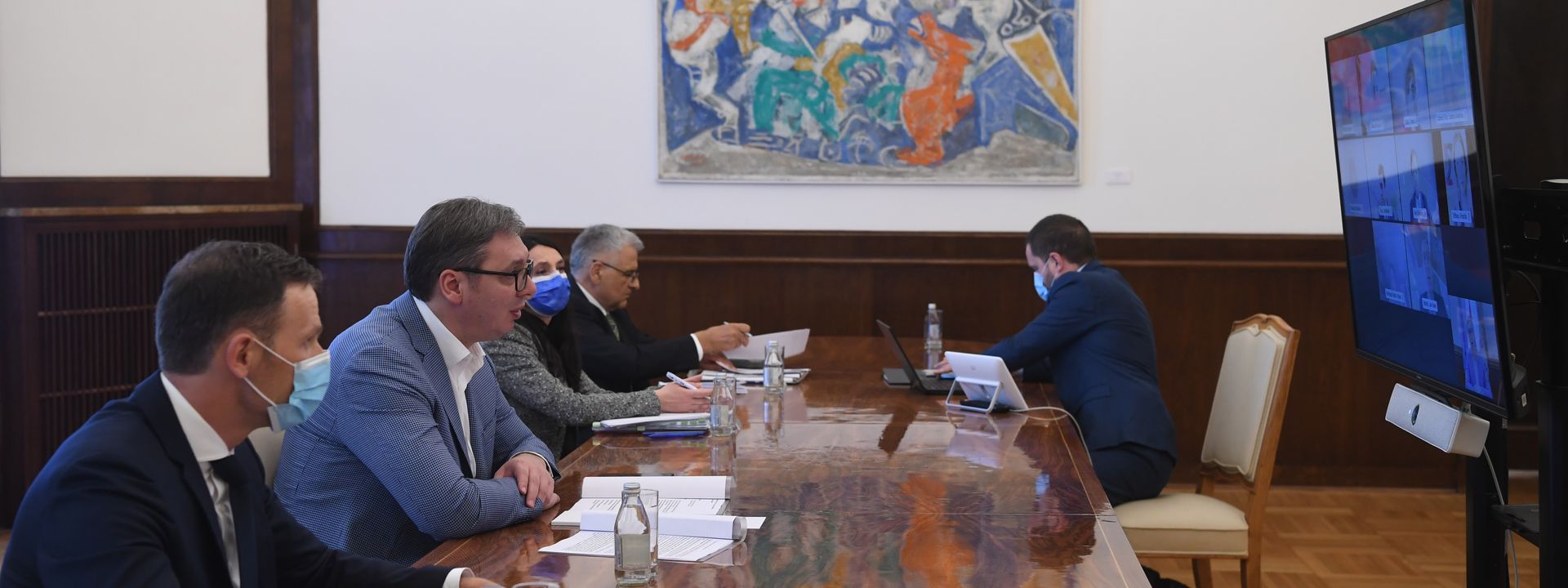 Photo: www.predsednik.rs Photo: www.predsednik.rs
21st April 2021
President of the Republic of Serbia Aleksandar Vučić talked today via a video link with the representatives of the delegation of the International Monetary Fund led by the Head of the Mission, Jan Kees Martijn. The interlocutors concluded that Serbia's main goal remains to preserve the hard-earned reputation of a fiscally secure country, as well as to continue with a responsible fiscal policy so that public debt does not exceed 60 per cent of GDP, whereby Serbia continues to work on further economic growth.
During the conversation, President Vučić and Jan Kees Martijn especially referred to the incentive measures and adopted three packages of measures to help the economy and citizens, which preserved macroeconomic stability and even achieved a higher employment rate. Martijn commended the responsible economic policy of Serbia and the successful crisis management during the pandemic.
"Serbia achieved one of the best results last year despite the challenges of the pandemic", Martijn said, noting that Serbia was one of the few countries to which the IMF did not adjust the initial projection of the 5% growth rate it gave last year.
President Vučić added that following the first quarter of 2021, Serbia is well on its way to achieving the planned growth of 6% as planned, since one of the main focuses of the Government is investing in large infrastructure projects and intensifying work on attracting foreign direct investments.
"In 2020, Serbia was at the very top in terms of economic growth in Europe, and I am convinced that this year we can enter the first three or four countries in terms of growth", said President Vučić, adding that he was satisfied that Serbia still, despite the pandemic situation, has an extremely strong inflow of investment.
President Vučić and Jan Kees Martijn also discussed a new advisory arrangement, which is of special importance in light of the improvement of the general investment climate in Serbia, as well as in the context of even greater investor assurance.
"Given Serbia's tremendous progress over the past eight years, the priority goal of this arrangement will be to preserve the results achieved, but also to provide support for further implementation of structural reforms aimed at even faster, stronger and more sustainable growth", said President Vučić and thanked the IMF and the personal engagement of Jan Kees Martijn in the professional and expert support that Serbia is counting on.
President Vučić pointed out that Serbia will pay special attention to reforms in public companies, and that priorities will continue to be investments in infrastructure, creating an even better climate for investments, greater investments in the environment, science and capital projects, which will further contribute to the long term stable financial growth in the coming years.
Source: www.predsednik.rs
|
|
|
| Meeting with the World Health Organization Regional Director for Europe |
|
20th April 2021
President Vučić thanked Dr Kluge for his personal engagement and support during the current pandemic, especially for technical assistance and expertise. On this occasion, he informed the WHO official about the results of immunisation in Serbia and plans on how to provide the vaccine to all citizens who want to get it.
Dr Kluge congratulated President Vučić on his leadership and personal commitment to provide vaccines. He emphasised that Serbia, with its good immunisation strategy, ranked among the global leaders, thus becoming an example of humanity and solidarity by enabling vaccination of elderly people in rural areas, foreign citizens and donating vaccines to other countries.
"Serbia has accepted the vaccine as a life-saving product and has not looked at it geopolitically", said Dr Kluge.
The two interlocutors agreed that the world should increase production capacities for vaccines, as well as develop new adequate therapies for the fight against COVID-19, and, in this regard, work on increasing the level of citizens' trust in science.
President Vučić informed Dr Kluge about the plans for improving the work of the Institute for Virology, Vaccines and Sera "Torlak".
"We want to make 'Torlak' one of the best vaccine factories in Europe", said President Vučić.
Source: www.predsednik.rs
Photo: www.predsednik.rs
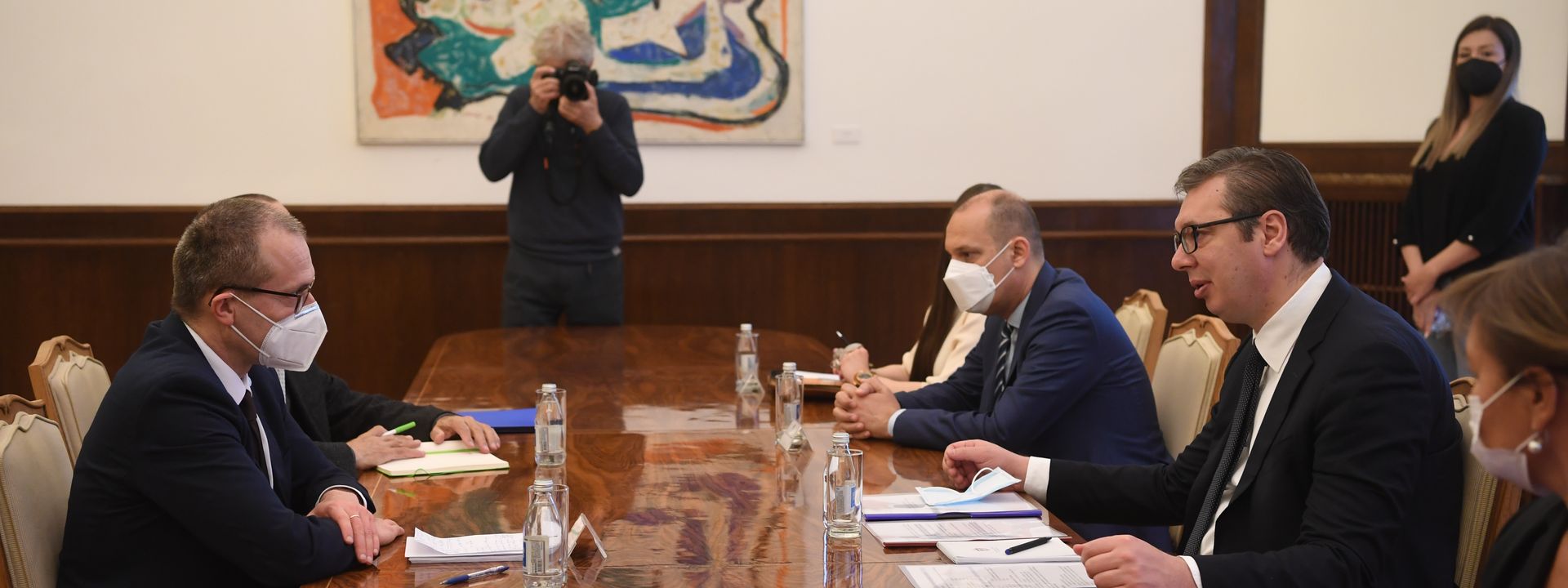 |
|
|
| WHO describes immunisation process in Serbia as impressive |
|
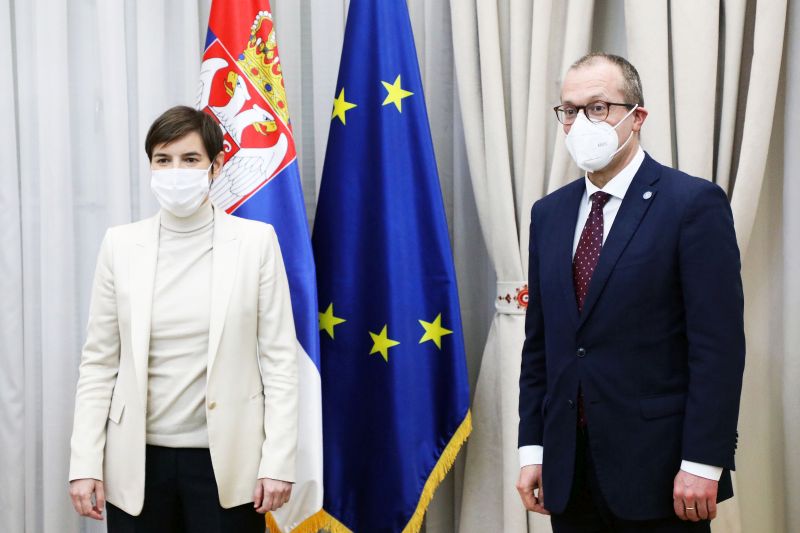 Photo: www.srbija.gov.rs Photo: www.srbija.gov.rs
19 April 2021
Prime Minister Ana Brnabic talked today with World Health Organisation (WHO) Regional Director for Europe Hans Kluge about the epidemiological situation and the course of immunisation of citizens in Serbia.
Brnabic expressed gratitude for the cooperation in the fight against the pandemic, technical assistance and expertise, emphasising that the support of this organisation is very important for our country.
She informed the WHO Regional Director for Europe about the course of immunisation of citizens in Serbia, expressing her belief that, thanks to the large number of vaccinated people, we will be able to create collective immunity and return to normal life.
Kluge assessed the immunisation process in Serbia as impressive, and added that Serbia has made a good decision to offer citizens all available vaccines used in the fight against coronavirus.
Expressing concern over the emergence of new strains of the virus, he stressed the need to speed up the immunisation process and show mutual solidarity.
The WHO Regional Director for Europe praised Serbia for the humanity it has shown by donating vaccines to the countries of the region and enabling vaccination for those who do not have a sufficient number of vaccines for their citizens.
The Prime Minister said that Serbia will continue to cooperate with the countries of the region and help in accordance with its capabilities.
When it comes to the project "Roadmap for Health in the Western Balkans 2021-2025", it was stated that, if epidemiological conditions allow, a regional meeting will be held in Belgrade at the end of the year, important for future improvement of cooperation between countries in the field of health challenges.
Source: www.srbija.gov.rs
|
|
|
| Selaković: L’extrémisme politique des Albanais au Kosovo et Metohija de plus en plus fort |
|
Le 13 avril 2021
Le Ministre des Affaires étrangères de Serbie Nikola Selaković a averti, lors de la session du Conseil de sécurité des Nations Unies, que l’extrémisme politique parmi les Albanais du Kosovo et Metohija ne faiblissait pas, au contraire il devenait de plus en plus fort.
Selaković, à la session où a été discuté le rapport du Secrétaire général de l’ONU sur le travail de la MINUK, a rappelé que l’obligation de former l’Association des municipalités serbes n’a pas été remplie il y a 2.917 jours déjà et qu’en fait le 19 avril sera huit ans depuis l’accord fait à Bruxelles, Priština refusant toujours de remplir son obligation et permettre la mise en place de l’Association des municipalités serbes. |
|
|
| Selaković: Priština persiste à faire sa campagne de haine contre le peuple serbe |
|
Le 13 avril 2021
Le ministre des Affaires étrangères Nikola Selaković a constaté ce soir que Priština persiste à faire sa campagne de haine contre le peuple serbe, ce qui ressort le plus drastiquement en accusations sans arguments de viols massifs et de génocide.
Selaković a souligné, lors de la session du Conseil de sécurité de l’ONU dédiée au rapport du Secrétaire général de l’ONU sur le travail de la MINUK, que les tentatives sont manifestes des institutions intérimaires du Kosovo et Metohija de créer le narratif sur les viols massifs des Albanaises, utilisant à cet effet les méthodes de propagandes et de mensonges.
«Il est clair qu’il y avait des victimes de tous les côtés dans le conflit, et que notre partie dispose de preuves sur nombreuses victimes serbes. Mais la condition préalable pour réaliser la protection des droits de chaque victime individuelle c’est une approche rationnelle et argumentée», a dit Selaković, répondant aux calomnies de la représentante de Priština.
Selaković a relevé que, face aux allégations des politiques de Priština sur 20.000 Albanaises violées, il y a les données de la commission de vérification et reconnaissance de statut de victime de violence sexuelle au Kosovo et Metohija, qui ont des informations sur 912 personnes violées, parmi lesquelles pour autant les femmes serbes victimes de violence ne figurent pas.
«Permettez-moi de souligner que la Serbie condamne tout acte de violence sexuelle aux conflits et s’engage pour la réalisation de la justice pour toutes les victimes. Le nombre de victime certes ne réduit pas l’effet horrible de cet aspect de violence sur chaque victime individuelle, mais en même temps, spéculer avec les nombres n’aide pas la réalisation de la justice et mène à la politisation et au ralentissement du processus de réconciliation», a dit Selaković.
Lorsqu’il s’agit des accusations de génocide, le ministre Selaković a constaté qu’elles prouvaient seulement que Priština persiste à faire la campagne de la haine, la propagande et l’hostilité ouverte envers le peuple serbe.
«Par leurs déclarations quotidiennes ils veulent montrer la Serbie unique coupable pour tout et que le génocide aurait été perpétré contre les Albanais, tout ceci pour dissimuler leur propre responsabilité des crimes commis», a dit le chef de diplomatie serbe.
A ces dires, tout un chacun qui sait ce que la définition du génocide implique, comprendra que ce n’est pas la Serbie qui a fait quelque chose, mais que précisément le peuple serbe est victime du projet «de construction d’Etat» des Albanais du Kosovo, fondé sur la périlleuse idée de territoires ethniquement purs, dont témoignent plus de 200.000 Serbes exilés du Kosovo et Metohija.
«Nous sommes persuadés que le monde civilisé ne sera pas prêt à participer à la dissimulation et au recel de leurs crimes et qu’un signal fort leurs sera adressé qu’ils doivent porter la responsabilité pour leurs actes», a dit Selaković.
Il a rappelé qu’avant 1999 à Priština vivaient environ 40.000 Serbes, mais qu’aujourd’hui ils sont une vingtaine, à Peć vivaient 17.000 Serbes, et aujourd’hui seulement les sœurs serbes y sont du Patriarcat de Peć, à Prizren avant guerre vivaient environ 12.000 Serbes et aujourd’hui seulement 17 familles, tandis qu’à Uroševac sur 10.000 Serbes qui y vivaient avant la guerre, seule la famille du prêtre serbe est restée. |
|
|
| Commémoration du Jour du Souvenir des victimes de l'agression de l'OTAN |
|
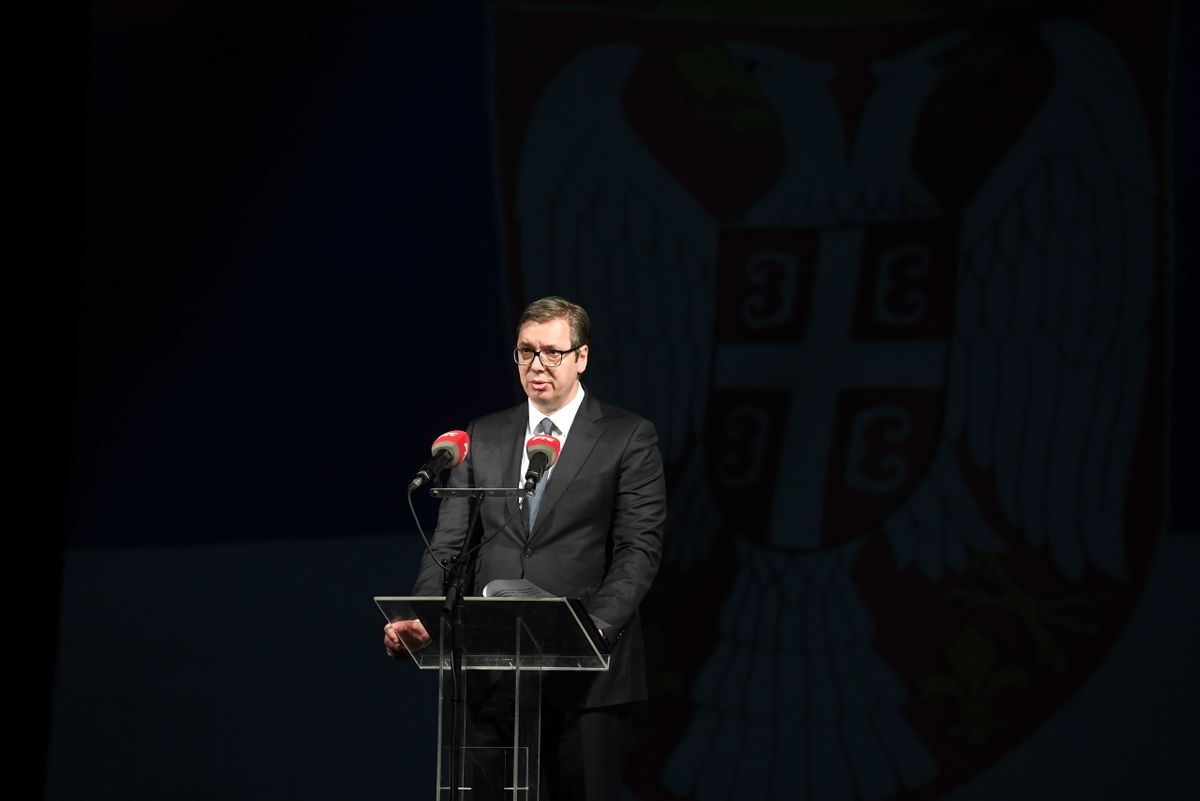
Le Président de la République de Serbie Aleksandar Vučić s'est adressé à l'occasion de la commémoration du Jour du Souvenir des victimes de l'agression de l'OTAN
"Votre Sainteté, Honorable Président de la Présidence de Bosnie-Herzégovine,Honorables Présidents des Assemblées nationales de la République de Serbie et de la République Srpska, Honorables Présidents des gouvernements de la République de Serbie et de la République Srpska, Honorables Ministres des deux gouvernements, Chers invités et amis, représentants du peule serbe du Monténégro, Macédoine du Nord, Croatie, merci d'être ici tous ensemble ce soir encore et parce que le peuple serbe est inébranlable et invincible.
Un enfant par jour et un peu plus. C'est le chiffre le plus lourd, le plus difficile et le plus douloureux de l'agression de l'OTAN de 1999. Tués, stoppés, innocents, ils n'avaient commis aucun crime, sans droit à la défense, sans droit à la justice, sans droit à la vie.
Personne n'a jamais été tenu responsable pour ce crime, crime plus grand que le crime. Personne pour 2500 civiles tués, mais aussi des militaires et des policiers coupables seulement d'avoir gardé, protégé eux-mêmes et leurs foyers. Personne n'a jamais été tenu responsable pour plus de 6000 blessés.
Ce n'est pas possible de l'expliquer même aujourd'hui, 22 ans après l'agression, il n'y a pas, malgré les efforts, de justification universelle, pas de raison, pas de sens, il ne reste que des noms en guise du péché éternel.
Miljana Milić, quinze ans
Vladimir Milić, douze ans
Miomir Mladenović, quatorze ans
Dragan Dimić, trois ans
Julijana Brudar, dix ans
Olivera Maksimović, douze ans
Miroslav Knežević, treize ans
Dajana Pavlović, cinq ans
Stevan Pavlović, huit ans
Marko Simić, deux ans
Milica Rakić, trois ans
Ivan Ivančić, sept ans
Marko Ivanović, trois ans...
|
|
|
| La Serbie vouée à une coopération plus dynamique avec l'Organisation internationale de la Francophonie (l'OIF) |
|
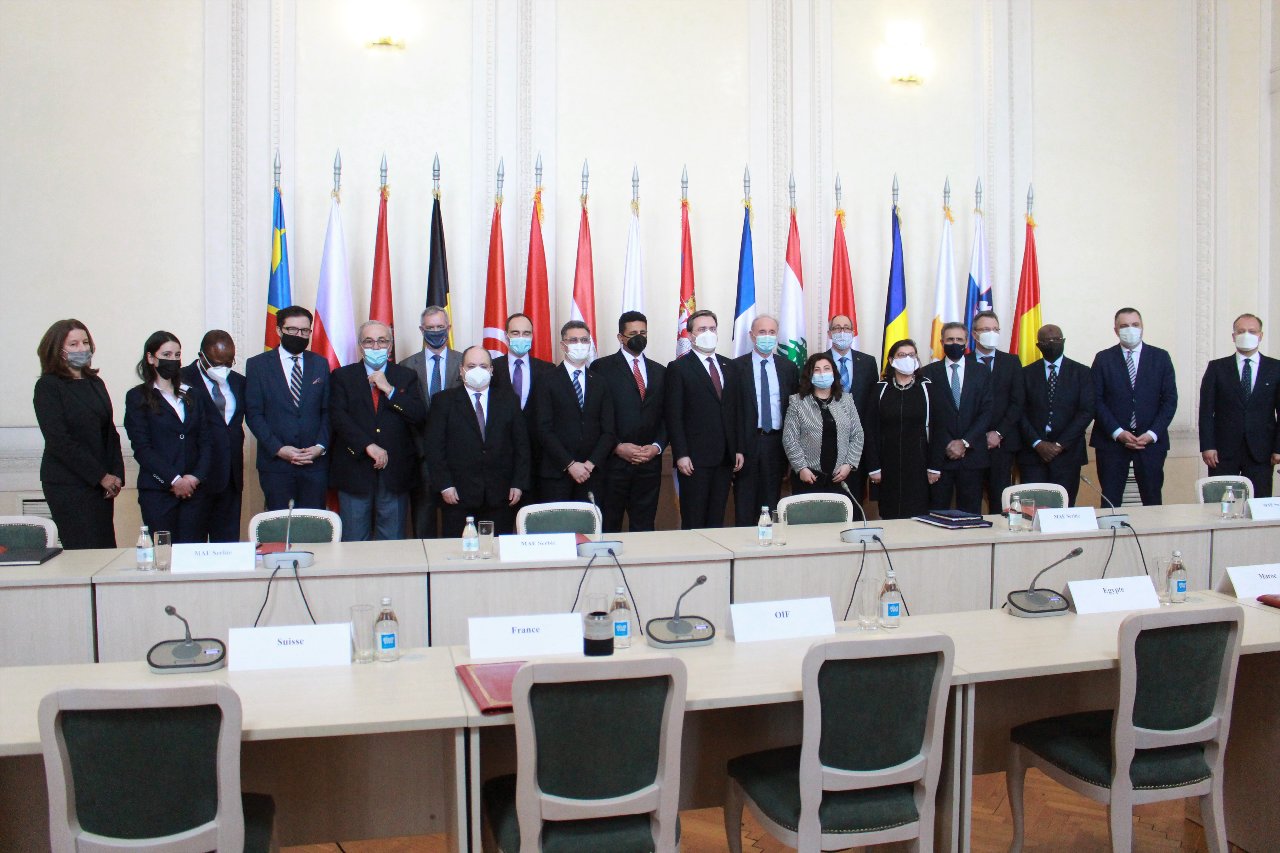
Le Ministre des Affaires étrangères de la République de Serbie Nikola Selaković s'est entretenu aujourd'hui avec le Groupe des ambassadeurs francophones en Serbie sur la promotion de la coopération entre la Serbie et l'OIF.
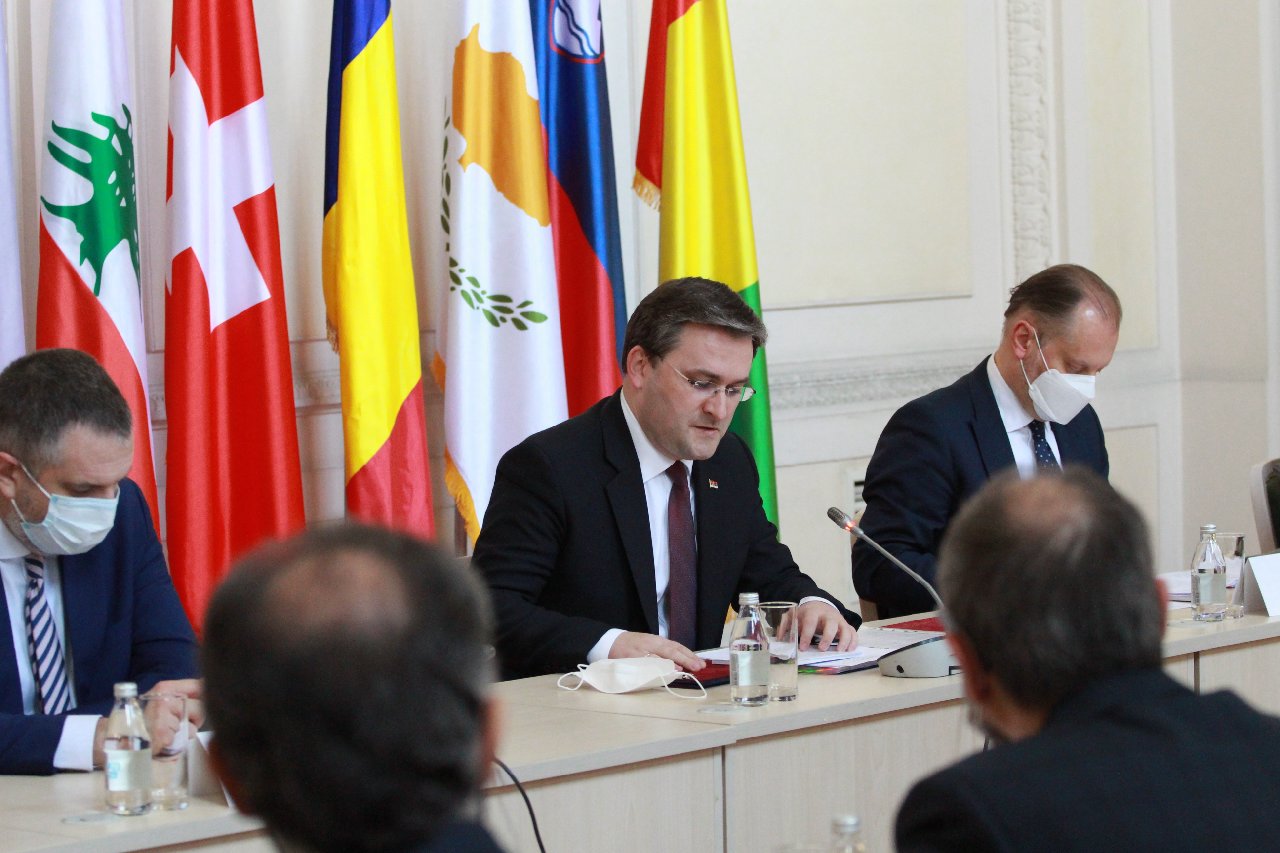
Selaković a dit que la Serbie est dévouée aux valeurs de la Francophonie - la promotion de la paix, de la démocratie, des droits de l'homme, de la coopération entre cultures, du dialogue et de la solidarité et qu'il espérait voir la coopération essentiellement améliorée par les propositions concrètes visant la promotion de la langue française et de la culture francophone.
Le chef de la diplomatie serbe a rappelé que la Serbie était le membre associé de l'OIF, en disant que notre pays continue une coopération encore plus dynamique afin de réunir les conditions pour devenir membre à part entière. Le Ministre a invité la Secrétaire générale de l'OIF Mme Louise Mushikiwabo à venir visiter la Serbie et à ce propos il a relevé que cette visite serait très importante pour échanger ensemble sur nombre de questions d'intérêt pour l'OIF et pour la Serbie. De même, le Ministre a annoncé sa participation à la Conférence ministèrielle de l'OIF qui aura lieu avant fin de l'année à Djerba.
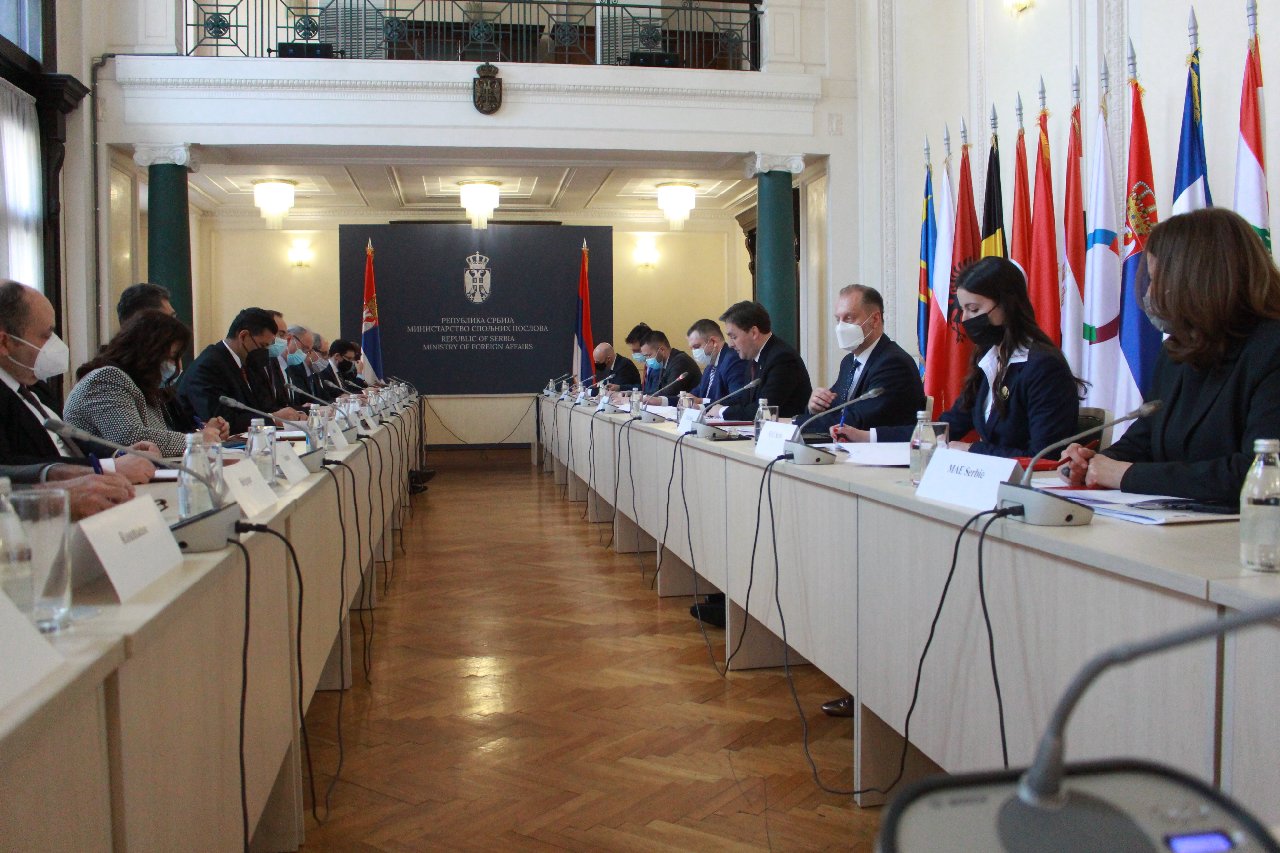
Selaković a félicité la célébration du Mois de la Francophonie, programme préparé par ce Groupe d'ambassadeurs, en soulignant que le Ministère des Affaires étrangères y a donné son apport en participant aux activités afférentes organisées.
Les ambassadeurs membres du Groupe des ambassadeurs francophones ont soutenu les intentions de la Serbie d'intensifier ses activités au sein de l'OIF, en louant les initiatives prises afin de promouvoir et populariser l'usage de la langue française en Serbie.
Ont assisté à la réunion d'aujourd'hui les ambassadeurs d'Egypte, Maroc, Lyban, France, Tunisie, Suisse, Belgique, Albanie, Chypre, Pologne, Roumanie et Slovenie, ansi que les chargés d'affaires des ambassades de la RD du Congo et de Guinée. Invité par le Ministre Selaković, le représentant de l'OIF pour l'Europe centrale et orientale, sis à Bucarest, M. Eric Poppe, a assisté également à la réunion.
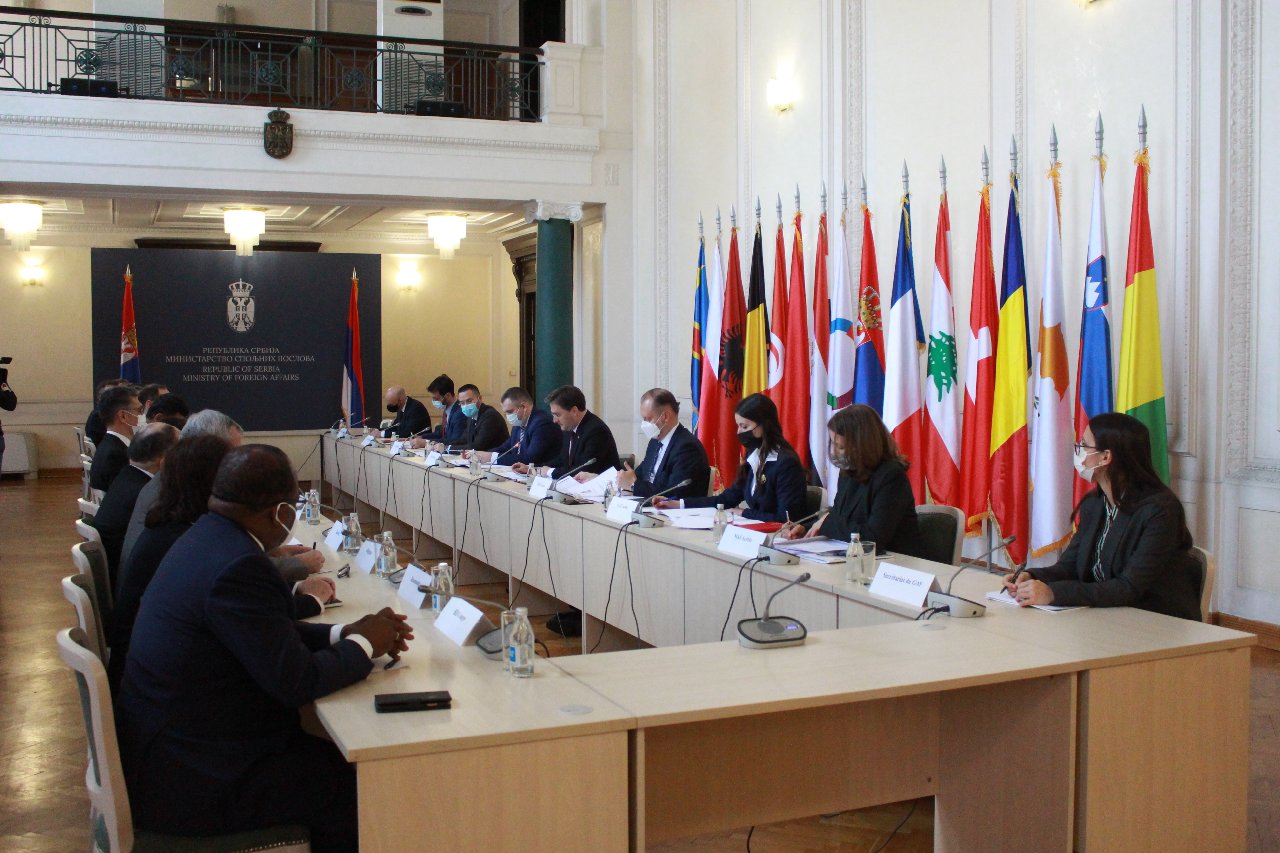
Belgrade, le 25 mars 2021 |
|
|
| La République de Serbie au Mois de la Francophonie |
|
La République de Serbie en qualité de membre associé à l'OIF, de concert avec toute la communauté francophone dans le monde entier, célèbre le Mois de la Francophonie. Pour tous les amateurs de la culture serbe et de la langue française, le Ministère de la Culture et de l'Information de la République de Serbie a préparé un vaste programme et L’Ambassade de la République de Serbie à République démocratique du Congo vous invite à découvrir la diversité et la richesse de la culture serbe en français.

|
|
|
| Cérémonie du jour commémoratif du 17 mars 2004 – pogrom au Kosovo et Metohija |
|

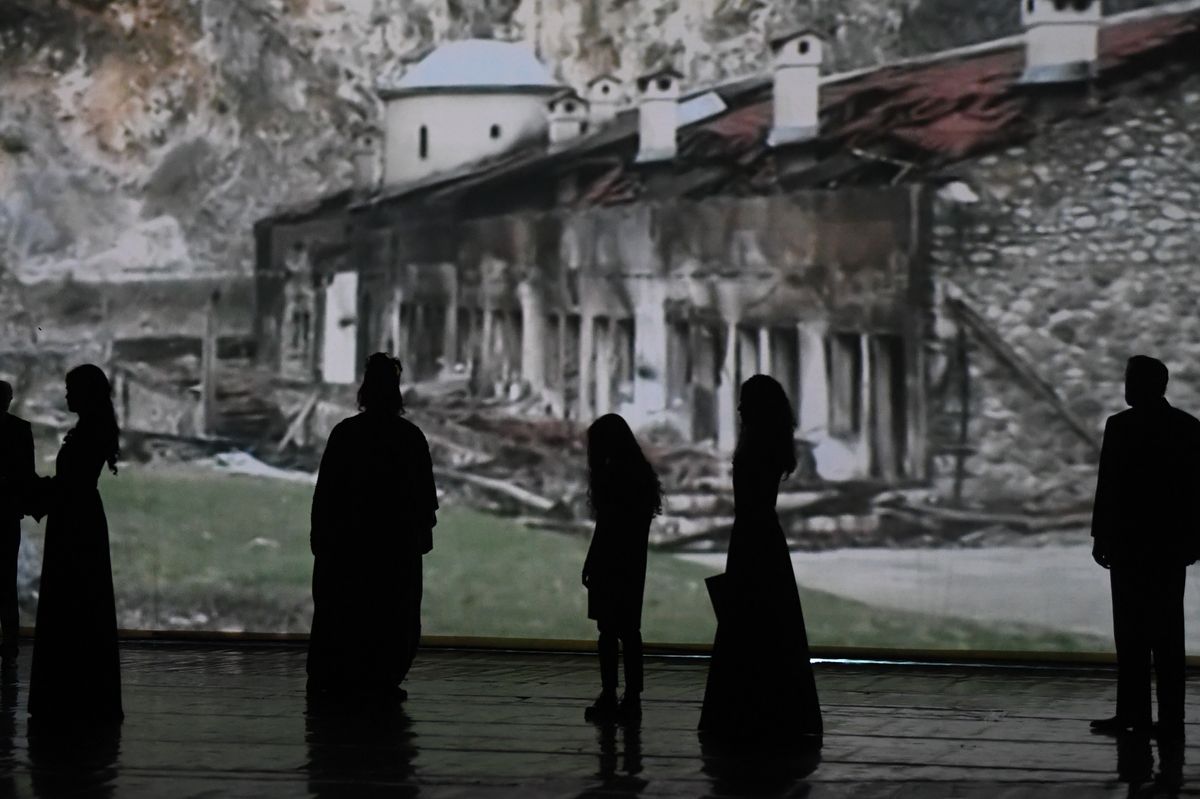 Photo: Dimitrije Gol Photo: Dimitrije Gol
Le président de la République de Serbie Aleksandar Vučić a assisté aujourd’hui à la cérémonie du jour commémoratif du 17 mars 2004 – pogrom au Kosovo et Metohija. Il a dit qu’au Kosovo et Metohija le pogrom a été perpétré il y a juste 17 ans, et le pogrom dépasse tous les autres crimes.
«Il peut y avoir des moments où nous sommes impuissants à prévenir l'injustice, mais il ne doit jamais y avoir un moment où nous ne parvenons pas à protester» - ces mots d’Elie Wiesel, survivant des camps et prix Nobel, nous obligent pour toujours à ne pas nous taire devant un crime, quelconque serait l’auteur et le motif», a dit le président Vučić, ajoutant que nous avons mémorisé et appris toute leçon dont nous sortions perdants, toute celle où nous restions muets devant nos propres victimes, toute celle où nous étions prêts d’oublier.
«La Serbie n’est plus faible, elle n’est pas un pays des perdants, elle ne menace pas, mais elle n’oublie non plus, elle est prête à la discussion, mais pas à l’humiliation. La Serbie comme tous les autres a le droit de s’occuper de son peuple, sa sécurité et son bienêtre. Le droit à la vie est le droit de l’homme fondamental et nous le défendrons toujours», a dit le président Vučić.
Le président Vučić a dit que le pogrom dépassait tous les autres crimes, car étant non seulement l’acte, mais aussi l’intention, la politique, la préméditation à nettoyer de force une partie, un pays, des appartenants à d’autres nations et confessions.
«Nous n’avons pas le droit d’y passer outre», a dit le président serbe, soulignant que nous sommes dans l’obligation d’être gagnants sans guerre ni sang, meilleurs en économie, santé, sports, éducation et tout le reste qui fait le développement et le progrès.
«Nous souhaitons pareil aux autres, qu’ils s’occupent d’eux-mêmes à succès, car nous sommes conscients que le crime est l’outil des perdants, et les gagnants n’en ont pas besoin, ils se souviennent mais pardonnent et continuent en avant, tandis que les perdants se tournent autour dans le même cercle vicieux. Nous les Serbes nous ne voulons plus l’être, nous voulons l’avenir dans lequel nous allons nous souvenir mais dont nous ne voulons pas revenir. Nous savons ce qui s’est passé et nous le nommons par son vrai nom», a conclu le président Vučić. |
|
|
| Selakovic: Fight against all forms of crime is a priority of the Serbian Government |
|
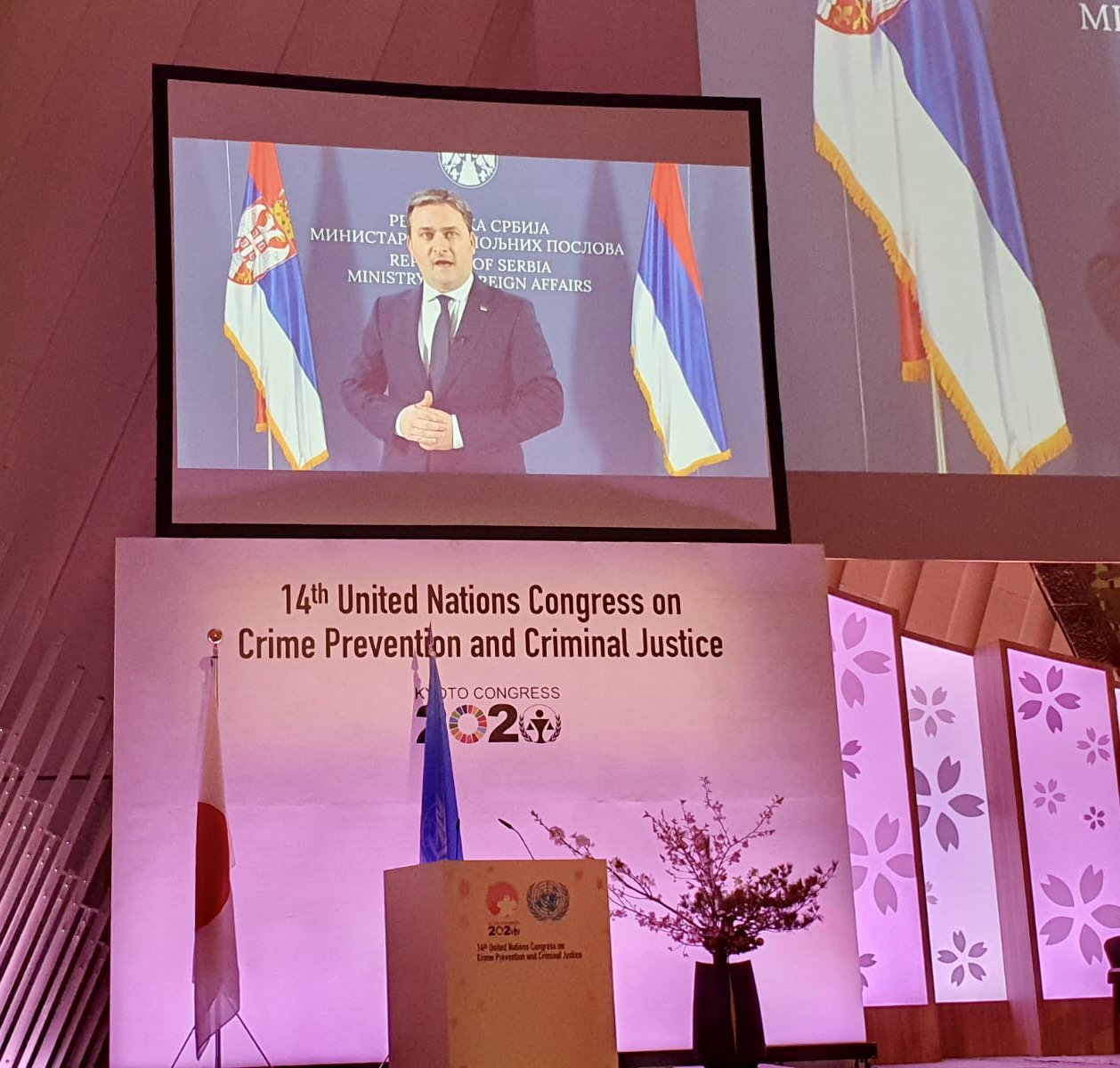
8 March 2021
Minister of Foreign Affairs of Serbia Nikola Selakovic said today that the fight against all forms of crime was a top priority of the Serbian Government and an integral part of the EU accession process.
"It is also our moral duty, in order to leave a better world for the generations to come", Selakovic said participating via video-link at the 14th UN Congress on Crime Prevention and Criminal Justice, held in Kyoto.
Minister Selakovic emphasized that Serbia, in its Second Serious and Organized Crime Threat Assessment from 2019, identified as its goal to eliminate cybercrime, human trafficking, terrorism and irregular migration.
The Serbian Foreign Minister pointed out that our country had established in a timely manner a normative and institutional framework that regulates prevention of abuse in this area, as well as that the Office of the Special Prosecutor for Cybercrime, a special court department and a special police unit were established.
The Minister underlined that, in the field of the fight against corruption, Serbia was guided by the postulates set out in the UN Convention against Transnational Organized Crime and the UN Convention against Corruption.
Selakovic pointed out the efforts made by the Anti-Corruption Agency, as an independent state body, to protect the public interest, build individual and institutional integrity, strengthen transparency and accountability of the public administration.
"We strongly condemn all forms of terrorism, including extremism and radicalism, and call for them to be fully eradicated, while implementing the relevant UN resolutions and conventions and the UN Global Counter-Terrorism Strategy", the Head of Serbian diplomacy underscored.
In order to combat these complex phenomena efficiently and successfully, Selakovic said, it was of vital importance to build capacities of our societies and states, while exchanging experiences at the regional and global levels.
Minister Selakovic thanked Japanese Ambassador Hikihara for the skill he showed in conducting the talks on harmonizing and adopting the Kyoto Declaration, which, as he stressed, was an important indicator of the commitment to creating and maintaining the institutional framework for crime prevention as one of the main preconditions for promoting sustainable development goals.
"Back in 1970 when Japan hosted this event for the first time, we demonstrated strong political will to draw attention to the problem. Today, it is incumbent upon us to reaffirm this willingness and resolve and translate it into concrete steps", the Serbian Foreign Minister said.
|
|
|
| La première réunion du Groupe de travail pour la coopération avec l’Organisation internationale de la Francophonie |
|
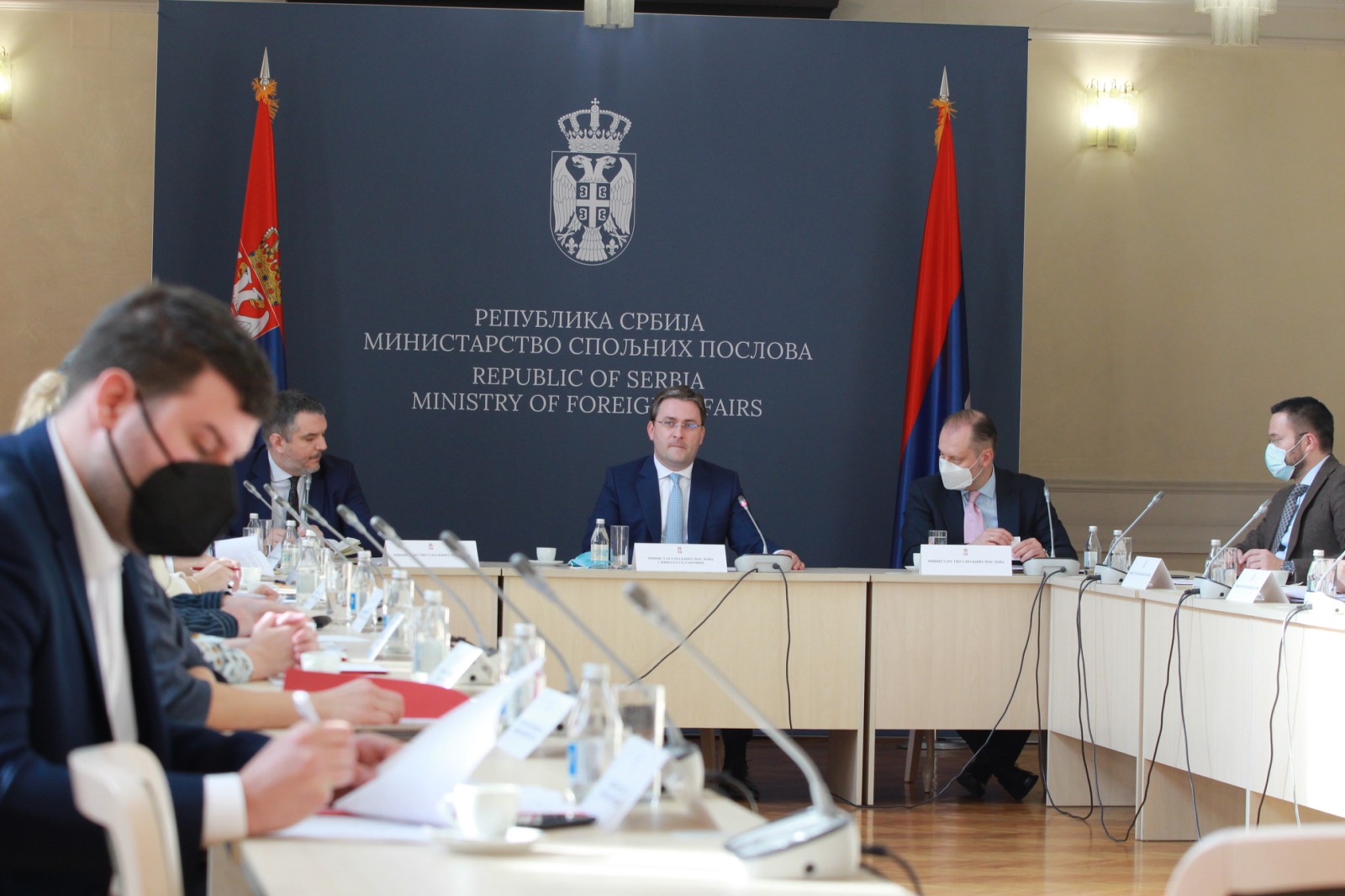
La toute première réunion du Groupe de travail interministériel pour la coopération avec l’Organisation internationale de la Francophonie, présidé par le Ministre des Affaires étrangères Nikola SELAKOVIĆ, a eu lieu aujourd’hui au Ministère des Affaires étrangères de la République de Serbie.
La décision de former ce Groupe de travail a été prise par le gouvernement de la République de Serbie le 18 février 2021, visant déterminer les objectifs de la Serbie dans le cadre de sa coopération avec l’Organisation internationale de la Francophonie, ainsi que leur atteinte efficace et à terme.
Le Groupe de travail met l’accent sur la promotion de l’apprentissage et de l’emploi du français, notamment dans l’optique de l’intention de la République de Serbie de devenir membre de plein droit de cette organisation, pour citer le chef de la diplomatie serbe Nikola SELAKOVIĆ lors de la Conférence ministérielle de la Francophonie, le 25 novembre 2020.
Le ministre SELAKOVIĆ, en saluant les participants de la réunion de ce jour, a souligné que l’objectif primordial du Groupe de travail était de voir la bonne volonté, la vocation de la Serbie à coopérer avec l’OIF traduite en activités concrètes, afin que notre pays puisse continuer sa voie vers l’adhésion pleine et entière le plus efficacement possible et avec les résultats palpables.
Lors de la réunion ont été discutées, entre autres, les mesures proposées par le Groupe d’ambassadeurs francophones en Serbie pour la promotion de la coopération de la Serbie avec l’OIF.
Font parti du groupe de travail: représentants du Ministère des Affaires étrangères, Ministère de l’éducation, des sciences et du développement technologique, Ministère de la culture et de l’information, Ministère de la jeunesse et des sports, Ministère de l’administration nationale et de l’autonomie locale, Ministère de l’environnement, Ministère des droits de l’homme et des droits de minorités et du dialogue social, Ministère de la construction, des transports et de l’infrastructure, Ministère de la protection de la famille et de la démographie, Ministère de l’intégration européenne et de l’Académie nationale de l’administration publique. |
|
|
| Metropolitan Porfirije of Zagreb and Ljubljana elected as the new Patriarch of Serbia |
|
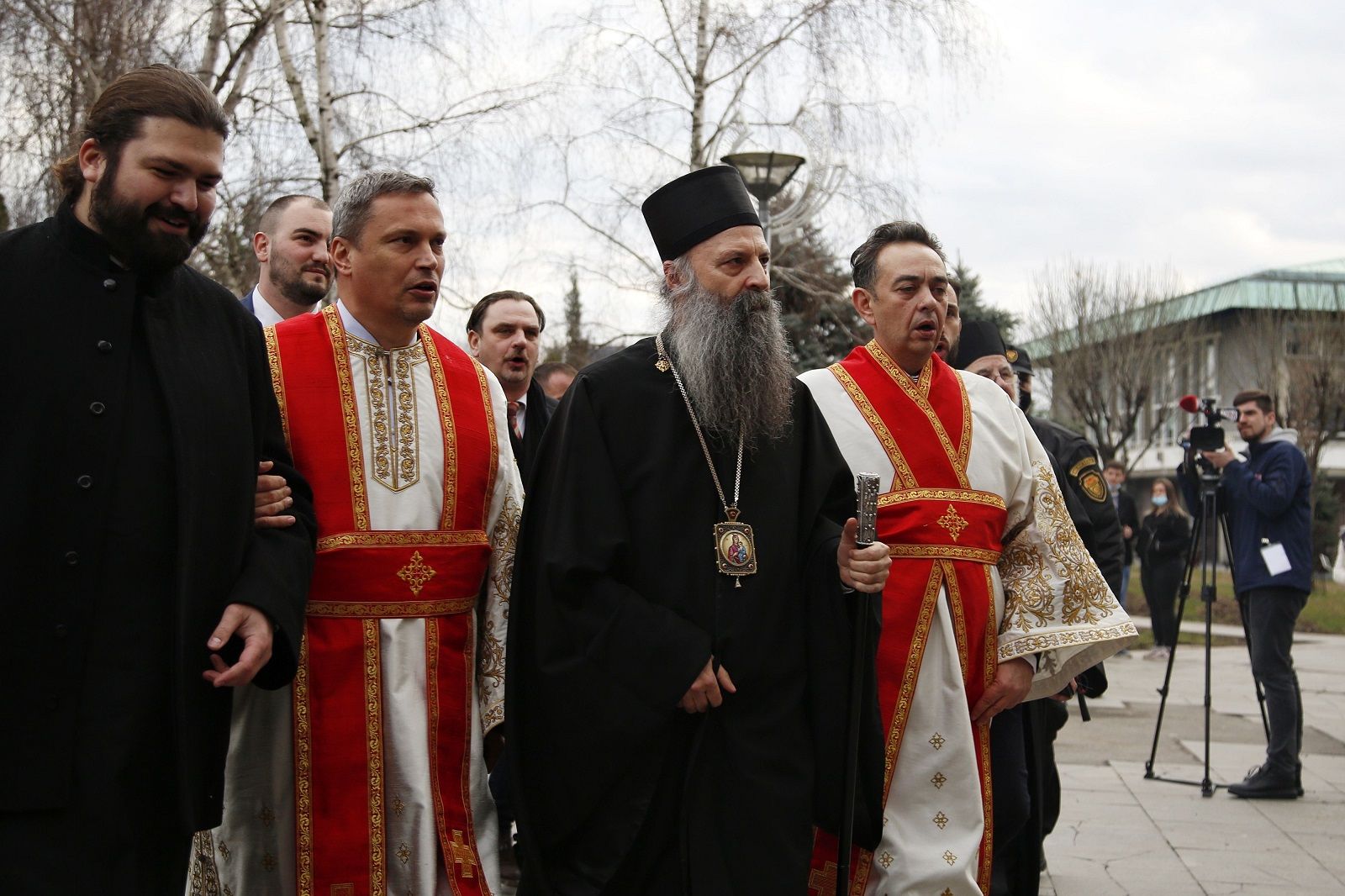 18 February 2021 18 February 2021
The Holy Assembly of Bishops of the Serbian Orthodox Church elected His Eminence Metropolitan Porfirije of Zagreb-Ljubljana, PhD, as the new Serbian Patriarch, in its convocation in Memorial Cathedral of Saint Sava in Belgrade on 18 February 2021.
Immediately after the election a thanksgiving service was officiated and Many Years was chanted to the Archbishop of Pec, Metropolitan of Belgrade-Karlovci and Serbian Patriarch Porfirije. Bells at Saint Sava Cathedral in the Vracar district of Belgrade rang a few minutes before 4:00 pm indicating that the 46th Patriarch of Serbia was elected.
Newly-elected Archbishop of Pec, Metropolitan of Belgrade-Karlovci and Serbian Patriarch Porfirije (Peric) was born on 22 July 1961 in Becej, to father Radivoje and Mother Radojka. He was baptized as Prvoslav. He finished primary school in Curug, and the “Jovan Jovanovic Zmaj” Grammar School in Novi Sad. He was ordained a monk according to the rite of small schime by his spiritual father, then hieromonk Dr. Irinej (Bulovic), at Decani Monastery on Sunday of St. Thomas in 1985.
He graduated from the Faculty of Orthodox Theology in Belgrade in 1986, when the then Bishop of Raska-Prizren Diocese, future Serbian Patriarch Pavle of blessed memory, ordained him a hierodeacon at the monastery of Holy Trinity in Musutiste.
He attended postgraduate studies in Athens from 1986 until 1990. That year, upon the blessing of Bishop Dr. Irinej of Backa, he joined the monastery of Holy Archangels in Kovilj, where he was ordained as hieromonk and became its abbot.
Many young monks and novices came to the monastery following him. These were the years when the Kovilj Monastery became a spiritual center for many young people: intellectuals, artists, popular actors and rock musicians, especially from Novi Sad and Belgrade. Since then abbot Porfirije has particularly dealt with drug-addicted patients. In 2005, he formed for this purpose a therapeutic community called “The Land of the Living”, which is recognized as the most successful drug-addiction therapy project and, under the leadership of Bishop Porfirije, it has more than a hundred residents in camps throughout Serbia today.
During the ordinary meeting of the Holy Assembly of Bishops of the Serbian Orthodox Church in Belgrade on 14 May 1999 he was elected as Bishop of Jegar, Vicar of the Diocese of Backa.
He defended his PhD thesis Possibility of knowability of God in St. Paul’s understanding according to the interpretation of Saint John Chrysostom at the Faculty of Theology of the University of Athens in 2004.
He became a lecturer at the Faculty of Orthodox Theology - Department of Pastoral Psychology - succeeding famous psychiatrist, academician Dr. Vladeta Jerotic. His lectures have been attended not only by students of the Faculty of Orthodox Theology, but other Belgrade faculties as well.
Together with a group of experts: psychologists, doctors, criminologists, sociologists, Bishop Porfirije founded a civic association that deals with the resocialization of victims of destructive religious sects and cults.
Bishop Porfirije has not been just president of the Steering Board for a decade, but a real spiritus movens of the Humanitarian Fund “Privrednik”, which has provided scholarships for a great number of gifted, but poor pupils and students, regardless of their nationality or religious affiliation.
In 2005, the National Assembly elected him as representative of all Churches and religious communities, to be a member of the Council of the Republic Broadcasting Agency, and in 2008 the RBA elected him its president. As President of the Council of the Republic Broadcasting Agency, Bishop Porfirije supported the long-term interests of society and citizens, unaffected by political influences.
Since then, church radio stations have been heard in the broadcasting spectrum of Serbia. He has made a key contribution to launching of a series of radio and television shows dealing with religious topics.
In 2010, The Holy Assembly of Bishops entrusted him to establish military chaplaincy in the Serbian Armed Forces. The fruits of his labour in that field include not only the suitable legal regulations, but also the selection of military chaplains, the organization and equipping of churches at barracks and performance of the first religious services.
His expert theological works Bishop Porfirije published in magazines both in Serbia and abroad. He participated in a large number of scientific conferences and symposia across the globe.
Bishop Porfirije, as one of the most prominent contemporary Serbian clergymen and intellectuals, has an extremely wide circle of friends, not only in the Homeland, and he fosters personal friendship and close cooperation with priests and representatives of other Churches and religious communities.
He speaks Greek, English, German and uses the Russian language, while his style of communication is always adapted to his interlocutors.
He was enthroned as the Metropolitan of Zagreb and Ljubljana on 13 July 2014 in the Cathedral Church of the Transfiguration of the Lord in Zagreb. The solemn Hierarchal Liturgy was served by Serbian Patriarch Irinej, accompanied by a large number of archbishops of the Serbian Church and other sister Churches, as well as priests and monks, and pious people.
Source: SPC/Serbian Orthodox Church |
|
|
| Statehood Day of the Republic of Serbia -15.02.2021. |
|
Honouring Statehood Dau of the Republic of Serbia, Ministry of Foreign Affairs of the Republic of Serbia has prepared video material which you can view it here.
|
|
|
| President Vucic: Serbia is ready for dialogue on Kosovo and Metohija, but will refuse being humiliated |
|
President of the Republic and Supreme Commander of the Serbian Army Aleksandar Vucic attended a demonstration of capabilities of one part of Serbian Army units in the "Rastko Nemanjić" barracks in Pancevo. On this occasion, President Vucic stated that Serbia was ready to continue the EU-facilitated dialogue with Pristina at any point, while respecting also the position of the United States as well as the positions of Russia and China.
The President said that he would rather put his "head on the chopping block" than sign any document with a recognition and reminded that he had already once refused to do so in Washington, where there were two versions of the agreement.
He stated that he immediately had his delegation leave the meeting, that he told the U.S. delegation that Serbia would not sign such an agreement, while conveying that Serbia would always endeavour to hold peaceful talks in order to preserve peace, but that it would not take any humiliation.
The Serbian President thanked the U.S. President Joe Biden for the letter of congratulations on the occasion of the upcoming Statehood Day, in which, in addition to the usual emphasis on commitment to promoting economic cooperation, regional stability and democratic values, he unequivocally called for mutual recognition of Serbia and "Kosovo" as a result.
Mutual recognition between Serbia and "Kosovo" is not part of any act of any world organization, the President pointed out and reiterated that Serbia was ready to continue the EU-facilitated dialogue with Pristina at any point, while respecting also the position of the United States as well as the positions of Russia and China.
According to the president, the situation is difficult and will only be increasingly difficult.
"As I told you three days ago, I can see it and I expect it, I can see the situation slowly tightening, because the conflicts between them at the global level have been increasing and intensifying, and then we have to pay the price", the President said.
President Vucic said that said that it was up to our state to continue strengthening the country in the economic sense.
The President added that the role of the army was very important in the highly complex security and political conditions of the modern world, and that was why Serbia needed to do everything it could to deter any potential aggressor and attacks on citizens and the country.
"The policy of strengthening the armed forces will continue at a faster pace", the President emphasized, adding that the goal was for the Serbian Army to play a stabilizing role with regard to the political developments in the region.
According to him, it should be clear to everyone that Serbia was not a punching bag and that not everyone could attack and threaten it like it was the case in the past.
Vucic said that he was pleased with what he saw and that a lot had been done in the previous period, pointing out that the salaries of military personnel would be significantly increased as of April.
President Vucic also stated that investments in the Serbian Army would continue, whom he told that he expected the Army to continue to be the guardian of our country, its integrity and freedom.
"We expect you to be the guardians of our country, its integrity and freedom, the defenders of our people, the guardians of the homeland, the protectors of the interests of the state of Serbia and to be a deterrent factor for every aggressor and anyone who might consider attacking Serbia", Vucic said.
The military exercise called "Spearhead" demostrated the capabilities of the 72nd Special Operations Brigade, and the event, which the President of Serbia and the Supreme Commander of the Serbian Army assessed as very good, was also attended by Deputy Prime Minister and Minister of Defence Nebojsa Stefanovic and Chief of General Staff of the Serbian Armed Forces, General Milan Mojsilovic.
Photo: Presidency of Serbia / Dimitrije Goll
Belgrade,
7 February 2021 |
|
|
| Minister Selakovic speaks for Politika: The year of rejuvenation of Serbian diplomacy |
|
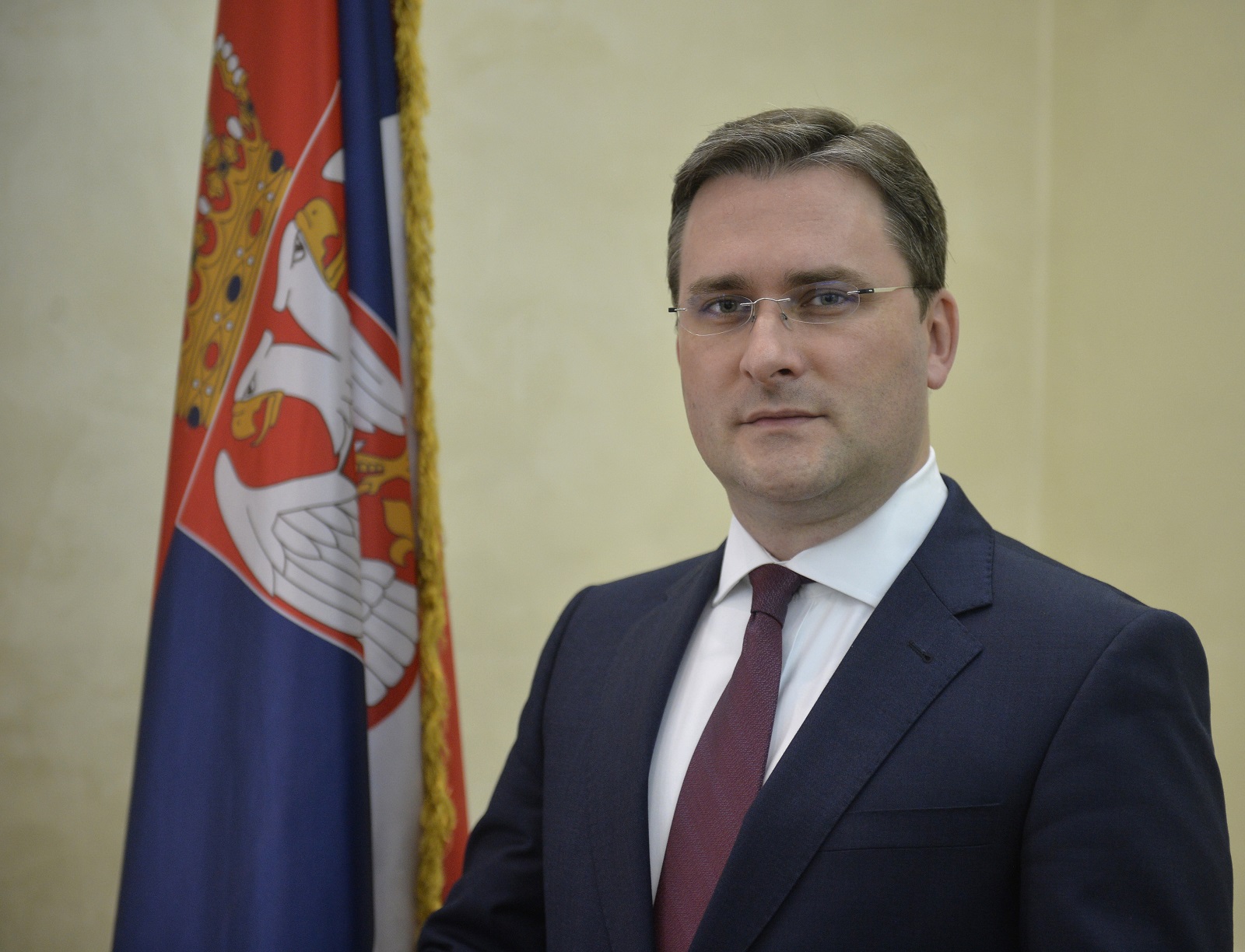
26 January 2021
Serbia's foreign policy positions are naturally being adjusted to the new developments at the international level, but our foreign policy priorities have not changed in a long time. Our top and most important interest is to preserve good-neighbourly relations and stability and peace in the region and, in the same context, to find a peaceful and just solution to the problems in Kosovo and Metohija, Serbian Foreign Minister Nikola Selakovic said in an interview with Politika daily.
Another lasting interest of ours is full membership of the European Union, because this is the type of society we strive for. At the bilateral level, our goal is to strengthen ties with traditional friends, the Russian Federation and the People's Republic of China, but also to build new partner relations with the United States. One of the most important tasks of our foreign policy is to improve the position and protect the rights and identity of our people in the region, as well as to provide various types of support to Serbs in the diaspora. All these are very important and more often than not complementary goals, Nikola Selakovic pointed out.
What kind of relations do you expect Serbia to have with the new U.S. administration?
It is too early to speculate about this in public. The new presidential administration in Washington is currently preoccupied with internal issues and this will be the case for some time. There are people in the team of President Joseph Biden who have dealt with our region, and it is likely that the Balkans and Serbia will be the focus of the U.S. foreign policy at some point. I will remind you that President Vucic and President Biden not so long ago had very substantive talks in Belgrade, after which our President stated that he had the opportunity to talk to someone extremely well acquainted with the situation in this part of the world and an extraordinarily prepared interlocutor. Taking their personal relationship into account, but also the importance of enhancing the ties between Serbia and the United States, we have reason to expect that a meeting between the two presidents will be organized in the foreseeable future. I am sure that the nature and dynamics of the relations between Serbia and the United States will be influenced by the fact that Ambassador Marko Djuric now represents us in Washington, whose presence at President Biden's inauguration ceremony is an important signal and, I believe, a harbinger of positive developments in bilateral relations between our two countries.
How would you describe our country's relations with Moscow, Brussels and Beijing?
Russia is our traditional friend and that friendship goes beyond merely political ties. These are deep spiritual, cultural and civilizational bonds, and it is only natural that we have a mutual interest in improving those ties, even though they are at a very high level. We have a relationship with the People's Republic of China which is, in addition to the sincere iron-clad friendship between our peoples and high political representatives, based on deep trust and mutual support. Full membership of the European Union is Serbia's strategic orientation that all our friends are aware of, but our country does not forget its friendships, but strengthens and promotes them instead, and approaches all with honesty and no ulterior motives. In this context, we do not seek any preferential treatment, but only the right to freely and independently make decisions about our future and relations with all who respect us.
Could Serbia pursue a different foreign policy than the one it is pursuing at the moment?
It is always possible to have a different policy, just look at the foreign policy of Serbia ten, twenty or thirty years ago, examine the results at that time and you will realize how irretrievably expensive that policy turned out to be. Whether a policy is right, at either foreign or domestic level, is measured through its results and effect on the lives of citizens and the fate of the entire state.
Our foreign policy priorities are not being defined on a whim, but are instead the result of a serious and deep examination of our complex position and strategic thinking about ways to improve it. Today, Serbia has a better international reputation and credibility than two decades ago, and the main reason for that is that our results have shown how serious and responsible we are as a country. That kind of credibility is not achieved by trickery, but only by hard and well-thought-out work on oneself. And I need to emphasize on this occasion as well that the main inspiration for such an attitude towards politics, the state and its future comes from none other than President Aleksandar Vucic. As Minister of Foreign Affairs, I have the opportunity on a daily basis to see the level of appreciation and respect President Vucic enjoys beyond the borders of our country.
When can we expect the vacant posts of Serbian ambassadors and consuls across the globe to be filled?
That is one of the main tasks for 2021. This will be a year of reinvigoration and I believe also rejuvenation of Serbian diplomacy. Our country, given its size, has a fairly extensive diplomatic network, which provides it with great opportunities for deepening political and economic relations with countries in all parts of the world. But we need more fresh and energetic staff, people who will be the most honourable representatives of a modern and dynamic Serbia. There are such people in Serbia, and we do need a serious rejuvenation, in order to avoid wide generation gaps in our personnel, and to lay the foundations of a modern career diplomacy.
How would you describe your relationship with Serbian President Aleksandar Vucic?
President Vucic and I are, in addition to having close and friendly relations, by virtue of the work we do and our constitutional competencies, the closest collaborators in the realization of Serbia's foreign policy goals. This allows me to talk to him often, and on many occasions learn a lot of new and important things. President Vucic is a man who inspires people around him with his strategic and visionary approach to politics, and I am proud to have had the opportunity to be part of his closest team of associates over the years, and to have had him as a kind of political mentor. In any case, his vision of Serbia as a modern, progressive and prosperous state, which independently and on its own will decides on its destiny, is my wish as well and key motivation for political engagement. For only such Serbia is a country that its own citizens, as well as Serbs beyond our borders, can confidently rely on, while also being an inspiration to the entire region.
Source: Politika |
|
|
| President Vucic: Serbia is the first in Europe in terms of growth |
|
President Vucic: Serbia is the first in Europe in terms of growth
Serbian President Aleksandar Vucic pointed out that Serbia is the first in Europe in terms of economic growth, which will be officially confirmed at the end of March, and that this was possible owing to the reform measures taken since 2014 and the rapid opening of the country after the first wave of corona virus.
The President pointed out that Serbia had a growth of 5.2 percent in the first quarter, while the Eurozone was at minus 3.2 percent, in the second quarter Serbia had a growth of minus 6.3 percent, while the Eurozone was at minus 14.7 percent, and in the third quarter, when the Eurozone was at minus 4.3 percent, Serbia's figure was only minus 1.4 percent.
Vucic stated that Montenegro, for example, recorded as much as 26 percent minus in the third quarter.
Furthermore, the President emphasized that hospitals were built and renovated in our country, and that two hospitals were built from the ground up in just four months.
He said that the state made significant efforts to procure respirators, masks, gloves, protective suits, medicines, everything that was needed, and pointed out that work was being done on 10 general hospitals throughout Serbia, adding that all these were major achievements that were only possible owing to the success of the 2014 reforms, the enactment of the Labor Law, which yielded excellent results, and also through fiscal consolidation measures.
"These are unprecedented results for Serbia. Was Serbia ever before the first in Europe in terms of growth rate? We will get the results on 31 March that will confirm that Serbia is number one in Europe. All that was possible thanks to people who believed in difficult changes", Vucic said.
According to the President, this year, as many as six highways will be built in Serbia at the same time, and in this regard, he noted that Bulgaria has announced that the highway from our border to Sofia will be completed by the end of the year, after which it will be possible to use motorway to travel to Istanbul, which is very important to ensure that our country is on a transport route.
President Vucic emphasized that in 2020, the so-called year of corona, our country had a net inflow of foreign direct investment amounting to EUR 2.9 billion net, and three billion gross, which means that many foreign companies such as Toyota Tires, Boysen, ZTF and Brose have invested in Serbia even in this year of crisis.
The President said that Serbia has the highest average wages in the region, amounting to 511 or 512 euros, and that in February, due to the January increase, the average wage will be 535 or 536 euros, and that only in Belgrade in the last seven years the average wage increased by 180 euros or 40 percent.
That President said that Serbia was fourth in the region in terms of salaries before, and that today we are officially the first, and that the difference in relation to other countries will only increase faster. He also pointed out that the employment rate is growing in Serbia as well as that our public debt increased less than in most European countries. This is illustrated by the data that in Italy the public debt surged to 156 percent, in Germany to 87 percent, in France to 114 percent, in Croatia to 88 percent, while in Serbia it is at 57 percent.
The Serbian President announced that by Sretenje, 15 February, an additional package of assistance to the economy will be earmarked, and as he explained, it will be a new capital injection for companies, the trade, entrepreneurs, small, medium and large enterprises which, as he said, concerns 1,052,000 people within that system.
Vucic specified that it will most likely be help in the form of two or three payments amounting to half a minimum wage each, and that there will also be sectoral aid for tourism, hotel owners, travel agencies, guides, for bus carriers, through another half minimum wage payment.
The President added that efforts will be made to extend the guarantee schemes as well, which proved to be excellent, amounting to 1.5 billion, and this time, through the same system, two more portions amounting to 500 million each could be provided.
Vucic said that the first agreements with DFC worth 300 to 400 million dollars are expected in seven days.
He also stated that the state will endeavour to help pensioners further, in addition to increasing pensions by 5.9 percent in January, which will be reflected in their first checks in February, and added that pensioners should by March receive symbolic aid in the form of packages with vitamin C, D and zinc, which, as the President said, are small things, but they reflect the state's care and efforts made to protect health.
The President announced that negotiations on the procurement of the Chinese vaccine would be completed in the next seven to eight days, after the first quantities of the Pfizer and Sputnik V vaccines have arrived in Serbia, and pointed out that the Chinese vaccine was of exceptional quality, but probably the most expensive, which is why he wrote to the Chinese President and asked for a discount for our country.
Vucic thanked the Americans for deciding to sell the vaccine to our country and noted that no one in the region other than Serbia has received it, except for the small quantity that Albania got.
He pointed out that our state relied on itself and its own capacities, and that our state leadership anticipated that vaccines within the European COVAX plan would arrive late.
The President rejected the claims about bad results of Serbia in the fight against the corona virus and stated that our country has recorded the lowest corona virus mortality rate in the region.
He presented statistical information indicating that Slovenia had 144 deaths per 100,000 inhabitants, North Macedonia 126, Bosnia and Herzegovina 123, Bulgaria 115, Montenegro 115, Hungary 110, Croatia 107, Romania 85, and Serbia 51.
"The mortality rate in the region is as follows: Bulgaria 3.9, Bosnia and Herzegovina 3.7, Hungary 3.11, North Macedonia 3.03, Romania 2.48. Slovenia 2.15, Croatia 1.99, Montenegro 1.4, and Serbia 1.0. This can be seen in the graphs and is no fabrication", the President stressed.
He said that the state will fight for vaccines, and that only Serbia, in the Western Balkans, received significant quantities of vaccines, other than a smaller quantity that Albania received, and added that in one day since the registration for vaccination opened, as many as 63,000 persons have registered.
President Vucic expressed his belief that the year ahead will be better than the previous one as well as that the corona virus will be defeated through vaccination of citizens.
Belgrade,
12 January 2021
|
|
|
| President Vucic: Serbia is the first in Europe in terms of growth |
|
Serbian President Aleksandar Vucic pointed out that Serbia is the first in Europe in terms of economic growth, which will be officially confirmed at the end of March, and that this was possible owing to the reform measures taken since 2014 and the rapid opening of the country after the first wave of corona virus.
The President pointed out that Serbia had a growth of 5.2 percent in the first quarter, while the Eurozone was at minus 3.2 percent, in the second quarter Serbia had a growth of 6.3 percent, while the Eurozone was at minus 14.7 percent, and in the third quarter, when the Eurozone was at minus 4.3 percent, Serbia's figure was only minus 1.4 percent.
Vucic stated that Montenegro, for example, recorded as much as 26 percent minus in the third quarter.
Furthermore, the President emphasized that hospitals were built and renovated in our country, and that two hospitals were built from the ground up in just four months.
He said that the state made significant efforts to procure respirators, masks, gloves, protective suits, medicines, everything that was needed, and pointed out that work was being done on 10 general hospitals throughout Serbia, adding that all these were major achievements that were only possible owing to the success of the 2014 reforms, the enactment of the Labor Law, which yielded excellent results, and also through fiscal consolidation measures.
"These are unprecedented results for Serbia. Was Serbia ever before the first in Europe in terms of growth rate? We will get the results on 31 March that will confirm that Serbia is number one in Europe. All that was possible thanks to people who believed in difficult changes", Vucic said.
According to the President, this year, as many as six highways will be built in Serbia at the same time, and in this regard, he noted that Bulgaria has announced that the highway from our border to Sofia will be completed by the end of the year, after which it will be possible to use motorway to travel to Istanbul, which is very important to ensure that our country is on a transport route.
President Vucic emphasized that in 2020, the so-called year of corona, our country had a net inflow of foreign direct investment amounting to EUR 2.9 billion net, and three billion gross, which means that many foreign companies such as Toyota Tires, Boysen, ZTF and Brose have invested in Serbia even in this year of crisis.
The President said that Serbia has the highest average wages in the region, amounting to 511 or 512 euros, and that in February, due to the January increase, the average wage will be 535 or 536 euros, and that only in Belgrade in the last seven years the average wage increased by 180 euros or 40 percent.
That President said that Serbia was fourth in the region in terms of salaries before, and that today we are officially the first, and that the difference in relation to other countries will only increase faster. He also pointed out that the employment rate is growing in Serbia as well as that our public debt increased less than in most European countries. This is illustrated by the data that in Italy the public debt surged to 156 percent, in Germany to 87 percent, in France to 114 percent, in Croatia to 88 percent, while in Serbia it is at 57 percent.
The Serbian President announced that by Sretenje, 15 February, an additional package of assistance to the economy will be earmarked, and as he explained, it will be a new capital injection for companies, the trade, entrepreneurs, small, medium and large enterprises which, as he said, concerns 1,052,000 people within that system.
Vucic specified that it will most likely be help in the form of two or three payments amounting to half a minimum wage each, and that there will also be sectoral aid for tourism, hotel owners, travel agencies, guides, for bus carriers, through another half minimum wage payment.
The President added that efforts will be made to extend the guarantee schemes as well, which proved to be excellent, amounting to 1.5 billion, and this time, through the same system, two more portions amounting to 500 million each could be provided.
Vucic said that the first agreements with DFC worth 300 to 400 million dollars are expected in seven days.
He also stated that the state will endeavour to help pensioners further, in addition to increasing pensions by 5.9 percent in January, which will be reflected in their first checks in February, and added that pensioners should by March receive symbolic aid in the form of packages with vitamin C, D and zinc, which, as the President said, are small things, but they reflect the state's care and efforts made to protect health.
The President announced that negotiations on the procurement of the Chinese vaccine would be completed in the next seven to eight days, after the first quantities of the Pfizer and Sputnik V vaccines have arrived in Serbia, and pointed out that the Chinese vaccine was of exceptional quality, but probably the most expensive, which is why he wrote to the Chinese President and asked for a discount for our country.
Vucic thanked the Americans for deciding to sell the vaccine to our country and noted that no one in the region other than Serbia has received it, except for the small quantity that Albania got.
He pointed out that our state relied on itself and its own capacities, and that our state leadership anticipated that vaccines within the European COVAX plan would arrive late.
The President rejected the claims about bad results of Serbia in the fight against the corona virus and stated that our country has recorded the lowest corona virus mortality rate in the region.
He presented statistical information indicating that Slovenia had 144 deaths per 100,000 inhabitants, North Macedonia 126, Bosnia and Herzegovina 123, Bulgaria 115, Montenegro 115, Hungary 110, Croatia 107, Romania 85, and Serbia 51.
"The mortality rate in the region is as follows: Bulgaria 3.9, Bosnia and Herzegovina 3.7, Hungary 3.11, North Macedonia 3.03, Romania 2.48. Slovenia 2.15, Croatia 1.99, Montenegro 1.4, and Serbia 1.0. This can be seen in the graphs and is no fabrication", the President stressed.
He said that the state will fight for vaccines, and that only Serbia, in the Western Balkans, received significant quantities of vaccines, other than a smaller quantity that Albania received, and added that in one day since the registration for vaccination opened, as many as 63,000 persons have registered.
President Vucic expressed his belief that the year ahead will be better than the previous one as well as that the corona virus will be defeated through vaccination of citizens.
Belgrade,
12 January 2021 |
|
|
| Every Serb in the diaspora is potentially a lobbyist |
|
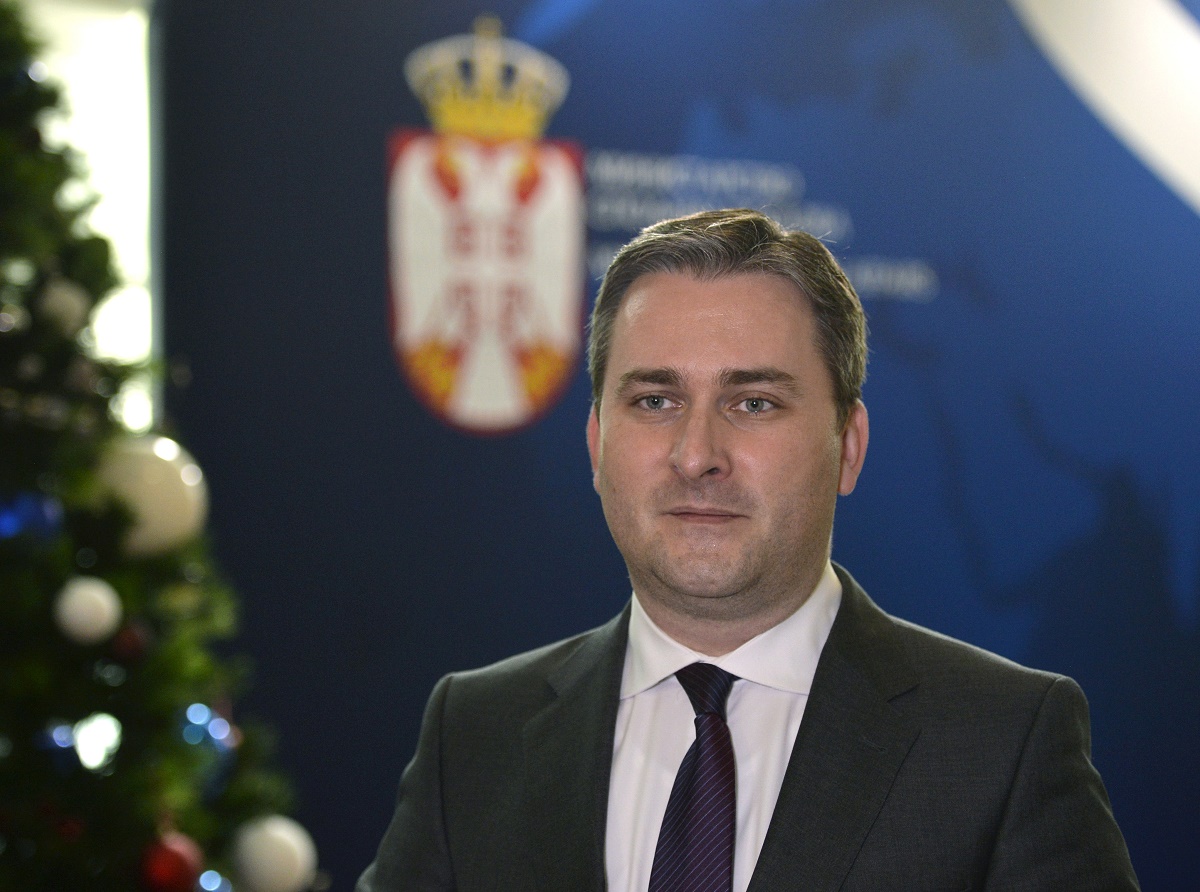
Our compatriots living abroad are one of the great potentials that the state has not recognized in the right way so far, which is why a different approach is needed to the issue of how to strengthen our diaspora and use the good will of people who are potential lobbyists for the interests of Serbia and the Serbian people, Foreign Minister Nikola Selakovic said.
"When it comes to Serbs in the diaspora, and especially in the region, this issue has been a kind of an unattended crop which requires a lot of work, and even when a lot is done at once this is not apparent immediately ", Minister Selakovic stated in an interview with Tanjug.
He emphasized that the appointment of the Director of the Office for Cooperation with the Diaspora and Serbs in the Region for the first time after almost seven years since this body was formed within the Ministry of Foreign Affairs, shows that it is one of the priorities of the Ministry he is at the helm of.
Selaković notes that intensive efforts have been long underway on forming a plan to make the diaspora more visible both outside the borders of Serbia and in the mother country itself.
"Every person in the diaspora is a potential lobbyist for the interests of our country and people, and we need to find the right way to use that", he said.
That much can be done in that regar Selakovic illustrates with the fact that only in Switzerland, in 24 cities, there are Serbian cultural and artistic associations which amounts to more than 3,000 young people who get together in order to preserve our tradition, culture, the Serbian language and history.
"If they were able to set up such associations in 24 cities, it speaks volumes about the enthusiasm of these people. There is so much enthusiasm, energy and love in these people. We need to explore ways to help them and use their good will and potential", the Minister points out.
He also cites the example of an emigrant family in Canada, the Varaklic family from southwestern Serbia, who sends Christmas packages for children in the Raska region every year. He adds that they have so far donated hundreds of thousands of dollars to non-governmental organizations for those needs alone, but he says that we do not see that here.
"The state does not recognize this, and these are people who gained success as entrepreneurs working in a distant country, who can be serious lobbyists for Serbia, for Serbian interests, someone who represents us in the best possible way", Minister Selakovic said.
Minister Selakovic also pointed out that Arnaud Gouillon has been appointed as head of the Office for Cooperation with the Diaspora and Serbs in the Region and described him as a man of extraordinary energy, great love for the Serbian people, which he showed in his engagement towards Serbs in Kosovo and Metohija, where they were seriously endangered.
"By doing so, he showed and set an example to many of our compatriots of what an individual can do. And when one such individual focuses energy, enthusiasm and love for people, on work done within the state administration system, I think that the preconditions have been created for such activities to yield good results", Minister Selakovic said (3 January 2021).
Source: Tanjug |
|
|
| Minister Selakovic: New ambassadors will be appointed this year, but the goals remain the same |
|
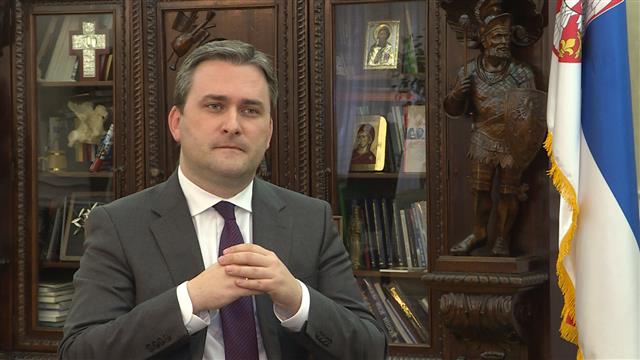
This year, Serbia could finally have Ambassadors and Consuls General appointed to about a third of the currently vacant positions in the country's diplomatic and consular missions in the world, and Minister of Foreign Affairs Nikola Selakovic is convinced that most of these positions will be filled, as he points out, by the best possible people.
"In the next year, I am convinced that the majority of these vacancies will be filled", Selakovic told Tanjug, emphasizing that the work is being done gradually, because the state wants to show that is has a quality staff who will represent Serbia's interests in the best possible way.
The Head of Serbian diplomacy reminded that in a number of diplomatic missions, the four-year mandate of Ambassadors and Consuls General has already expired, so that the procedure for appointing new ones will follow, after their recall.
One of the "vacant" spots is the post of the Serbian Ambassador to China.
"We are working hard to find the best possible solution for our new Ambassador to China and as we appointed one of the best people in the state system as Ambassador to the United States, who, I am sure, will perform his duties in the best possible way, I am convinced that it will be the same for the Ambassador in Beijing", Selakovic said.
The Minister, who took over the foreign policy sector in the Government a little over two months ago, points out that circumstances in the world, as well as Serbia's position in it, have changed, but that Serbia's foreign policy goals do not change: the country remains strategically committed to European integration and, while pursuing the EU path, it will also strengthen traditional friendships with Russia and China, as well as promote and strengthen new partner relations with the United States.
"Relations in the region, good-neighborly relations, regional cooperation are also important for Serbia, because this fits into the set of requirements on the European path. But, even regardless of the European path, it is always important who you live next to, who you live with, what your neighbors are like and what the relations are like in the neighborhood", Minister Selakovic said.
He also points out that the issue of Kosovo and Metohija is of inestimable importance, it being the main national and state issue for Serbia and the Serbian people.
"When I say that circumstances are changing, but not the goals - the EU and European integration was our goal seven years ago as well, but look at what our room for maneuver was then, in terms of economic aspects, and look at it today. Circumstances changed, and then you adjust your actions to these changed circumstances, to the best extent possible", Minister Selakovic said.
He reminds that foreign policy priorities for 2021 were also outlined by the President of the Republic, and that maintaining peace and stability in the region is the absolute priority.
"Only in a peaceful and stable region of the Western Balkans and Southeast Europe can Serbia thrive economically, culturally and scientifically - in every respect. Peace and stability in the region are “sine qua non” without which there is no development and progress. Serbia has acted, is acting and will act as a factor that stabilizes the entire region and maintains peace in the region, showing that it is the region that benefits everyone the most", Minister Selakovic said.
Relations in the region have always been complex, and the region, Minister Selakovic noted, is to our great regret, burdened with issues that we cannot have a bearing on, and which concern
the past.
Serbia's approach is to seek room to influence what is happening today and what will happen
happen in the future.
In this context, he states that the so-called "mini-Schengen" initiative for market unification of the region, which originated from Aleksandar Vucic and was met with a positive response from the Prime Ministers of Albania and North Macedonia, is one of the opportunities to do much more for the region.
"To show how much more we can do if we act together and if we seek our common denominators, and not what separates and divides us ", Selakovic points out.
When it comes to relations with the United States, Selakovic said that one should not expect the great powers to change their positions the way we would like, want or imagine, but that it is important that the Ambassador in Washington, Marko Djuric, also emphasized that his task, among other things, will be to make efforts to change the climate in bilateral relations with the United States - the most important country in the world, as our lacking communication with them in the past seriously affected the position of the Serbian people and Serbia.
"I am convinced that Djuric will work seriously on that, together with President Vucic, Prime Minister Brnabic and the Ministry of Foreign Affairs, and contribute to a large extent to changing that climate", Minister Selakovic said.
He points out that it is extremely important for Serbia to promote its partner relations with the United States to a higher level.
"This is a country with which we cooperate closely in many areas and a country with which we must strive, and not give up in doing so, to find what we have in common, our common ground and good examples of our cooperation in the past, and to create space for such cooperation in the future as well", Minister Selakovic concluded (2 January 2021).
Source: Tanjug |
|
|
| President Vucic: Serbia to remain on the course of a winning policy of stability |
|
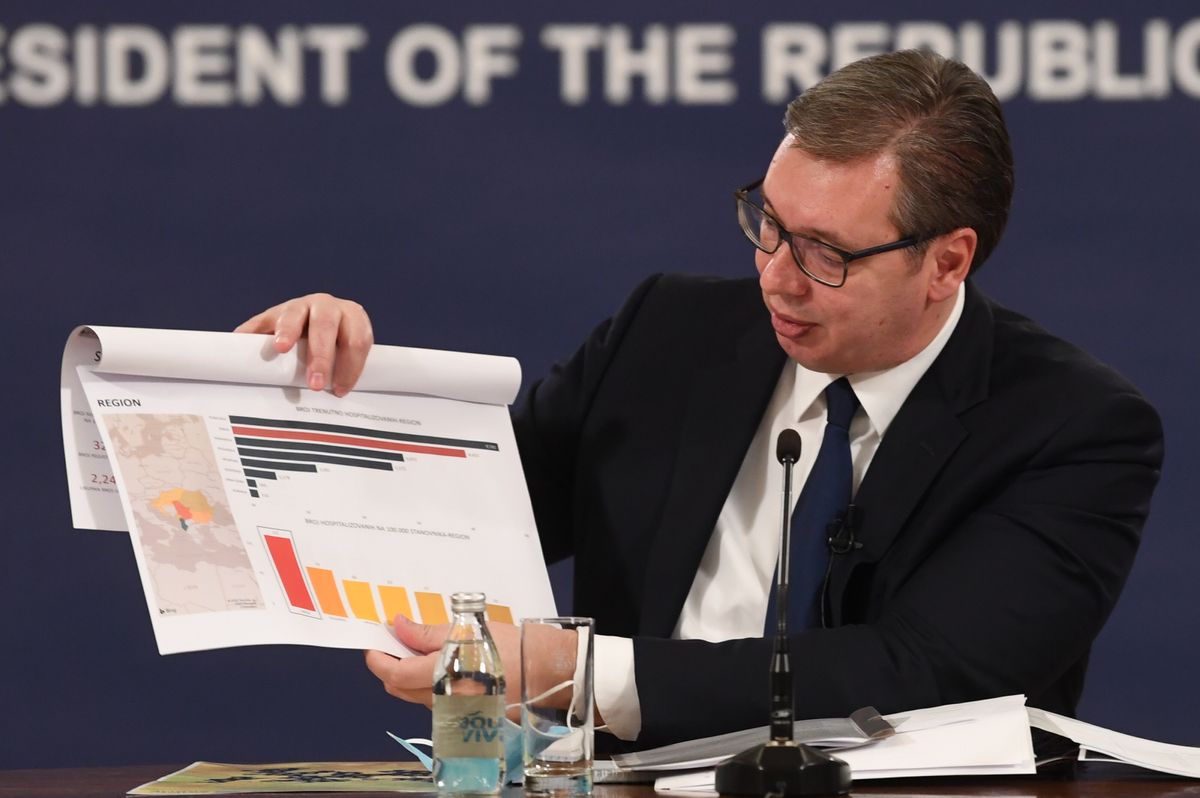
Preservation of peace, taking care of the health and better living standard are key for Serbia in 2021, underlined President of the Republic Aleksandar Vucic, convinced that even though the completion of this ambitious and by no means easy task will be anything but straightforward, best results can be achieved by working in concert with the Government, while ensuring security and a future of certainty for the citizens.
The President said that Serbia has set for itself great and ambitious goals for the next year, notwithstanding the complex international and regional circumstances, and that it will endeavour to fully preserve peace and stability in the region and the country, while safeguarding the vital national and state interests.
"Serbia will remain on the course of a winning policy - the policy of stability", President Vucic said and stressed that our country remains on the European integration path and that it will carefully foster its friendship with Russia and China, while building a friendship with the United States as well.
According to the President, Serbia will continue to pursue a winning policy, with the country itself as a top priority, i.e., a policy that will enable Serbia to continue being one of the top three countries in Europe in terms of growth rate in the next two years.
A precondition for that, the President noted, is to crack down on criminal groups, but also to ensure even bigger investments in the police and army forces.
"Serbia is the country that recorded the highest growth in Europe in 2020", the President pointed out at the annual press conference and added that he expects to conclude a new arrangement with the IMF, as well as that Serbia, by the end of next year or early 2022, will raise its credit rating to an "investment" one, which will put our country's rating on par with the most developed EU countries.
As the greatest success in 2020, Vucic noted that Serbia will end the year with the highest growth rate in Europe, which, as he said, is expected to be from minus 0.75 percent to minus one.
"I am proud to be the President of a country that is the European champion in terms of GDP", Vucic pointed out and added that German Chancellor Angela Merkel was also pleased with Serbia's success.
According to President Vucic, this result will encourage Serbia to accelerate its European path, while continuing friendships with those who did not turn their backs on Serbia when it was at its darkest hour, namely Russia and China.
The President pointed out that the activities to attract foreign investors will continue, then that work will be done on investments in agriculture, primarily the food industry, new machinery, and digitalization of agriculture.
President Vucic also emphasized that the goal is for salaries in the public sector to average between 560 and 570 euros by the end of the year. Only in Belgrade, the average salary would be around 700 euros.
President Vucic reminded that the salaries of health care workers will increase by five percent from January 1, while the salaries of others in the public sector will increase by 3.5 percent and an additional 1.5 percent as of April 1, while corporal, private first class and non-commissioned officer army ranks will get an increase of an additional 10 percent. He noted that the minimum wage will be increased by 6.6 percent and so will pensions from January 1, by 5.9 percent, with the plan that the average pension amounts to 270 euros by the end of 2021. The President especially pointed out investments in health care, reminding that two new covid hospitals have been opened and that the renovation and construction of health facilities continues throughout Serbia, while stressing that Serbia is by far the first in the region in terms of hospitalized persons per 100,000 citizens, which is why it has recorded a low mortality rate , and also that Serbia this year has been among the top three countries in the region according to the number of PCR tests performed.
Speaking about tourism, the President said that, next year, efforts will be made on the development of the Danube basin region, from Apatin to Kladovo, that the Ovcar-Kablar Gorge will be developed, as well as our mountain centers.
Discussing the field of culture and information, President Vucic said that the implementation of the media strategy and the completion of the reconstruction of the National Theater in Subotica are important for next year, and he announced investments in museums, especially emphasizing the relocation of the History Museum to the train station building. He also stated that the floor heating in the Church of Saint Sava will be completed next year.
He pointed out that the state will continue to take care of our citizens in Kosovo and Metohija, that no one can forbid Serbia to help its people, and that Serbia will not give up on helping our people.
As he emphasized, Serbia is ready to send medicines and vaccines to the Albanian population as well, and pointed out that in the upcoming period our country will pursue a policy of peace in the region and will endeavour to cooperate with Zagreb, Sarajevo, Podgorica and others (29 December 2020).
|
|
|
| Serbian Prime Minister the first PM in Europe to receive a Covid-19 vaccine |
|
Prime Minister of the Republic of Serbia Ana Brnabic received today the first vaccine against the coronavirus made by Pfizer company, at the Torlak Institute of Virology, Vaccines and Sera.
Brnabic, who is the first European Prime Minister to receive the vaccine, pointed out that this day may be the first since 6 March that we have a reason for a smile on our faces as it marks the beginning of the end of the coronavirus pandemic in Serbia, but also in Europe and the world.
As Prime Minister and as someone who leads the COVID-19 Crisis Response Team, I felt obliged to be the first to receive the vaccine, to show that we believe in it, as well as in our institutions - the Medicines and Medical Devices Agency of Serbia and experts who worked round the clock to test the vaccine, she said.
Underlining that it was an honour to do this for her country and be the first to pave the way for all citizens, the Prime Minister said that she agreed with President of the Republic Aleksandar Vucic that the two of them receive different vaccines, so he will most likely receive the next one that arrives, most probably the one produced by China.
At the moment we have the Pfizer-BioNTech consortium vaccine, and the vaccines from the Chinese Sinopharm are expected in the near future, as well as certain quantities of the Russian vaccine Sputnik V.
She expressed her belief that at the end of the first quarter or the beginning of the second quarter of next year we will have the vaccine of the company AstraZeneca, and after that the vaccine manufactured by Moderna.
As we promised, all vaccines licensed in their countries and approved by relevant international agencies will be available to our citizens, and of course they will be tested by all of our agencies and institutes as well, the Prime Minister pointed out.
She said that prior to the vaccination of health care workers, Minister of Health Zlatibor Loncar will also receive a vaccine shot as we endeavour to serve as an example and show how confident we are in the vaccines and institutions.
Brnabic pointed out that Serbia, not counting Great Britain, is the first country in Europe to receive the Pfizer-BioNTech vaccine, and the third to start a mass immunization and campaign for giving the vaccine - after Great Britain and Switzerland.
We achieved something very important and we will not stop even for a moment until the immunization of the population is completed, the Prime Minister said.
She specified that our country will receive another 16,000 doses of Pfizer-BioNTech vaccine in January, as well as that together with other vaccines we will have a total of one million doses in January, and a total of approximately two million doses during the first quarter of next year.
There is a dynamic on which Pfizer delivers vaccines and it varies depending on the production, and this is the case with deliveries to both Serbia and all other countries worldwide. We expected to receive 10,000 doses from Pfizer-BioNTech in December, however 4,807 doses arrived, the Prime Minister explained.
Serbia demonstrated that it is able to fight and succeed if we all work as a team, Brnabic said and called on all not to see the beginning of vaccination as the end of the fight already, but to continue to apply all measures instead.
This is to be certain and to be able to help our health care workers, and once the immunity is acquired we will be able to slowly start taking off the masks in 2021, but until then we should not see this as a victory but as the beginning of the end, the Prime Minister concluded.
After the Prime Minister, vaccine shots were also administered to the Minister of Labour, Employment, Veteran and Social Affairs and a member of the COVID-19 Crisis Response Team Darija Kisic Tepavcevic and to Predrag Kon who is also on the COVID-19 Crisis Response Team.
Furthermore, vaccine shots were also given to Head of the MMA Department for the Prevention and Control of Nosocomial Infections prof. Dr. Vesna Suljagic and academician Predrag Pesko, professor of Belgrade and Heidelberg universities and full member of the Serbian Academy of Sciences and Arts.
The first quantities of the vaccine arrived in Serbia on 22 December, and today they will be administered to patrons of nursing homes in Belgrade and Novi Sad.
Serbia is the first country in the region to receive a shipment of Pfizer-BioNTech vaccine.
In addition to procuring the vaccine among the first countries in the world, even before EU countries, Serbia is one of the rare countries that managed to build and open two covid hospitals in record time. The hospitals with 930 beds in Batajnica and 500 beds in Krusevac are a major contribution to the expansion of capacities and strengthening the health care system in the fight against coronavirus and, as President Vucic said, represent a monument of the future, that will talk about the accomplishments the state made in a short time.
Also, we recall that investments in health infrastructure have been large in Serbia, and since 2016, 80 health centers and clinics have been renovated, and works are underway on six large health centers. This way more than EUR 200 million was invested in the reconstruction, construction and equipping of hospitals and more than 300 million in the renovation of clinics and specialized hospitals, and many have already been completed, such as the University Children's Hospital Tiršova, and KBC Zemun nad KBC "Dragiša Mišović" hospitals.
The absolute priority of the Serbian Government is the successful completion of health infrastructure projects that are underway, but great attention is also paid to health workers,
whose salaries have, by 2020, been increased by 56.8% for specialist doctors, and 66.9% for
nurses, while significant funding is invested in the education of health professionals, as well as in equipment and working conditions.
Like other countries, Serbia has faced great challenges this year, most notably health challenges, and all factors in the state were focused on preventing the spread of the virus and safeguarding the lives and health of citizens. Serbia has faced these challenges better than many wealthier and more developed countries in Europe and the world.
Belgrade,
24 December 2020 |
|
|
| STATEMENT BY THE MINISTRY OF FOREIGN AFFAIRS |
|
 On the occasion of Human Rights Day, 10 December, the Ministry of Foreign Affairs of the Republic of Serbia once again expresses its commitment to the achievements and values of the Universal Declaration of Human Rights, which was adopted on this day in 1948. On the occasion of Human Rights Day, 10 December, the Ministry of Foreign Affairs of the Republic of Serbia once again expresses its commitment to the achievements and values of the Universal Declaration of Human Rights, which was adopted on this day in 1948.
The principles of the Universal Declaration of Human Rights were the basis for building international law in this area, as well as the international system of promotion and protection of human rights, as a unique civilizational heritage of modern times. Our obligation today is to preserve and strengthen the international system for respect for human rights, the development of human rights standards, control over the fulfillment of commitments, as well as the continuation of cooperation with international and regional institutions for the protection of human rights.
Serbia is fully committed to the universal values of human rights and the implementation in practice of international human rights instruments. Our continued cooperation with the instruments of the Human Rights Council within the United Nations, as well as with the Council of Europe and the OSCE human dimension mechanisms, is an important part of the activities of all state bodies and illustrates our consistent commitment to meeting international human rights standards.
International Human Rights Day is an occasion to once again point out the disenfranchisement of the Serb and other non-Albanian populations in Kosovo and Metohija and reiterate the call to the international community to respect guaranteed international human rights norms and contribute to creating conditions for the return of internally displaced persons, as well as return of their usurped property.
|
|
|
| Visit of the President of the Democratic Republic of Congo |
|
25.10.2019. - President of the Republic of Serbia Aleksandar Vučić organised today a ceremonial welcome for the President of the Democratic Republic of Congo Félix Antoine Tshisekedi Tshilombo, who is staying on the official visit to Belgrade.
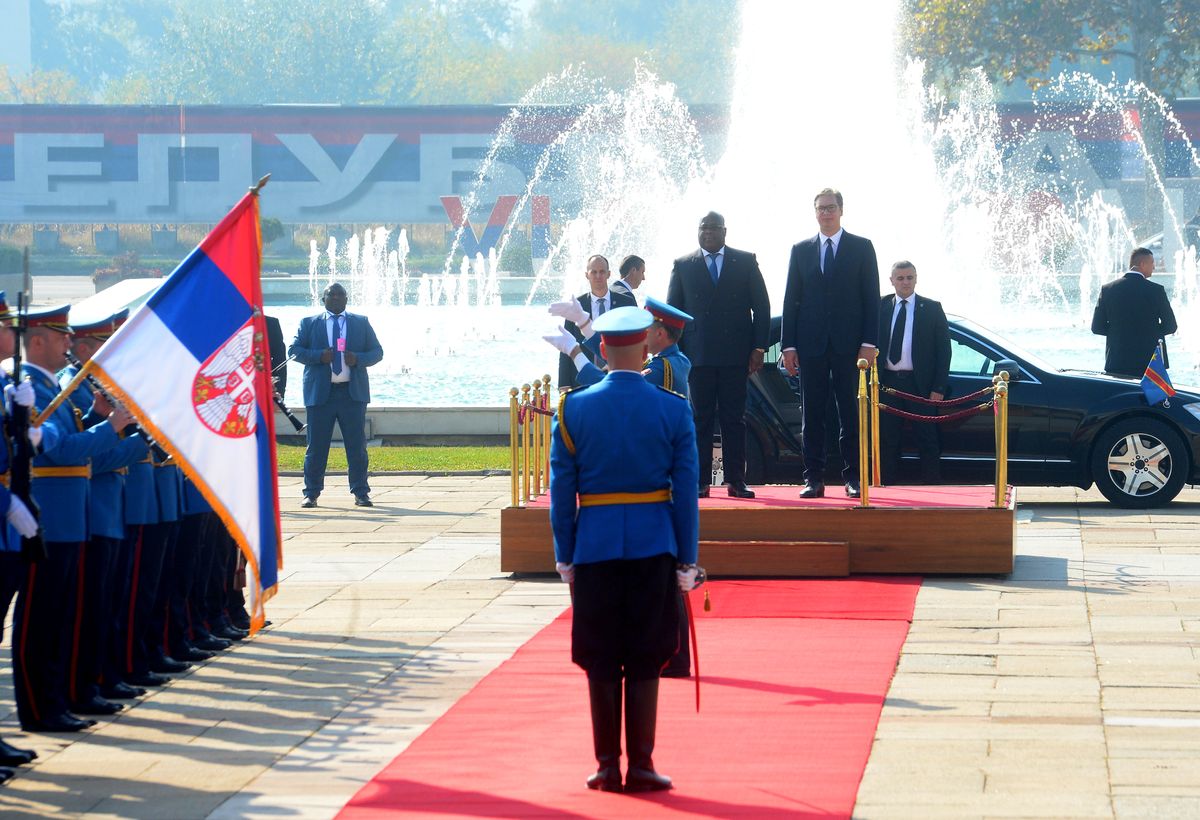
|
|
|
| Pourquoi le Kosovo est-il inéligible à l’UNESCO ? |
|
• Parce que la demande de son adhésion représente une violation grave du droit international, de l’Acte constitutif de l’UNESCO, de la Résolution 1244 (1999) du Conseil de sécurité des Nations unies, juridiquement contraignante, ainsi que de la Charte de l’ONU, dont l’article 25 stipule que « Les Membres de l'Organisation [des Nations Unies, NDT] conviennent d'accepter et d'appliquer les décisions du Conseil de sécurité conformément à la présente Charte. » |
|
|
|
|
|